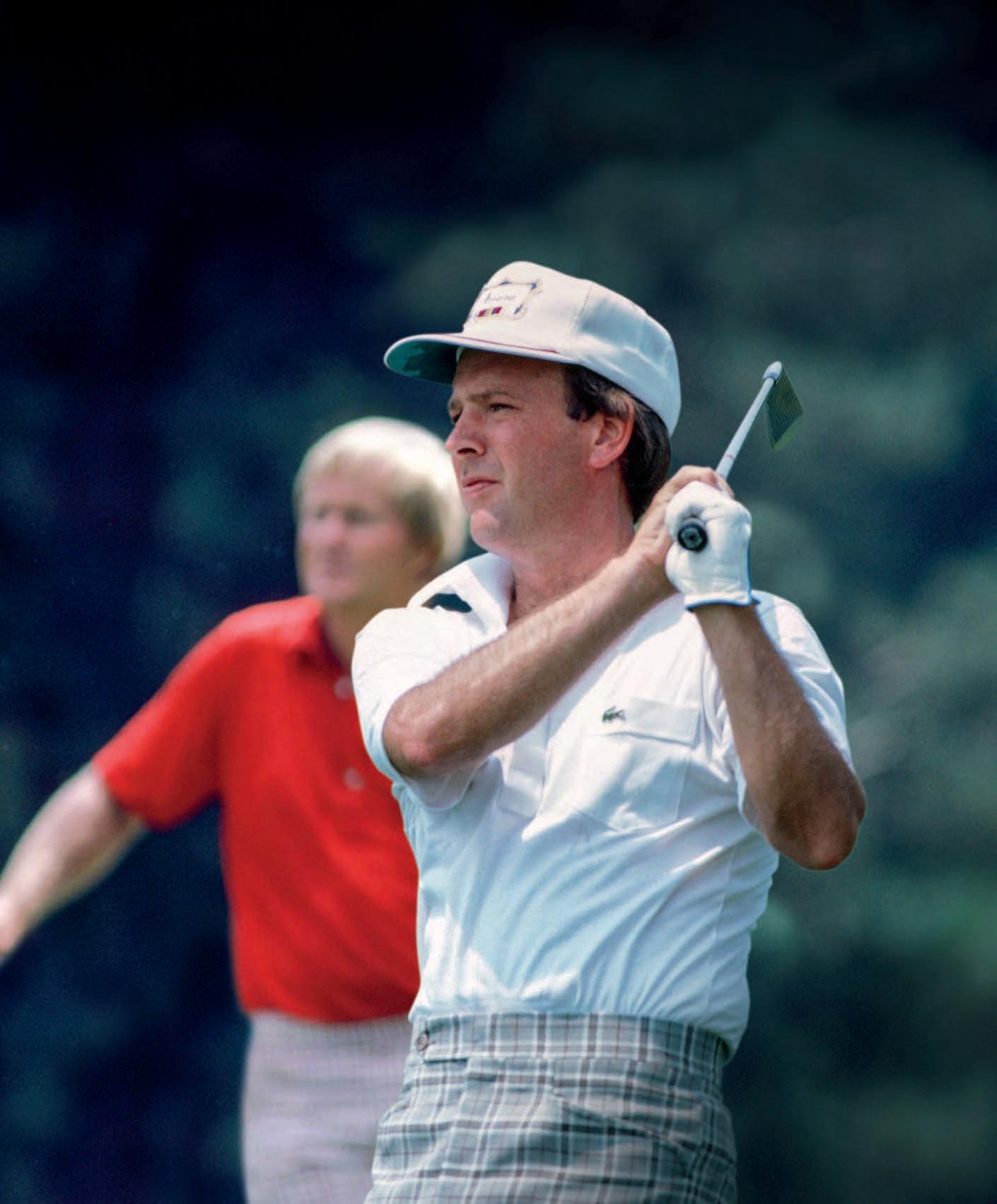











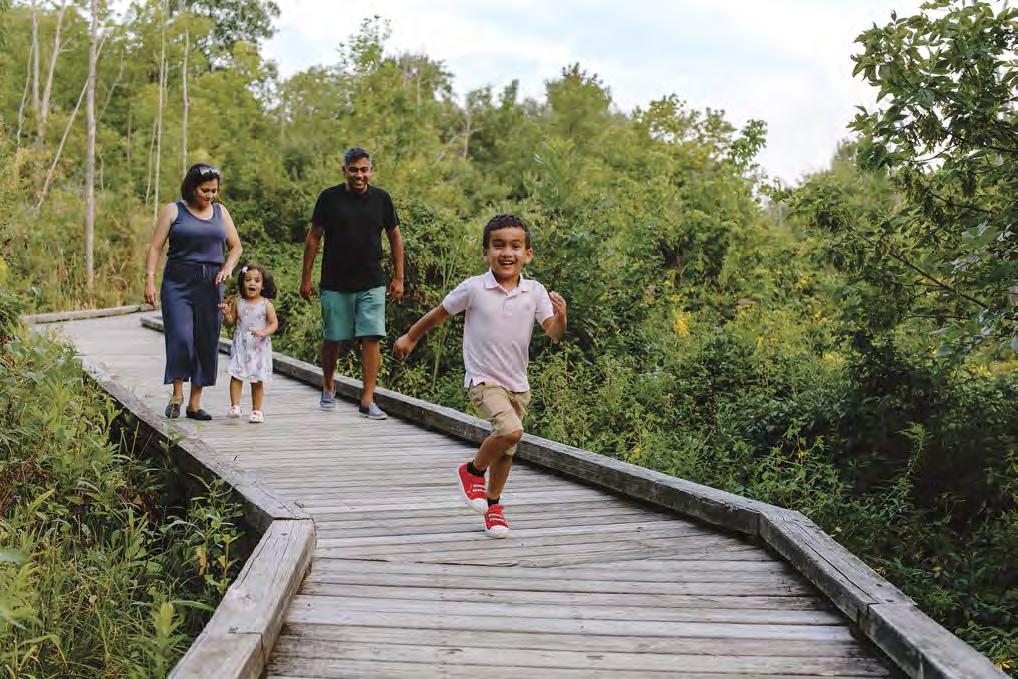

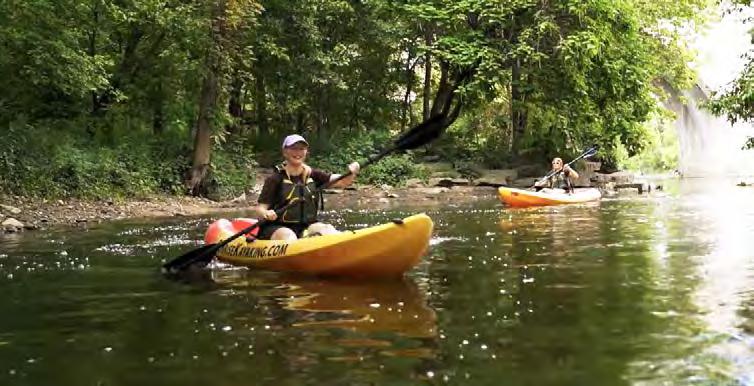
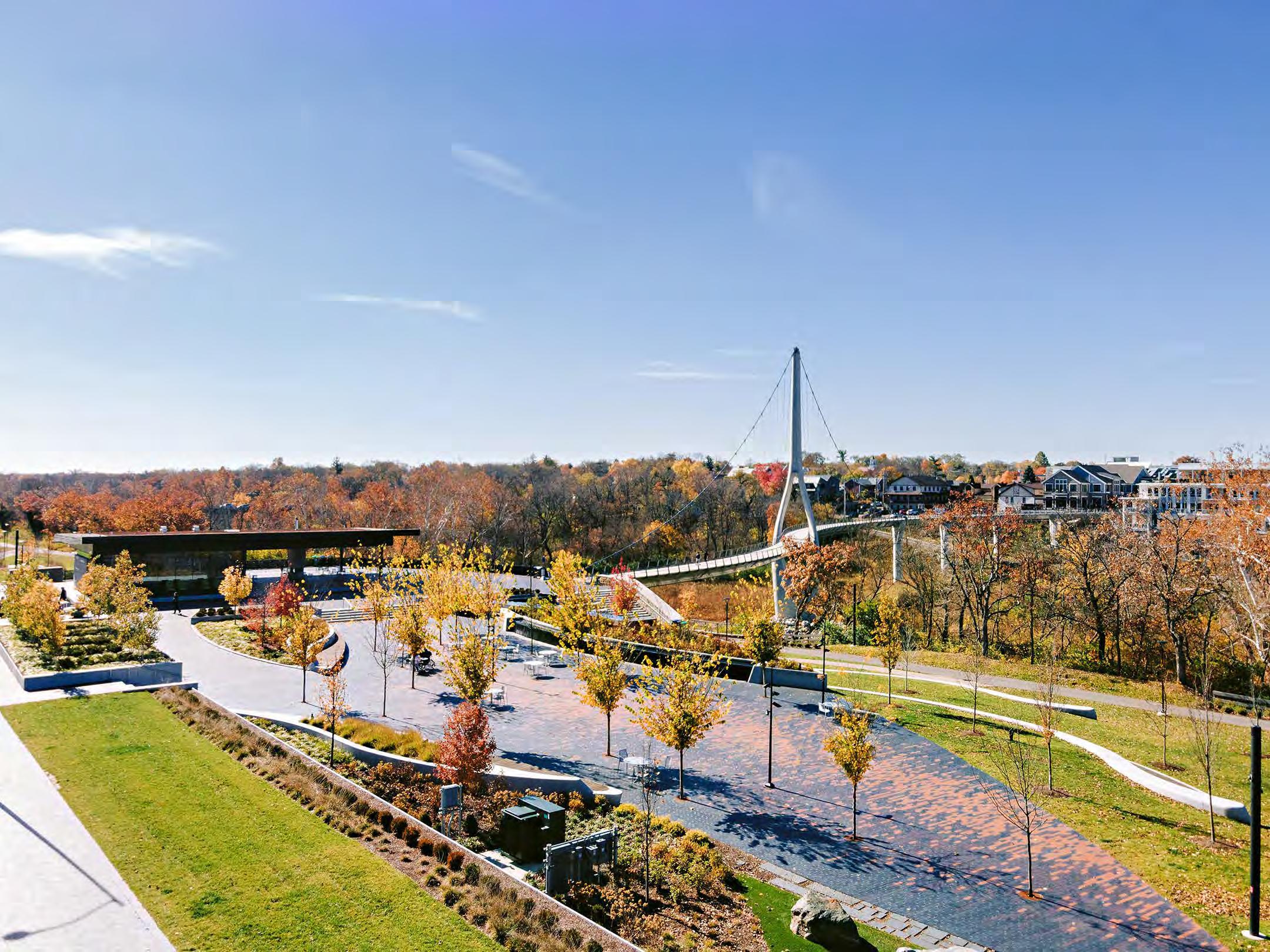


26
LIVING HER FULLEST LIFE
BY BOB BAPTISTThanks to the care of doctors and nurses at Nationwide Children’s Hospital, Kinley Johnson has overcome daunting medical odds
42 GOLF’S ORIGINAL INVISIBLE MAN
BY GARY VAN SICKLESoft-spoken Larry Nelson has had a remarkable career, especially considering that he didn’t play his first round of golf until he was 22 years old
72
FINDING HIS NICHE
BY BOB BAPTISTStraight-shooting Scotsman John Huggan, recipient of the 2023 Memorial Golf Journalism Award, went from being a fine young player to an accomplished writer
78
FAMILY AFFAIR
BY SCOTT TOLLEYFor the first time in his PGA TOUR career, Billy Horschel won with his wife and children in attendance when he captured the 2022 Memorial Tournament presented by Workday
86
FINDING HIS FOOTING
BY ADAM SCHUPAKAfter a stellar college career, Billy Horschel got off to a slow start on the PGA TOUR, but he has now started to live up to his early promise
98
CAPTAIN MY CAPTAIN
BY DAVID SHEDLOSKIPopular among fellow players and fans alike, Fred Couples won the 1998 Memorial Tournament and returned to Muirfield Village Golf Club to captain the victorious 2013 U.S. Presidents Cup team
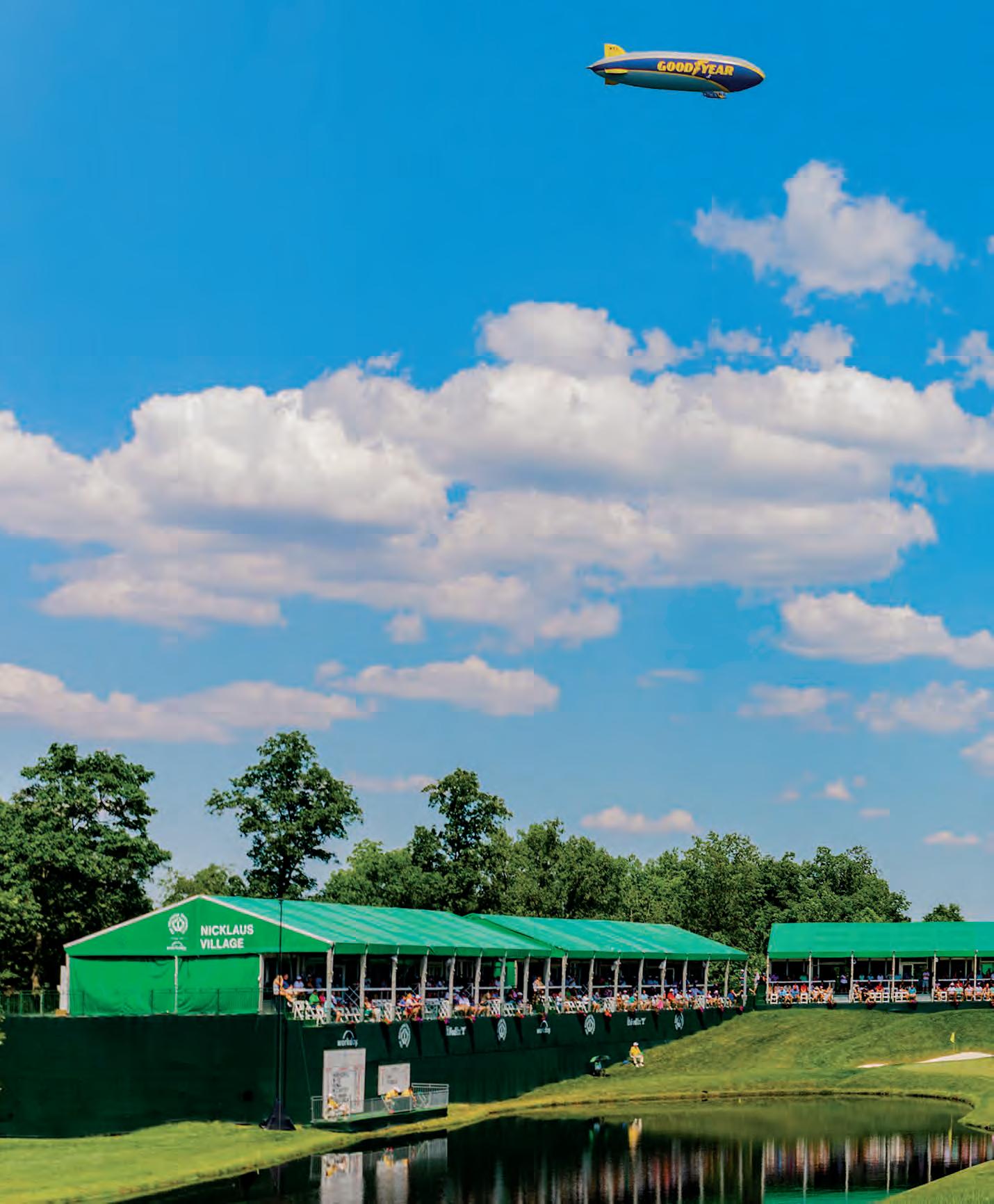 ON
ON
106 MUIRFIELD VILLAGE GOLF CLUB HOLE-BY-HOLE
HOLE DESCRIPTIONS BY JACK NICKLAUS
The Memorial Founder and Host highlights key changes to his prized golf course and reviews strategy of each hole
144 WHEN THE CUP TURNED HOT
BY BOB DENNEYForty years ago, the rivalry between the U.S. and Europe in the Ryder Cup truly heated up when the American team, captained by Jack Nicklaus, eked out a one-point victory
160 FLAWLESS EXECUTION
BY ALEX MICELI
PGA TOUR players recall that one shot that was as close to perfect as they could get
172 THE GREATEST COLLEGE GOLF TEAM EVER BY DAVID SHEDLOSKI
A hard-luck coach at a little-known Georgia school assembled a potential juggernaut, but instead of winning a title, it delivered more heartache
8 COMMITTEES & STAFF
10 THE WEEK’S EVENTS/ THE MEMORIAL ON TV
14
THE MEMORIAL TOURNAMENT: THERE REALLY IS NO PLACE LIKE HOME

A message from Memorial Tournament Founder and Host Jack Nicklaus
CONTRIBUTING TO THE MEMORIAL’S RICH HISTORY
18
A message from Workday Co-Founder, Co-CEO and Chair Aneel Bhusri
CELEBRATING MEMORIAL’S DEDICATED VOLUNTEERS
22
34
A message from General Chairman Jack Nicklaus II
SALUTE TO SERVICE
The Memorial honors our U.S. military, veterans and first responders
38 THE CAPTAINS CLUB
68 THE MEMORIAL TOURNAMENT HONOREES
70 THE MEMORIAL CLUB
Securing the Tournament’s future
186 PAST WINNERS
188 REFLECTIONS

At the Gordon Flesch Company our goal is simple: help your business run smoothly with technology that works. We analyze business processes and provide tailored equipment and technology solutions to meet your company’s exact needs. Our unparalleled service keeps offices up and running— and ready to achieve their goals.
Perhaps most important, we do business locally. In fact, all of our personnel , from analysts to technicians , live and work in the communities they serve. We offer broad, professional expertise with a personalized approach. gflesch.com | 800.333.5905

If you’re thinking about choosing renewable energy, AEP Energy offers environmentally-friendly options. Our ECO-Advantage® plans match up to 100% of your electricity usage with Green-e® Energy Certified Wind Renewable Energy Certificates (RECs). Choose green and get the fulfillment that comes with reducing your carbon footprint and supporting a cleaner environment. | AEPenergy.com
AEP Energy is a certified Competitive Retail Electric Service (CRES) provider. While it is an affiliate of AEP Ohio, AEP Energy is not soliciting on behalf of and is not an agent for AEP Ohio. AEP Ohio customers do not need to purchase any competitive retail electric service from AEP Energy to receive or to continue to receive non-competitive retail electric service from AEP Ohio.
ECO-Advantage is Green-e Energy certified and meets the environmental and consumer-protection standards set forth by the nonprofit Center for Resource Solutions. Learn more at www.green-e.org.
PRESIDENT STEVEN C. NICKLAUS GENERAL CHAIRMAN JACK W. NICKLAUS II
CAPTAINS CLUB
Paul Azinger • Judy Bell
Sir Michael Bonallack • O. Gordon Brewer, Jr.
Hale Irwin • Tony Jacklin
Ken Lindsay
Gary Player • Judy Rankin
Dawson
Tim Finchem
Trey Holland
Juli Inkster
Charles S. Mechem, Jr.
Fred S. Ridley
ADVISORY BOARD: Mollie Marcoux Samaan
Donald “Ric” Baird III
Todd Bork
Chris Campisi
Rich Aldridge • Sheriff Dallas Baldwin
Johann Rupert
Jay Monahan
Barbara Nicklaus
Andy North
Carol Semple Thompson
Sellers Shy
VICE CHAIRS
John Ciotola
Paul Heller
Seth Waugh
Jeff Logan
CHAIRS, DIRECTORS AND ADVISORS
Chief Russ Baron
Joann Bigler
Jeff Bordner
Hisamitsu Ohnishi
Tom Watson
Michael Whan
Daniel Maher
David Brooks
Nate Miles
Dayna Payne
Eric Caudill
Ann Clark
Dave Clark
Lt. Erin Cullen
Jack Harper
Lt. Robert Currin
Major Carl Hickey
Tina Quinn
Tony D’Angelo
Chief Steve Hrytzik
Brett Febus
Annie Miles
Charles Ruma, Jr.
Rob Geis
Barb Miles
Chief Deputy Jim Gilbert
Tony Mollica
Jay Gray
Chris Hale Everett Hall
Barb Stieg
John Stieg
NATIONWIDE CHILDREN’S HOSPITAL COMMITTEE
CAPTAINS: Anne Bogenrief
COMMITTEE: Amy Andrews • Jennifer Bollinger
Lauretta Godbout
Courtney Grant
Nancy Minton
Dick Curtis
Beth Branstiter
Terri Heaphy
Angie Fallon
Lisa Colosimo
Susan Houser
Jessica Ossege • Meg Patten
Paula Ferguson
Amanda Coulter
Julie Seiple
Patty Dixon
Dee
Erin Vinci
English
Suzanne Jennings • Sarah Jones • Michele Joseph
Sandra Puskarcik • Keith Rittenhouse
Kelly Rogers
Marcy Williams
Beth Fitzgerald
Donna LeCrone
Michelle Scott
TOURNAMENT ADMINISTRATIVE STAFF
EXECUTIVE DIRECTOR DAN SULLIVAN
muirfield village golf club
Teri Slick
Shannon Ford
Allison Main
Jean Gans
Kimberly Miller
Tom Vinci • Sally Wood
PRESIDENT JACK W. NICKLAUS GENERAL CHAIRMAN JACK W. NICKLAUS II
CAPTAINS OF MUIRFIELD VILLAGE GOLF CLUB
Jack W. Nicklaus (1980-81) • Ivor H. Young (1981-82) • Robert S. Hoag (1982-83) • Pandel Savic (1983-84) • Jack Grout (1984-85)
• Edwin D. Dodd (1985-86)
John F. Havens (1986-87) • John H. McConnell (1987-88) • H.M. “Butch” O’Neill (1988-89) • James E. Nolan, Jr. (1989-90) • Fritz Schmidt (1990-91)
Richard F. Chapdelaine (1991-92) • Ken Bowden (1992-93) • James R. Fabyan (1993-94) • Dr. Russell L. Bowermaster (1994-95) • Barbara Nicklaus (1995-96)
Jack Hesler (1996-97) • David G. Sherman (1997-98) • Alphonse P. Cincione (1998-99) • David L. Barnes (1999-2000) • Dr. Robert J. Murphy (2000-01)
David J. Harris (2001-02) • Charles R. Carson (2002-03) • Kerry F.B. Packer (2003-04) • Richard R. Corna (2004-05) • Silas W. Thimmes (2005-06)
Charles S. Mechem, Jr. (2006-07) • Carol Young (2007-08) • Paul B. Long, Jr. (2008-09) • John G. Hines (2009-10) • George McCloy, Sr. (2010-11)
Phil Campisi (2011-12) • Frank Bork (2012-13) • L. Jack Ruscilli (2013-14) • Jeff Logan (2014-15) • Tom Welker (2015-16) • Dr. John R. Evans (2016-17)
Dr. William E. Sloan (2017-18) • Scotty B. Patrick (2018-19) • David P. Lauer (2019-20)
DEPARTMENT




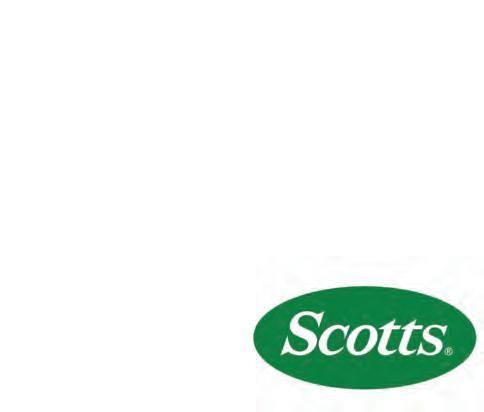
Monday, May 29 Practice Rounds
Tuesday, May 30 Practice Rounds
Wednesday, May 31 Practice Rounds
Salute to Service Day
Honoring Military Members, Veterans and First Responders
Workday Golden Bear Pro-Am – 6:50 a.m.
Memorial Honoree Ceremony – Practice Range – 2 p.m.
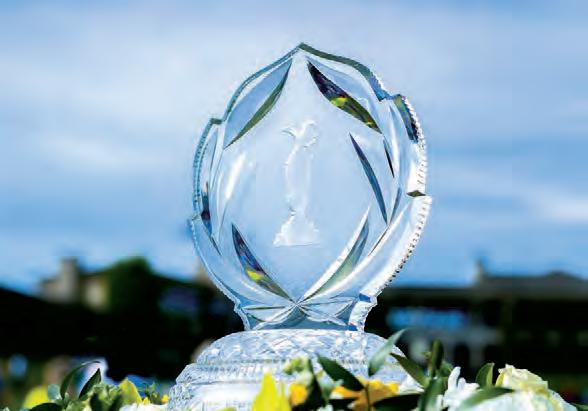
Tournament Honoree: Larry Nelson
Memorial Golf Journalism Award: John Huggan
Thursday, June 1 First Round
Friday, June 2 Second Round
Saturday, June 3 Third Round
Sunday, June 4 Final Round
Play Yellow Sunday
Wear yellow to support Play Yellow and Nationwide Children’s Hospital
Trophy presentation following play, 18th green
THURS., JUNE 1 — Golf Channel, 2-6 p.m.; replays, 7-11 p.m., midnight-4 a.m.
FRI., JUNE 2 — Golf Channel, 2-6 p.m.; replay, 9 p.m.-1 a.m.
SAT., JUNE 3 — Golf Channel, 12:30-2:30 p.m.; CBS Sports, 2:30-6 p.m.; Golf Channel replays, 9 p.m.-1 a.m., 3-7 a.m.
SUN., JUNE 4 — Special, CBS Sports, 12:30 p.m.; Golf Channel, 12:30-2:30 p.m.; CBS Sports, 2:30-6 p.m.; Golf Channel replays, 8:30 p.m.-12:30 a.m., 2:30-6 a.m.
MON., JUNE 5 — Golf Channel replay, 2-5 p.m. NOTE: ALL TIMES SUBJECT TO CHANGE
EDITORIAL DIRECTOR
David Shedloski
CREATIVE & PRODUCTION DIRECTOR
Larry Hasak
ART DIRECTOR
Matt Ellis
ASSOCIATE EDITOR
Debbie Falcone
CONTRIBUTING EDITOR
Scott Tolley
PRODUCTION MANAGER
Melody Manolakis
CONTRIBUTING WRITERS
Bob Baptist • Bob Denney • Alex Miceli
Dan O’Neill • Adam Schupak
David Shedloski • Scott Tolley
Gary Van Sickle
PHOTOGRAPHY
Alamy • AP Images
Getty Images • Jim Mandeville the Memorial Tournament Archive
Nelson Family Archive
PGA TOUR Images • David Shedloski
USGA
HONOREE PORTRAITS
Glenn Harrington
Ron Ramsey • Anthony Ravielli
PUBLISHED BY
6085 MEMORIAL DRIVE, SUITE 300 DUBLIN, OHIO 43017 • 614-764-4653 HNSSPORTS.COM
PRESIDENT/PUBLISHER
Dan Sullivan
ADVERTISING SALES
MacKenzie Edgar • Paul Howard
Walt Shuler • Dan Sullivan
MAGAZINE PRODUCTION
Heather Ditty • Kristina Khalili
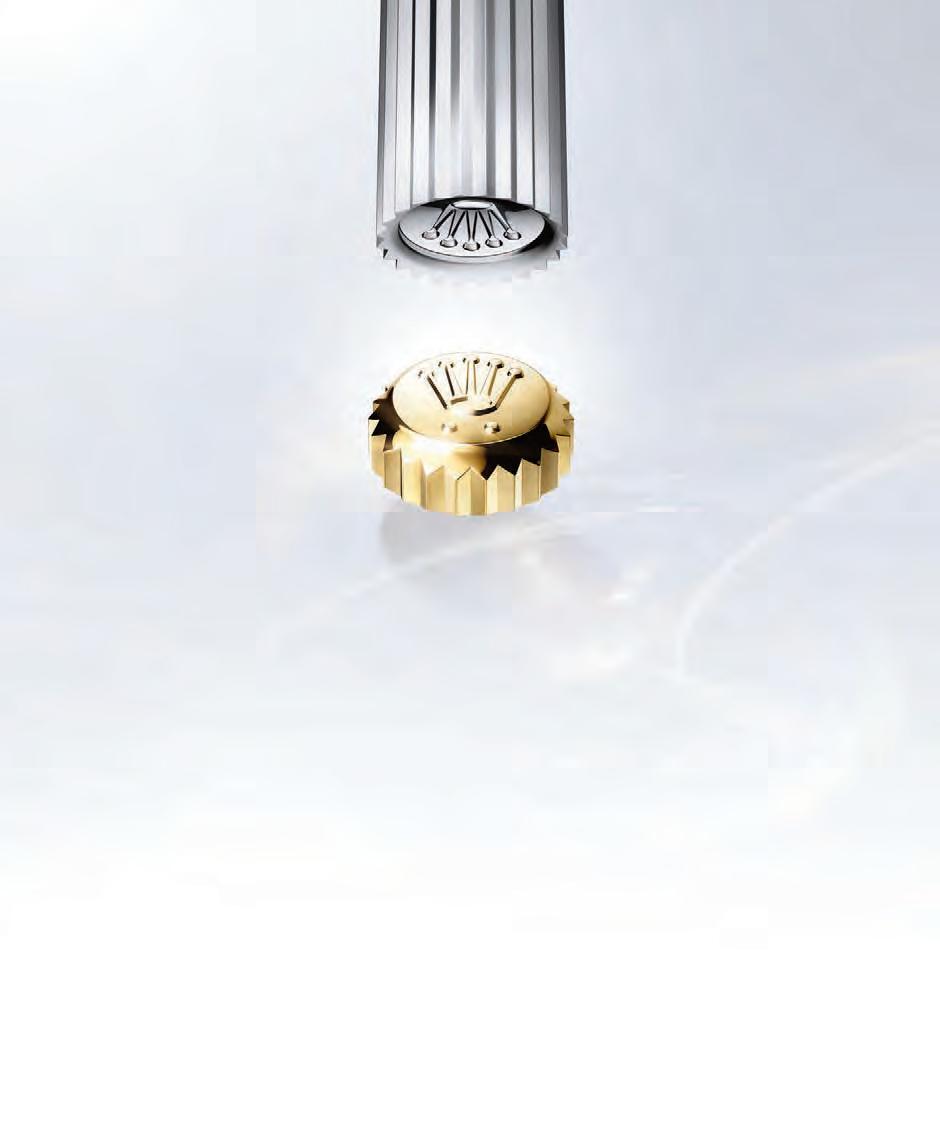


There’s more than one way to define electric. For Lexus, it’s a feeling. From hybrids, to plug-in hybrids, to our first battery-electric, the RZ. More than the tech. It’s about the way you’re treated. When you drive it. And when you own it. That’s what makes Lexus truly electrifying.
Official Vehicle of the Memorial Tournament presented by Workday
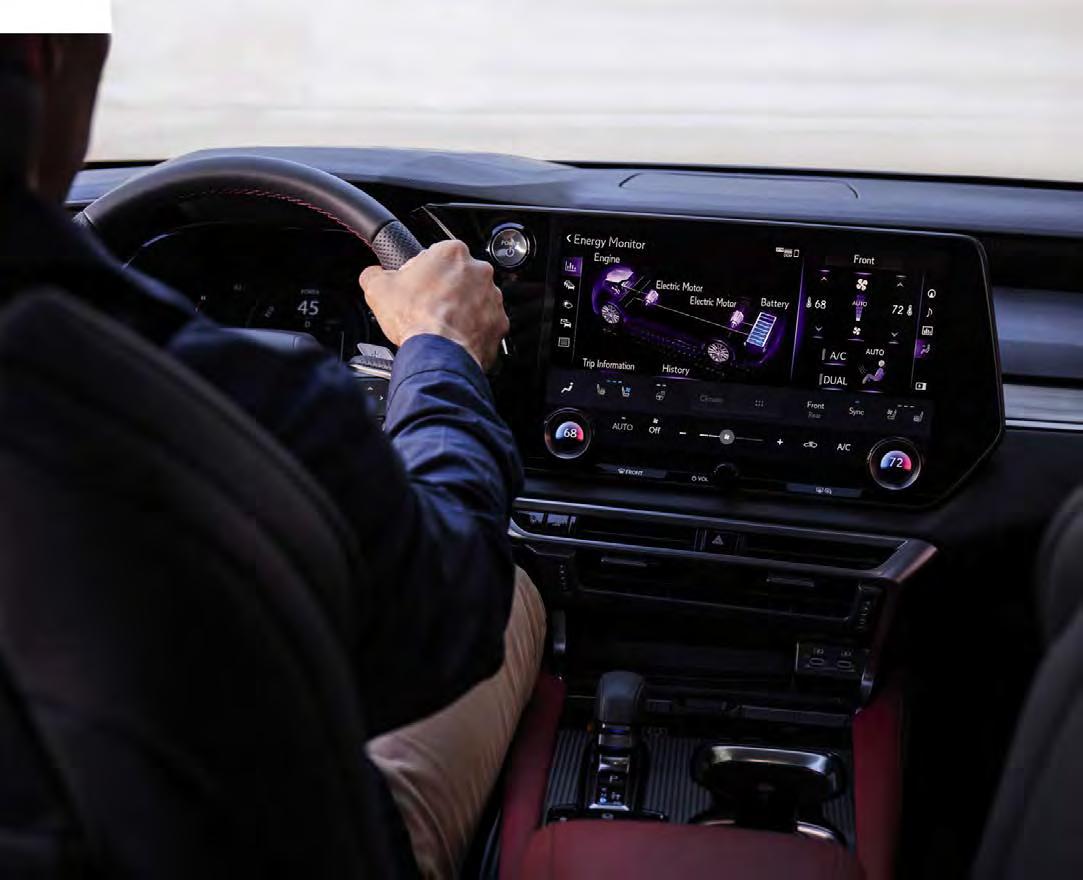
GARY PLAYER is among my closest friends in the game of golf. There are countless character traits I admire in Gary, not the least of which is his rare ability to captivate a crowd with his enthusiasm, his way with words, and his uncanny memory for quips and quotes to deliver at the ideal time. Two months ago at the 87th Masters Tournament, Gary and I, along with Tom Watson, shared the dais of the Media Center, when Gary said something that stuck with me. In a very softspoken manner, Gary uttered the words of Winston Churchill:
“Change is the price of survival.”
We are certainly in a very interesting time in the history of our game—one of great change. I have never been one to resist change, which is why through the years I have sought to make modifications to Muirfield Village Golf Club and the Memorial Tournament to better showcase the greatest game of all to our fans in Central Ohio and around the world. That said, I think we all can agree that sometimes we also need constants in our lives—a steadying influence that we can count on year in and year out. That is what I love about hosting the Memorial Tournament presented by Workday.
Returning each year to celebrate my Central Ohio roots. Slipping on that gray jacket and gathering with the members of the Captains Club. Shaking the hands of the best players in the world in the locker room or coming off the 18th. And starting the week swearing off milkshakes, only to see that resolution broken by Wednesday.
It just all feels right, because the Memorial Tournament presented by Workday will always be home for me.
The PGA TOUR will be a part of my legacy and the creation of the Memorial Tournament in 1976 is a big reason. But while my original goal was to bring the best in golf to my Central Ohio hometown, what we likely didn’t envision is that this event would become an enormous vehicle for impacting lives—especially
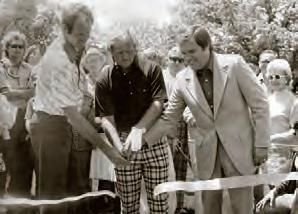
those of children and families in need. Since day one, Nationwide Children’s Hospital has been the beneficiary of the Memorial, and the support for this mission has been outstanding.
As we tee up the 48th playing of the Memorial Tournament, we are proud that the Tournament has donated more than $46 million to charity, with nearly $32 million going to Nationwide Children’s Hospital.
Last year, we raised a record $4.9 million for charitable organizations in Central Ohio and beyond, including $4.151 million for the Memorial ’s collaborating charitable partners, Nationwide Children’s Hospital, Stephen and Ayesha Curry’s Eat. Learn. Play. Foundation, and the Nicklaus Children’s Health Care Foundation. It is the first time the Memorial topped the $4 million mark in charitable giving.
This is just another example of how important and impactful charity is to the game of golf. One of my favorite statistics is that the game raises about $4 billion a year for charities—more than all the other professional sports combined. The PGA TOUR by itself is nearing the $3.5 billion mark.
For Barbara and me, it’s been life-changing and a passion for us in the last several decades. Of course, it wouldn’t have happened if I hadn’t made a few 4-foot putts along the way.
As I think back to the start of the Memorial and the opening of Muirfield Village two years earlier, I can’t help but say a few words about fellow Ohio State University golfer Tom Weiskopf, who died last August at the age of 79 after a courageous battle against pancreatic cancer.
Tom and I didn’t play for the Buckeyes at the same time. But we competed against each other in countless PGA TOUR events, and we became a good friends, so much so that when we officially opened Muirfield Village on May 27, 1974, Tom joined me for the ceremonial first round. Tom was one heck of a player, one of the four or five most talented players I’ve ever seen. He won 16 times, including the 1973 Open at Troon, and his keen golf mind enabled him to excel as a course designer and broadcaster. Please join me in appreciation of Tom and his legacy.
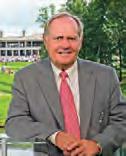
While Tom was earning All-American honors in 1962 in his lone season at Ohio State, I was just getting started as a 22-yearold professional tour player. Our 2023 Memorial Tournament Honoree Larry Nelson didn’t even start playing the game until he was 22!
Larry grew up much like I did, playing many sports, though golf was nowhere on his radar. At 19 years old, I was blessed to be playing golf around the world—from the Walker Cup at Muirfield in Scotland to my first Masters Tournament, to winning my first U.S. Amateur title on September 19, 1959. Almost to the day in September 1968, and 10 days after Larry’s 19th birthday, he received a draft notice. Another 10 days later, he reported to the Army and eventually found himself in Vietnam, serving our country.
But during basic training, when Larry was talking to a friend, Ken Hummel, golf entered the picture. Larry asked Ken what he was going to do after his service ended, and Hummel said he was going to play golf every day that he could. After being discharged from the Army in late 1969, Larry received a set of golf clubs from his wife Gayle for Christmas. Wouldn’t you know, they were Jack Nicklaus signature clubs.
He broke 100 in his first 18 holes in the spring of 1970 and broke 70 within nine months.
Less than nine years later, Larry won the 1979 Jackie GleasonInverrary Classic for the first of his 10 PGA TOUR victories. He would win another 19 on the PGA TOUR Champions. In between, Larry won three major championships, including two PGA Championship titles (1981 and ’87) and the 1983 U.S. Open at Oakmont Country Club. It’s a place I know well, as I won my first major there. Oakmont is considered one of the harder championship venues and has produced champions like Gene Sarazen, Bob Jones, Ben Hogan, Sam Snead, Johnny Miller, Ernie Els and, most recently, Dustin Johnson.
It’s a stern test, and all Larry did was shoot 65-67 over the final two rounds, breaking a record Sarazen held for 51 years, to beat Tom Watson, another great friend, by one stroke.
Toss in the fact that Larry was 5-0 as a Ryder Cup rookie in 1979, and then 4-0 in 1981 on a team that arguably was the strongest in Ryder Cup history, and I think it is fair to say that Larry Nelson is one of the most underrated players in our game’s history. We are honored and delighted to celebrate Larry and pay
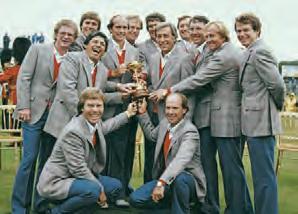
tribute to his great career and a story only a Hollywood script writer could craft.
Or, perhaps, one written by a Scotsman from a small “village near the North Sea, who turned his love and talent for the game into one of the more celebrated writing careers in the sport. John Huggan is our 2023 Memorial Golf Journalism Award recipient. An accomplished amateur golfer, John represented Scotland, as well as Great Britain and Ireland in his youth and as a teenager won the Scottish Boys’ title as well as Scotland’s Universities Championship.
In 1986—a good year for many reasons!—John opted to pursue a different career in the game and wrote as many as 50 job letters to companies that had a connection to golf. Without a lick of journalism training, John interviewed with Golf World UK magazine and became instruction editor. By 1988, John was instruction editor for Golf Digest. He returned to his Scotland home eight years later and has continued to write about the game that captivated him as a boy. This week, we thank John for being such a good steward of our game.
Another terrific steward of golf is our presenting sponsor Workday, led by my good friend Aneel Bhusri. This will be Workday’s second year as presenting sponsor, and in a short timeframe, Aneel and his team have shown unwavering commitment to the Memorial and to showcasing the finest players in the world and on—my biases aside—one of its grandest stages, Muirfield Village Golf Club.
Hopefully you can indulge me being a bit partial. After all, it’s home and it just feels right.
Good golfing,





AS WE ENTER OUR SECOND YEAR as the presenting sponsor of the Memorial Tournament, Workday is honored to welcome the world’s best golfers to Muirfield Village Golf Club and to once again partner with Jack and Barbara Nicklaus to extend the Memorial’s rich history in supporting charitable causes.
At Workday, a leader in enterprise cloud applications for finance and human resources, we are committed to purpose-driven leadership while working with organizations that create meaningful impact in the communities in which we live and work.
As a result, we are thrilled to once again support Stephen and Ayesha Curry’s Oakland, California-based Eat. Learn. Play. Foundation (ELP) and Central Ohio’s Nationwide Children’s Hospital (NCH)—two organizations that are driving incredible impact through their shared focus on improving the health and well-being of children and their families.
Workday has closely partnered with ELP since it was founded in 2019, and during that time the organization has made an immense impact on the lives of tens of thousands of youths in the Oakland community. Additionally, in the last year, NCH has delved further into their groundbreaking work to develop preeminent clinical and research programs to create the best outcomes for children everywhere.
Furthermore, Workday is proud to expand our outreach this year to the incredible veterans in our workforce and the local communities. In addition to the Memorial’s yearly Military Outpost and pro-am brunch, Workday— in partnership with the Memorial Tournament—is dedicating its 18th green hospitality suite to host Gold Star families to help us honor the memory of individuals living and deceased who have distinguished themselves in service.
Workday is excited to be back in Columbus supporting the local community and growing our partnerships in the area. We look forward to welcoming fans to this prestigious venue for an amazing week on and off the course, and we hope that you enjoy the Tournament!
ANEEL BHUSRI Co-Founder, Co-CEO and Chair Workday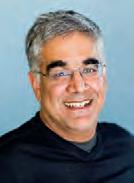

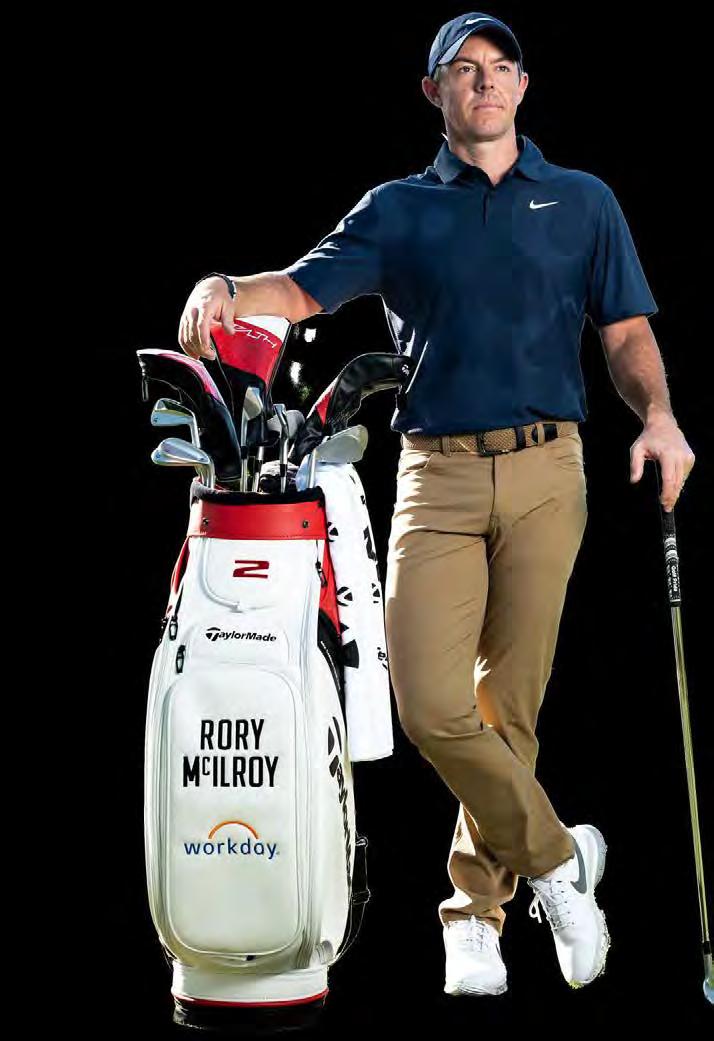


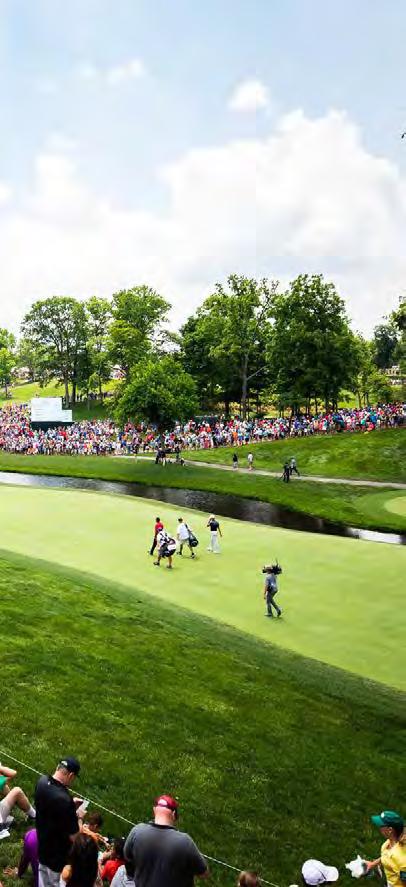




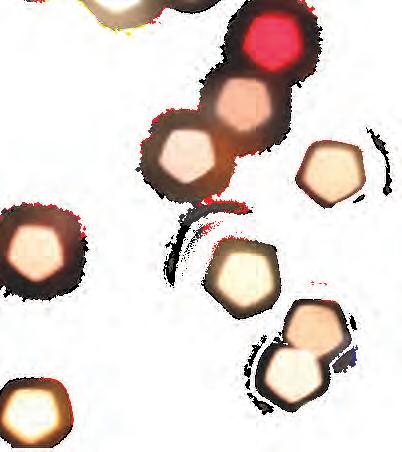

LONG AFTER the final putt drops on the 18th green here at Muirfield Village Golf Club and my father shakes the hand of the winner of the Memorial Tournament presented by Workday, and well beyond when that winner lifts the crystal trophy, there is still work to be done. Also a little celebrating.
One of our family’s favorite gatherings after each edition of the Memorial Tournament is when we accompany the winner to meet dozens of our dedicated volunteers. The winner always graciously thanks them, but just as important, my parents and I get a chance to express our deepest appreciation.
For the better part of 30 years, two of those volunteers, Anne Bogenrief and Patty Dixon, have been right there in the midst—lifting a glass and with it, everyone’s spirits.
As we excitedly head into the 48th playing of the Memorial Tournament, Patty charges into her 30th and, sadly, final year of volunteering. Patty co-chairs the sandwich factory and absolutely loves it. She loves the people she works with, the patrons who make her job so necessary, and she even loves the process behind feeding the masses. Instead of detailing the exhaustive work last year that went into making almost 54,000 sandwiches (to be exact, it was a record 53,891), Patty called it her proudest accomplishment.
“The beautiful weather brought out some hungry patrons [last] year,” she said.
Anne’s story casts a spotlight on why the Memorial Tournament exists and why we can never overlook its impact — not just in the world of golf, but also on the many charities in Central Ohio.
Rewinding to 1992, Anne knew there was a children’s hospital in Columbus, but she never thought she would be sitting in that hospital and perhaps praying that the renowned team of doctors and nurses at Nationwide Children’s Hospital would be her family’s savior. Anne’s daughter, Caitie, was born eight weeks early and needed life-saving surgery at Nationwide Children’s. Caitie spent the first two months of her delicate life in the Memorial Tournament Neonatal Intensive Care Unit (NICU), gaining strength and growing, until eventually her parents could take her home.
As a heartfelt gesture of thanks, Anne began volunteering at the hospital. Then, once she learned that Nationwide Children’s Hospital has been the primary beneficiary of the
Memorial Tournament since its inception in 1976, Anne began volunteering at the Memorial, too.
Her inspired rise through the volunteer ranks led to her serving as chair of the Women’s Committee. And in 2021, Anne was named the PGA TOUR Volunteer of The Year.
Patty and Anne are just two shining examples of the almost 3,000 volunteers that make up the lifeblood of the Memorial Tournament.
Truly the caretakers of our event, these volunteers give of their time and energy to the Memorial Tournament every year. I have witnessed their dedication to the Tournament, the PGA TOUR players, and our patrons. In fact, I’ve joined Memorial Tournament Executive Director Dan Sullivan to hand out some of Patty’s 54,000 sandwiches and observed firsthand how hard these women and men work.
Their dedication embodies the spirit of everyone who is so passionate about the Memorial Tournament—from my parents to the Captains Club, the Tournament and club staffs, to our presenting sponsor, Workday and its Co-Founder, Co-CEO and Chair Aneel Bhusri.
Amid changes in the game, the Memorial Tournament remains dynamic, innovative and a leader in golf. But we also remain true to our core and committed to our traditions.
For the last 47 years we have put great emphasis on celebrating the history of golf, being good stewards of our game and the Memorial, and honoring those great women and men—such as the 2023 Memorial Honoree Larry Nelson— who have helped shape this game we all love. And we will continue do so for the next 47 years, and beyond.
Sitting atop this confluence of embracing the past and enhancing our future is you, our valued patrons. For you, I am truly excited about the 48th Memorial Tournament. Welcome to what I am very confident will be a tremendous and memorable week for all of us!
JACK NICKLAUS II General Chairman the Memorial Tournament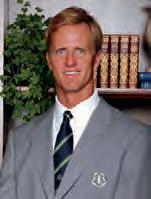 presented by Workday
presented by Workday
bigfansofthe
presentedbyWorkday.
When an event like the Memorial Tournament brings the community together, we take notice. Thank you to everyone for your hard work and dedication, from all of us at Huntington. Your efforts are inspirational.





















































































































































































































































































































































































































Delta Dental is proud to support the Memorial Tournament presented by Workday, which locally supports Nationwide Children’s Hospital.
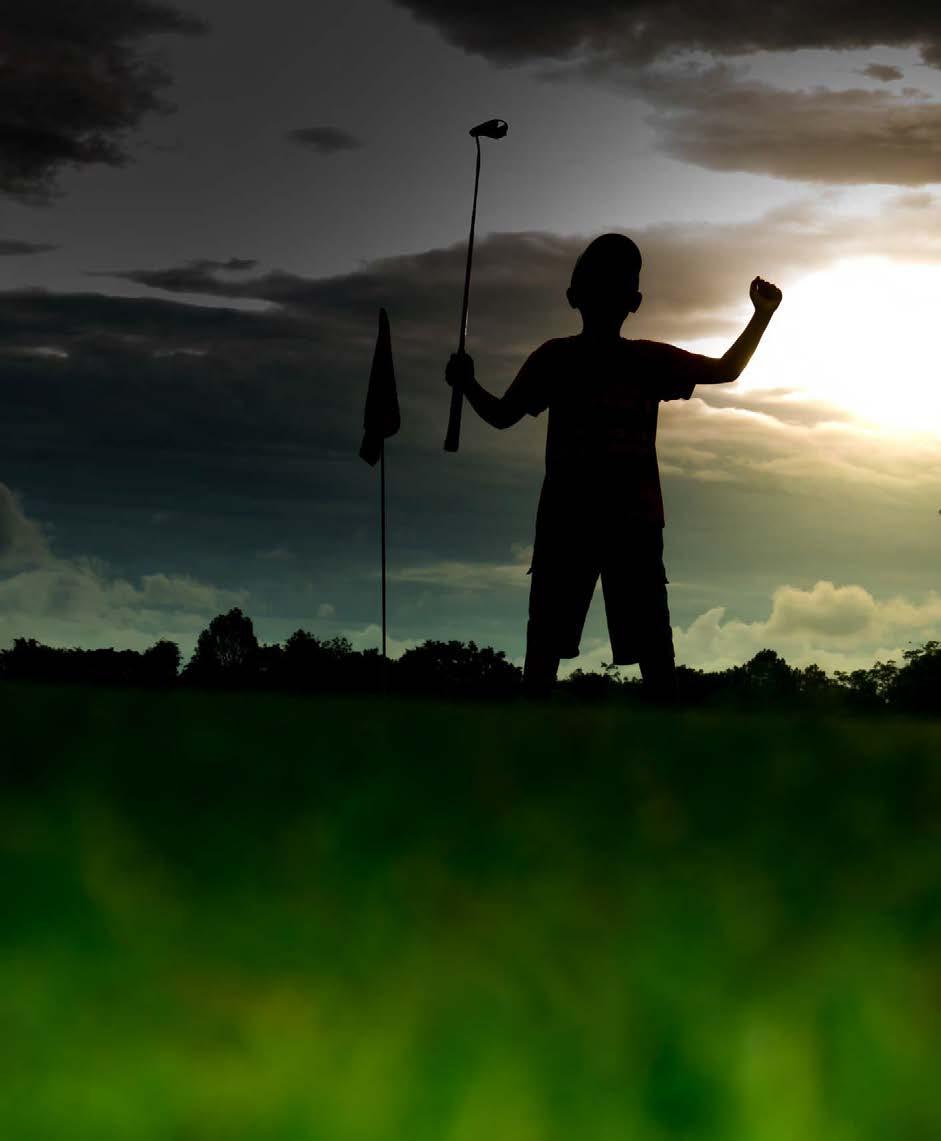
Together we’re building healthy, smart, vibrant communities fore all.
www.deltadentaloh.com

THE DAY BEGAN as what Ginny Hashman and her husband Andrew Johnson expected would turn out be another routine one during her pregnancy. Instead, it became “quite an adventure,” Hashman said.
It was June 2017, and she was 28 weeks along with her first child. An ultrasound had shown the baby to be smaller than normal for that stage of gestation, so another scan was scheduled at OhioHealth Riverside Methodist Hospital, where she was due to deliver. “I had been losing a lot of weight during pregnancy, but I hadn’t had any complications,” Ginny said. “They assured me the baby would find fat from somewhere. So, we went in there thinking we just had a small baby.”
Hashman and Johnson ended up at the hospital for about three hours that day while gradually becoming
overwhelmed by the number of challenges doctors said their unborn girl faced. The list was daunting:
• She had inter-uterine growth restriction (IUGR), caused by a lack of blood and nutrients flowing through the umbilical cord to the fetus;
• She had a congenital diaphragmatic hernia, a hole in the large muscle that separates the chest from the abdomen. Organs pushing through the hernia had limited development of her lungs to 22 percent of what should have been their normal size;
• A scan also had detected in her brain what doctors suspected might be Trisomy 18, a chromosomal disorder usually fatal at or within weeks of birth.


“My mom went with us to that initial visit, and she instantly started crying,” Ginny said. “Andrew didn’t show a lot of emotions at first. I took it all in … and
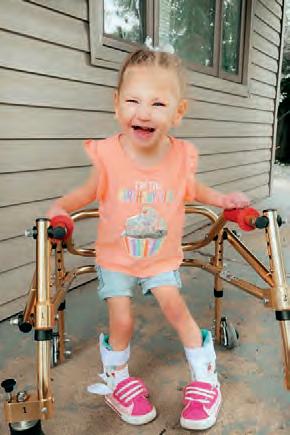


Nationwide® was founded on the principle of protecting what’s most important to people. So partnering with an organization focused on protecting the health and potential of children was a natural fit. For more than 60 years, Nationwide has been proud to support Nationwide Children’s Hospital to help ensure that every child has access to quality medical care. Since 2011, our sports sponsorships have raised over $55 million for the hospital.
Together, we are making a difference.
then I kind of got into this superhero mode. Instead of taking time to grieve, I think I just felt a need to figure out what I could do.”
Fortunately, further tests ruled out Trisomy 18 and another genetic disorder, Dandy-Walker syndrome. Nevertheless, the baby’s condition was so tenuous that four weeks later doctors at Nationwide Children’s Hospital recommended Ginny be admitted to Riverside for bed rest for five weeks to give her child the best chance to survive birth. A course of steroids was prescribed to help the baby’s lungs develop.
“But that night, things quickly changed,” Ginny said. “I got one dose of steroids, and she started having significant [deceleration] in her heart rate.”
Once during the night, the baby’s heart stopped.
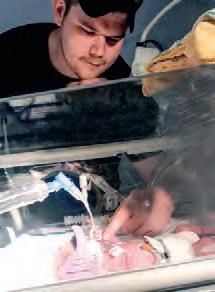
“A lot of nurses came in and kind of flipped me 20 different directions … [and] got her heart rate back,” Hashman said.

Later that morning, doctors decided it was too risky to leave the baby in the womb any longer, and Kinley Johnson was born by cesarean section on July 14 at 12:22 p.m. She weighed 2 pounds, 2 ounces.
Within an hour, she was transported to Nationwide Children’s. It would be another 32 days before her parents could hold her for the first time and her condition was stable enough for her to have surgery to repair the hernia. Kinley would stay in the hospital’s Memorial Tournament Neonatal Intensive Care Unit for 111 days before she went home.
“The specific problem that babies with [diaphragmatic hernias] have is that their lungs are underdeveloped because there are abdominal organs in their chest compressing the lungs, so the lungs don’t develop normally,”said Dr. Karen Diefenbach, the hospital’s director for Minimally
Kinley Johnson’s knee and wrist were the size of her father Andrew’s fingertip when she was first born.

If you’re thinking about choosing renewable energy, AEP Energy offers environmentally-friendly options. Our ECO-Advantage® plans match up to 100% of your electricity usage with Green-e® Energy Certified Wind Renewable Energy Certificates (RECs). Choose green and get the fulfillment that comes with reducing your carbon footprint and supporting a cleaner environment. | AEPenergy.com
AEP Energy is a certified Competitive Retail Electric Service (CRES) provider. While it is an affiliate of AEP Ohio, AEP Energy is not soliciting on behalf of and is not an agent for AEP Ohio. AEP Ohio customers do not need to purchase any competitive retail electric service from AEP Energy to receive or to continue to receive non-competitive retail electric service from AEP Ohio.
ECO-Advantage is Green-e Energy certified and meets the environmental and consumer-protection standards set forth by the nonprofit Center for Resource Solutions. Learn more at www.green-e.org.
Invasive Surgery who performed Kinley’s surgery. “So, they can have what’s called pulmonary hypertension, or high blood pressure within the lungs … [With that and] the transition from being supported by mom to now having to breathe on their own, the pulmonary hypertension can get worse before it starts to get better. And because of that, they can become very unstable. They can get really quite sick.”
Since her first surgery, Kinley has had four more at Nationwide Children’s to correct abnormalities with the hernia and intestines. Diefenbach performed each and continues to monitor Kinley’s health annually. Nationwide Children’s Hospital is the primary beneficiary of charitable proceeds from the Memorial Tournament presented by Workday via the Nicklaus Children’s Health Care Foundation.
Because of a congenital cytomegalovirus (CMV) that passed through the placenta during the fetus’ development, Kinley was born deaf and with cerebral palsy. But cochlear implants in each ear allow her to hear, and she is learning to communicate with sign language. In addition, she likely will have to use a feeding tube for the rest of her life because of early problems she had aspirating and vomiting her food, which caused her to lose too much weight.
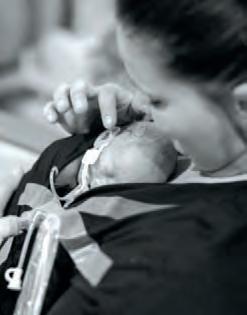
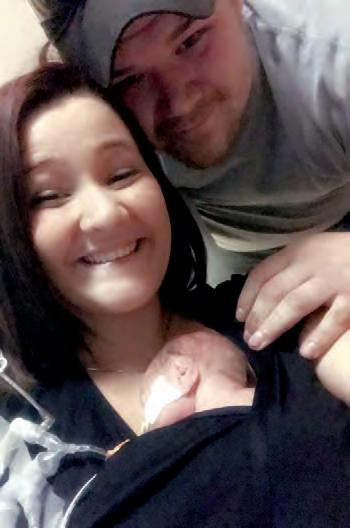
Later that morning, doctors decided it was too risky to leave the baby in the womb any longer, and Kinley Johnson was born by cesarean section on July 14 at 12:22 p.m. She weighed 2 pounds, 2 ounces.

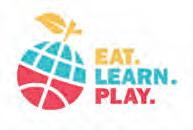


All four of Kinley’s limbs are affected by her cerebral palsy—her left arm and leg a bit more than her right—but despite her challenges, she attended kindergarten at her local elementary school this year and is more active than was expected when she was first diagnosed.

“At the end of the day, for any of these kids, instead of setting limitations for them, we should set goals for them and try to help them achieve their goals,” Diefenbach said. “Our goal should be to help [Kinley] become as functional and live as fulfilling of a life as possible.
Ginny said she and her husband initially were told it wasn’t likely Kinley ever would have the ability to control her head or to crawl, sit or walk. “But we started her in therapy at about 6 months old, and she [now] has a very fair range of motion. She can stand independently, and she is actively working on walking with the help of a gait trainer. She crawls actively, which is her way of getting around. She can get on and off the furniture independently. She has great trunk and head control. So, she’s progressed a lot.”
Ginny, who also has three younger children in the family’s home, as well as a 7-year-old stepson on weekends, said Kinley has a special bond with her father. He agrees. “She’s definitely a daddy’s girl,” Andrew said. “We play around, make funny faces at each other, tickle each other.
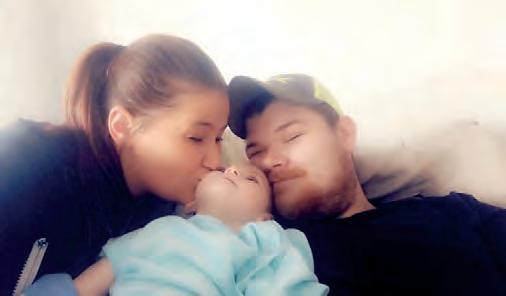
“She likes to mess with people’s hair. I have a feeling she’s going to become a hair stylist when she gets older.” MT
Bob Baptist retired from The Columbus Dispatch in 2015 after 37 years as the newspaper’s golf writer. He covered every Memorial Tournament from 1978 through 2014.
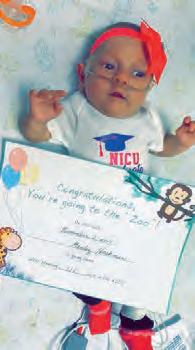 TOP LEFT: Kinley “graduates” from the Memorial Tournament Neonatal Intensive Care Unit at Nationwide Children’s Hospital.
TOP LEFT: Kinley “graduates” from the Memorial Tournament Neonatal Intensive Care Unit at Nationwide Children’s Hospital.
As a provider of water management solutions, we safeguard our enviroment and communities by protecting and managing water, the world’s most precious resource. As the largest plastic recycling company in North America, we keep over 600 million pounds of plastic out of landfills every year.
ADS is proud to be investing in the central Ohio community by building our new Engineering and Technology Center in Hilliard, Ohio. The facility will create over 200 jobs. Scan the QR code to view the video.

Honored to Support the Memorial Tournament presented by Workday.

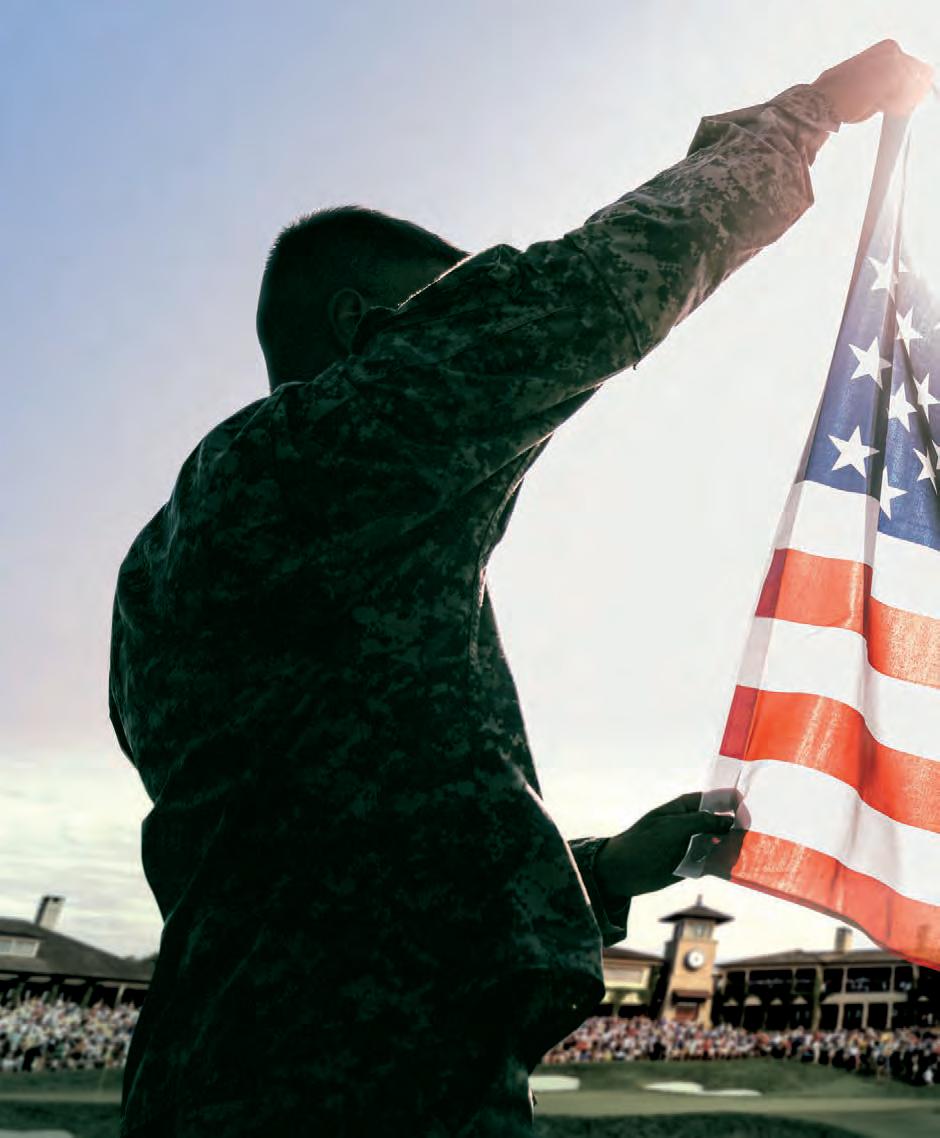
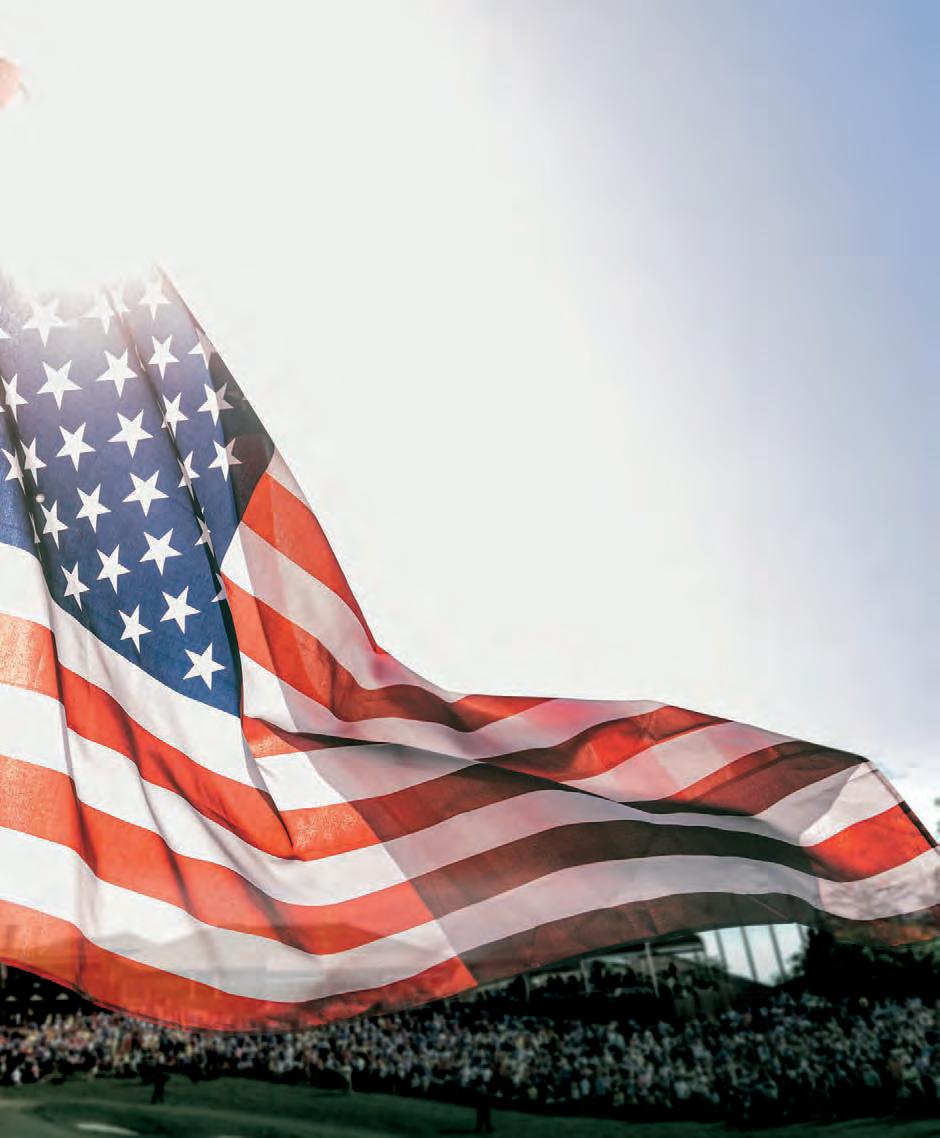
LED BY JACK AND BARBARA NICKLAUS and continuing a long-held tradition, the Memorial Tournament presented by Workday would like to respectfully recognize all active, retired, reserve and veteran military personnel, Ohio National Guard, Gold Star Families, and all levels of law enforcement, Fire/EMS personnel and other first responders for your dedicated service to our country and our communities. We are indebted to you and your families for your lifelong commitment to protect and serve others daily.
SPECIAL THANKS TO
Dr. Kalady is a colorectal surgeon who specializes in the evaluation and management of patients with cancer of the colon, rectum and anus. He is a professor of surgery at The Ohio State College of Medicine and serves as director of the Division of Colon and Rectal Surgery at The Ohio State University Comprehensive Cancer Center – James Cancer Hospital and Solove Research Institute (OSUCCC – James).
Why is colorectal cancer screening important?
Colorectal cancer screening saves lives. Colonoscopy screening can prevent colorectal cancer by detecting precancerous polyps that can be removed during the colonoscopy, before they become cancerous tumors. Screening can also detect early-stage colorectal cancer before it spreads to other parts of the body. Early-stage colon cancer is easier to treat and has a much higher chance of being cured.
How common is colorectal cancer?
Colorectal cancer is the third most common form of cancer, and approximately 5% of the U.S. population will be diagnosed with this type of cancer during their lifetime. In recent years, we have seen an increase in the number of younger patients diagnosed with colorectal cancer.
When should you be screened for colorectal cancer?
The current guideline is to begin screening at age 45 for average-risk people. Average-risk is defned as having no family history of colon cancer or high-risk polyps. High-risk individuals are defned as people with a frstdegree relative (parent, sibling or child) diagnosed with colon cancer.


Those at high risk should begin screening either at the age of 40 or 10 years before the age their frst-degree relative was diagnosed (whichever age is lower). If you have a family history of colorectal cancer, discuss with your physician when you should be screened. It’s also important to note that there is a difference between screening and evaluation of symptoms. Colonoscopy screening is for people who don’t have any symptoms. If you have any symptoms related to your colon, such as bleeding with bowel movements, nausea, bloating or change in your bowel habits, speak to your doctor right away.
What’s involved in a colorectal cancer screening?
Colonoscopies are considered the gold standard for colorectal cancer screening and are our most effective tool in diagnosing and removing precancerous
polyps and detecting early-stage colorectal cancer.
A colonoscopy is a minimally invasive medical procedure. The patient is sedated, then the doctor inserts a small camera mounted on the end of a long, fexible tube into the colon (large intestine). The camera gives the physician a clear, visual image of the inner lining of the colon to detect any abnormalities that might be present with colon, rectal or anal cancers.
Some preparation is required by patients prior to a colonoscopy. Patients must fast and are prescribed a bowel-prep liquid solution (or a pill in some cases) that is ingested the evening before the procedure to help clear the colon. This can be a bit of an uncomfortable experience, but it’s important because it evacuates all the stool from the colon and ensures excellent visibility for the physician performing the colonoscopy.
At The James, you’re choosing the experts who understand there is no such thing as routine cancer. Where your care is delivered by a highly specialized, compassionate team dedicated to studying and treating just one type of cancer — yours. By choosing The James, you’re choosing access to worldclass clinical trials, dedicated support services and an unmatched survivorship program to support you before, during and after cancer treatment. All at the region’s only comprehensive cancer center designated by the National Cancer Institute.
#ChooseTheJames cancer.osu.edu/ChooseTheJames
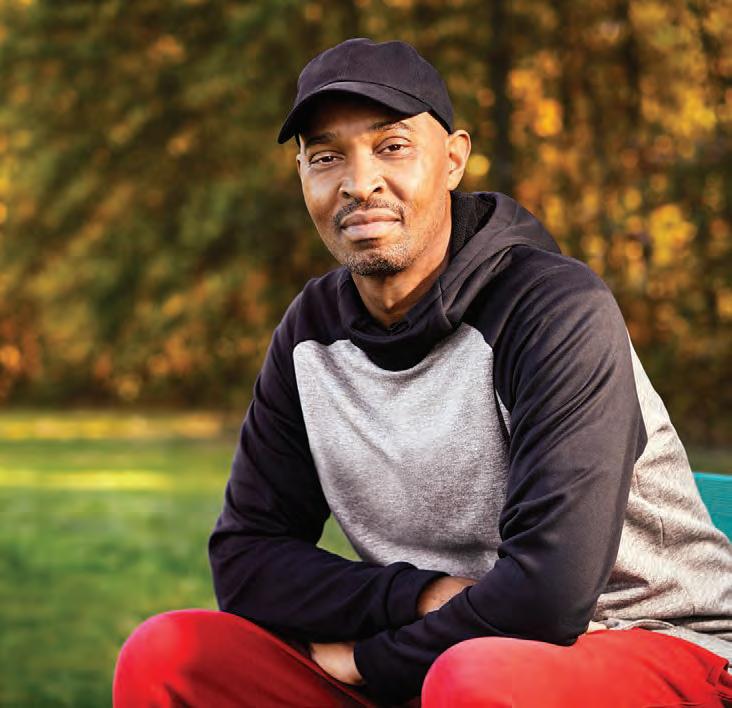
THE CAPTAINS CLUB, an international group of authorities on the game of golf, has advised on the constitution and conduct of the Memorial Tournament since its inception in 1976. One of the Captains’ primary tasks is to select the person or persons in whose honor the Memorial Tournament is played each year. For this year’s 48th Memorial Tournament presented by Workday they have selected Larry Nelson. All members of the Captains Club give of their time on an honorary basis, and, as always, Memorial Founder and Host Jack Nicklaus and the Executive Committee are grateful for their contributions to the Tournament’s success.
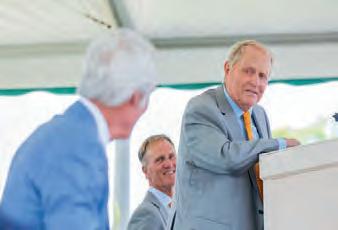
RETIRED CAPTAIN
H. Colin MacLaine
W. Ronald Alexander • Peter Alliss • John D. Ames
J. Paul Austin • William C. Battle • Peggy Kirk Bell
The Honorable George H. W. Bush • William C. Campbell
Sir John Carmichael • James Ray Carpenter • Howard L. Clark
Sir Sean Connery • Bing Crosby • Joseph C. Dey, Jr.
Charles Evans, Jr. • The Honorable Gerald R. Ford
William Ward Foshay • Isaac B. Grainger • James Grimm
Hord Hardin • Jay Hebert • Totten P. Heffelfinger
Bob Hope • Frederick E. Jones • George H. Love
David Marr • Gerald H. Micklem • John D. Montgomery, Sr.
Byron Nelson • Will F. Nicholson, Jr. • James L. O’Keefe
Arnold Palmer • William J. Patton • Eugene Pullia
Bernard H. Ridder, Jr. • Clifford Roberts
Gene Sarazen • Harton S. Semple • Sir Iain Stewart
Philip H. Strubing • F. Morgan Taylor, Jr. • Richard S. Taylor
Robert W. Willits • Herbert Warren Wind • John W. Winters, Jr.
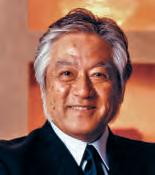
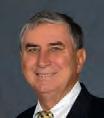
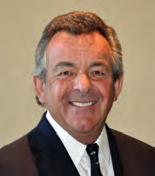
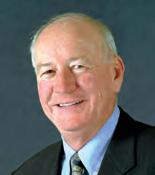
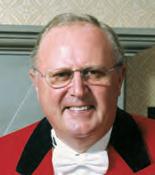
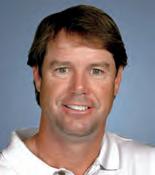
Recognized as the “First Lady of Golf”; tireless supporter for charitable causes, primarily children’s health care.
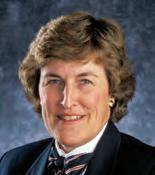
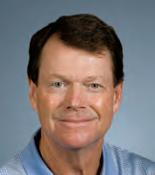
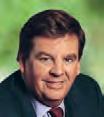
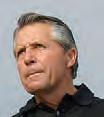
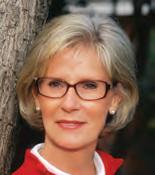
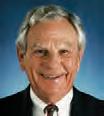
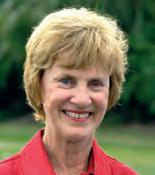
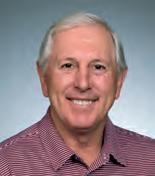
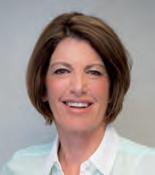
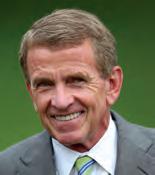
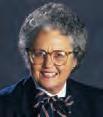
U.S.
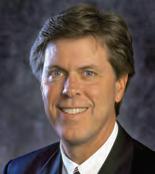
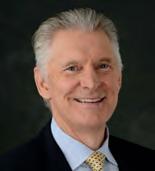
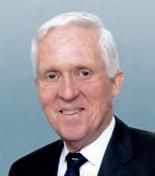
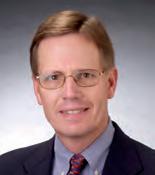 PAUL AZINGER Winner in 1993 of the Memorial and the PGA Championship; winning 2008 U.S. Ryder Cup captain; NBC-TV golf analyst.
SIR MICHAEL BONALLACK Former Secretary and Captain of The Royal and Ancient Golf Club of St. Andrews; five-time British Amateur champion.
O. GORDON BREWER, JR. Former Chairman of Pine Valley Golf Club; two-time U.S. Senior Amateur champion.
TIM FINCHEM Former Commissioner of the PGA TOUR (1994-2016); 2022 inductee to the World Golf Hall of Fame.
TREY HOLLAND Former President of the USGA (2000-02).
A.S. (SANDY) DAWSON Past Captain of The Royal and Ancient Golf Club of St. Andrews (2013-14).
JULI INKSTER Hall of Fame golfer with 31 LPGA wins, including seven major titles.
TONY JACKLIN 1969 British Open and 1970 U.S. Open champion; member of the World Golf Hall of Fame.
HALE IRWIN Hall of Famer with three U.S. Open titles; two-time winner of the Memorial Tournament.
ANDY NORTH
1978 and 1985
Open champion; television golf analyst for ESPN.
BARBARA NICKLAUS
CHARLES S. MECHEM, JR. Former Commissioner of the LPGA (1990-95); now holds title of Commissioner Emeritus.
KEN LINDSAY Former President of the PGA of America (1997-98).
JUDY RANKIN Winner of 26 LPGA tournaments and Hall of Fame golfer; ground-breaking television golf analyst.
HISAMITSU OHNISHI Former Vice Chairman of the Japan Golf Tour Organization; leader in the development of Japan’s professional golf tour.
GARY PLAYER Hall of Fame golfer from South Africa with nine majors; one of five to win career grand slam; winnerof more than 150 events globally.
FRED S. RIDLEY Chairman of Augusta National Golf Club; 1975 U.S. Amateur champion and former President of the USGA (2004-05).
JOHANN RUPERT Chairman of the South African Tour and Chairman of the South African Golf Development Board.
TOM WATSON Hall of Fame golfer and eight-time major champion; two-time Memorial winner; ardent supporter of junior golf programs.
CAROL SEMPLE THOMPSON Accomplished amateur player and former member of the USGA Executive Committee.
PAUL AZINGER Winner in 1993 of the Memorial and the PGA Championship; winning 2008 U.S. Ryder Cup captain; NBC-TV golf analyst.
SIR MICHAEL BONALLACK Former Secretary and Captain of The Royal and Ancient Golf Club of St. Andrews; five-time British Amateur champion.
O. GORDON BREWER, JR. Former Chairman of Pine Valley Golf Club; two-time U.S. Senior Amateur champion.
TIM FINCHEM Former Commissioner of the PGA TOUR (1994-2016); 2022 inductee to the World Golf Hall of Fame.
TREY HOLLAND Former President of the USGA (2000-02).
A.S. (SANDY) DAWSON Past Captain of The Royal and Ancient Golf Club of St. Andrews (2013-14).
JULI INKSTER Hall of Fame golfer with 31 LPGA wins, including seven major titles.
TONY JACKLIN 1969 British Open and 1970 U.S. Open champion; member of the World Golf Hall of Fame.
HALE IRWIN Hall of Famer with three U.S. Open titles; two-time winner of the Memorial Tournament.
ANDY NORTH
1978 and 1985
Open champion; television golf analyst for ESPN.
BARBARA NICKLAUS
CHARLES S. MECHEM, JR. Former Commissioner of the LPGA (1990-95); now holds title of Commissioner Emeritus.
KEN LINDSAY Former President of the PGA of America (1997-98).
JUDY RANKIN Winner of 26 LPGA tournaments and Hall of Fame golfer; ground-breaking television golf analyst.
HISAMITSU OHNISHI Former Vice Chairman of the Japan Golf Tour Organization; leader in the development of Japan’s professional golf tour.
GARY PLAYER Hall of Fame golfer from South Africa with nine majors; one of five to win career grand slam; winnerof more than 150 events globally.
FRED S. RIDLEY Chairman of Augusta National Golf Club; 1975 U.S. Amateur champion and former President of the USGA (2004-05).
JOHANN RUPERT Chairman of the South African Tour and Chairman of the South African Golf Development Board.
TOM WATSON Hall of Fame golfer and eight-time major champion; two-time Memorial winner; ardent supporter of junior golf programs.
CAROL SEMPLE THOMPSON Accomplished amateur player and former member of the USGA Executive Committee.

Scan for golf news & event info, recipes, merch drops, and more surprises for the green.


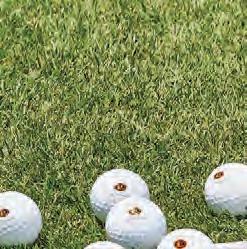



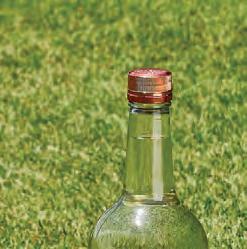


AFUNNY THING HAPPENED ON THE WAY TO THE WAR. Larry Nelson caught the golf bug. That’s funny because he had never played the game.
That’s funny because at 20, he was nowhere near a golf course. One night, he’d huddle among a dozen men in a bunker on what the United States Army unimaginatively designated as Hill 707 somewhere south of Da Nang, Vietnam. Another day, he’d slash through a nameless stretch of jungle. Or his patrol would hunt for the source of enemy artillery shelling the American base at Chu Lai.
Nelson was a soldier in the 198th Infantry Division. It was 1968. This was the Vietnam War.
Yes, this was the same Larry Nelson who enjoyed a career worthy of the World Golf Hall of Fame, winning 10 times on the PGA TOUR, including a pair of PGA Championships and a U.S. Open, and who went 9-0 in matches in his first two Ryder Cups and knocked off Spanish superstar Seve Ballesteros four times in one weekend.
PORTRAIT BY GLENN HARRINGTONSoft-spoken Larry Nelson has had a remarkable career, especially considering that he didn’t play his first round of golf until he was 22 years old


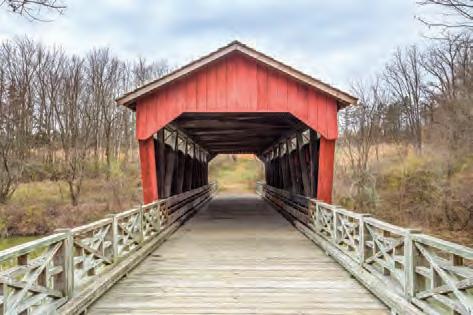
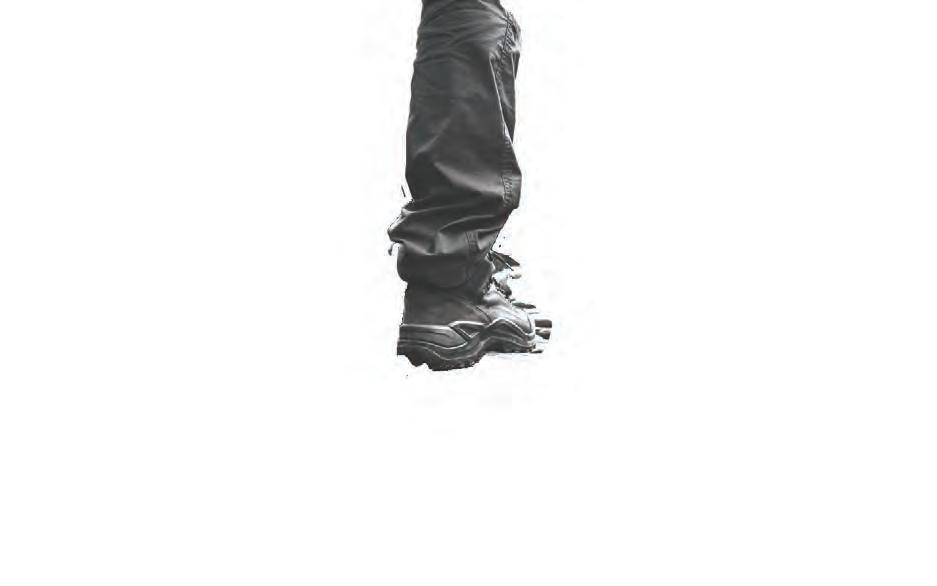
It was the same Larry Nelson who, for all of those accomplishments and more, is recognized as the Honoree for the 48th edition of the Memorial Tournament presented by Workday.
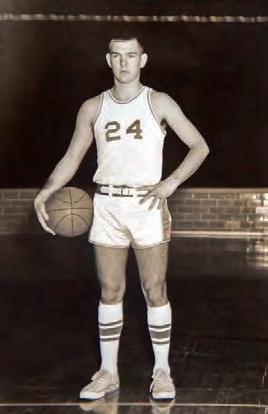
Here is what’s funny, as in unbelievable: While serving in the Army in Vietnam, the future Hall of Famer from Acworth, Georgia, just northwest of Atlanta, was still more than a year-and-a-half away from playing golf for the first time.
After high school, Nelson enrolled at Southern Tech near Atlanta, but dropped out in the spring of his first year to earn enough money to afford returning for the fall quarter. He landed a good-paying job as an illustrator with defense contractor Lockheed in nearby Marietta, Georgia. Dropping out of college meant he lost his student deferment. Nelson received his draft notice 10 days after his 19th birthday in September 1968. He reported to the Army 10 days later.
Could he have avoided being drafted if he’d immediately preregistered for the distant fall quarter? He’ll never know, but he knew trying to fight Army bureaucratic red tape was probably like Vietnam, a war that couldn’t be won.
“It was impossible to go back and undo that—not registering for the fall,” Nelson said. “I don’t remember having regrets. Because the Vietnam War was going on, I figured I would have to go sometime.”
That was how Nelson began an unlikely journey toward a game he’d never played.
His first stop was Fort Hood in the rolling hills of Texas between Waco and Austin. That proved inconvenient because he had just married Gayle, his childhood sweetheart. Their first kiss came during a spin-the-bottle game at a fifth-grade birthday party. “I don’t remember not knowing Larry,” Gayle said. “When his family moved to our little town, he was 5 and I was 3. I always had a crush on him.”
The closest living quarters they could find to Fort Hood was a small Army apartment almost 40 miles away near Lampasas, a modest town of 5,000.
“We were young, we couldn’t even afford a telephone,” Gayle remembered. “If he showed up for supper, that was good. If he didn’t, I knew he’d probably been taken out in the field.”
Nelson would leave at 5 each morning to get to Fort Hood by 6. When he left on Monday, they never knew what time, or what day, he would return. “She was pretty strong and independent, but she was 17 years old and just out of high school,” Nelson said. “She said she spent a lot of time crying.”
It was while Nelson was out on extended field maneuvers at Fort Hood one particular day that something important happened. His squad was hunkered down beneath the Texas night sky. Nelson asked Ken Hummel, his best pal in the unit, what he was going to do after his Army service. Hummel, who had played on the golf team at Miami Dade Junior College answered, “I’m going to play golf every day I can.”
Nelson was an excellent baseball pitcher with a canny assortment of pitches and deliveries, a star infielder and a pretty good basketball guard. He also played football. But golf? Never. “I thought guys who played golf wore funny pants and
Nelson was an excellent baseball pitcher with a canny assortment of pitches and deliveries, a star infielder and a pretty good basketball guard. He also played football. But golf? Never.
were sissies,” Nelson said. “But Ken hadn’t shaved or bathed for almost two weeks, and he was holding a loaded M-16. I didn’t think it was wise to tell him how I felt about golf at that particular time.”
Hummel talked on about golf and its courses, golf hole designs, his swing and the pressure of playing in competition. There was something about what Hummel said, or the passion with which he said it, that Nelson found intriguing and appealing. Even years later, he could not explain it. Nelson had planned to get an engineering degree and become a chemical engineer. After that night under the Texas stars, as crazy as it sounds, he began to think about golf.
When six months of basic and advanced training was over, Nelson’s group got orders for Vietnam. That included Hummel, but oddly, not Nelson. He was reassigned to a new group of draftees and six more months at Fort Hood. Nelson never learned why. He suspected a certain officer did him a favor.
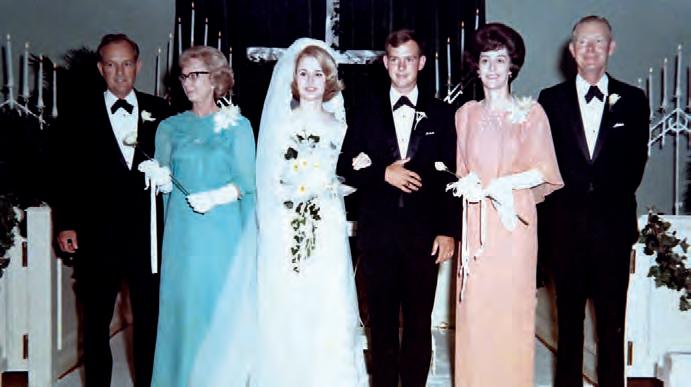
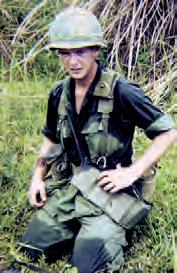
“The captain knew I’d been an illustrator for Lockheed, so he had me paint this big rock in front of his office,” Nelson said. “He really liked it. Or maybe I was just lucky.”
That must have been the Mona Lisa of rock paintings. Six months later, he got “lucky” again. The trainees left for Vietnam, Nelson stayed behind and started over with a third group. “At least that ate up 18 months of my service time,” he said.
Following his third six-month stint, Nelson shipped out to Vietnam. Nelson was the infantry leader for a squad whose mission was termed Search and Destroy. It was their job to locate the enemy and call in coordinates for artillery or airstrikes.
“The bad thing was, the Viet Cong knew that’s what we were doing out there,” Nelson said. “We would come under fire pretty much every day. They’d set ambushes.”
A patrol might last two or three weeks. Then the men returned to a base camp to clean up, get laundry done and
INSET:
(2)
TOP: Gayle and Larry Nelson, along with their parents, on their wedding day. Soon after marrying, Nelson was drafted into the U.S. Army and later sent to Vietnam.We are a resilient integrated energy leader with an unwavering focus on safety and asset integrity, while delivering leading and transparent environmental, social and governance performance.
To learn more about our commitment, visit cenovus.com/sustainability.
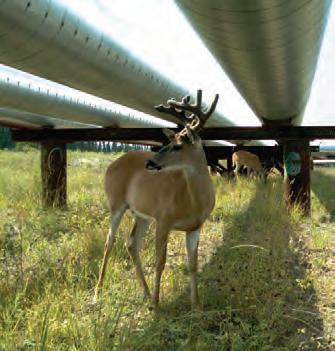



reload ammunition. After two or three days, they went back into the field. “We were pretty much out there as bait,” Nelson said.
Jungle warfare wasn’t like war in the movies. The enemy was mostly unseen. As a result, Nelson had no idea if he ever hit or killed any enemy soldiers.
“It was a weird war,” he said. “Some of the people who did your laundry during the day would shoot at you at night. You never knew for sure about anybody. The Vietnamese people were nice, but the Viet Cong would warn them they’d come back to their village and kill them if they told the Americans they’d been there or were storing stuff there. They were caught in the middle.”
The U.S. soldiers were caught-in-the-middle men, too, in a guerilla war the U.S. government didn’t know how to win or wouldn’t allocate the resources to win. “By the time I got there, the soldiers knew the overall campaign was a lost cause,” Nelson said. “So, we just tried to get from Point A to Point B without getting shot. Our goal was just to get home.”
That happened sooner than expected for Nelson. His application for early release, based on resuming his job for
defense contractor Lockheed and continuing his college classes, was approved. Nelson had 101 days left to serve. The waiver reduced that to 11 days. Nelson did not go out into the field again.
By the age of 21, Jack Nicklaus had already won two U.S. Amateur titles and tied for second in the 1960 U.S. Open as an amateur. Nelson wouldn’t play his first golf round until he was 22. And then, following that two-year Army stint and an allexpenses-paid trip to Vietnam, the golfing novice would earn his first PGA TOUR victory at the Jackie Gleason-Inverrary Classic a little more than a decade later.

Even Hollywood couldn’t make this up. In golf history, no one ever did what Nelson did. His improbable tale made him even more of a Cinderella story than Francis Ouimet or Jack Fleck—if that’s possible.
And when this fairy tale started, Cinderella wore Army boots.
THE BIG QUESTION: How did Larry Nelson do the seemingly impossible and rocket from rank beginner to PGA TOUR player in four years? His natural athleticism was a big part of the answer.
He spent another year working at Lockheed after returning from Vietnam. He worked seven days a week, 10 hours a day and squeezed in classwork at Kennesaw Junior College for two hours a night three times a week. When he left his Lockheed job, he had one class left to earn his pre-engineering degree and that class ended at 9 a.m. Gayle worked daily until 6 p.m. as a sales order clerk for Allied Chemical. What was Nelson supposed to do for nine hours until she came home? Well, what would Ken Hummel do?
“Golf seemed like the logical thing,” Nelson said.
Enter Rich’s Department Store, a storied Atlanta-based chain eventually absorbed by Macy’s in 2005. That’s where Gayle bought Larry a set of Jack Nicklaus signature clubs as
Larry Nelson in uniform during his Army stint with his parents, Rudell and Vernon, and brothers Rick (left) and Tommy.By the age of 21, Jack Nicklaus had already won two U.S. Amateur titles and tied for second in the 1960 U.S. Open as an amateur. Nelson wouldn’t play his first golf round until he was 22.
Cintas helps businesses of all kinds and sizes get Ready for the Workday™. We do this by providing a wide range of products and services that enhance our customers’ image and help keep their facilities and employees clean, safe and looking their best.
Cintas helps businesses of all kinds and sizes get Ready for the Workday™. We do this by providing a wide range of products and services that enhance our customers’ image and help keep their facilities and employees clean, safe and looking their best.
Cintas helps businesses of all kinds and sizes get Ready for the Workday™. We do this by providing a wide range of products and services that enhance our customers’ image and help keep their facilities and employees clean, safe and looking their best.

Cintas is proud to support the Memorial Tournament presented by Nationwide
Cintas is proud to support the Memorial Tournament presented by Workday

Cintas is proud to support the Memorial Tournament presented by Nationwide
Visit us at cintas.com for more information.
Visit us at cintas.com for more information.
Visit us at cintas.com for more information.
UNIFORMS | FACILIT Y SERVICES
UNIFORMS | FACILIT Y SERVICES
FIRS T AID & SAFETY | FIRE PROTECTION
FIRS T AID & SAFETY | FIRE PROTECTION
UNIFORMS | FACILIT Y SERVICES
FIRS T AID & SAFETY | FIRE PROTECTION
®
Cintas lets you swing with confidence.
Cintas lets you swing with confidence.
Cintas lets you swing with confidence.
a Christmas present in 1969. The set had only odd-numbered irons, a driver and 3-wood. He broke 100 in his first 18-hole round the following spring in 1970. He cracked 70 within nine months.
“I got better every day and fell in love with it,” Nelson said.
Tips and a few lessons from several area pros helped him, and Nelson carefully studied the classic book, “Ben Hogan’s Five Lessons: The Modern Fundamentals of Golf.” No one hit more balls than Nelson did at the Sam Snead Par 56 Southwest,
an executive course with a double-decker driving range across the road from Lockheed.
Also, he applied his baseball skills to golf. “I never related hitting a golf ball to hitting a baseball,” Nelson said. “My golf swing felt like I was throwing a ball from second base to first. Nobody throws a baseball without using their legs and turning their hips. It’s the same in a golf swing.”
It isn’t that simple for most mortals, but Nelson used his engineer’s mind, artist’s eye and natural athleticism to develop the rarest, most coveted of ball flights—a straight ball. Nelson improved so quickly that he passed up a chance to attend Georgia Tech University, where he’d been accepted, and took a job instead as an assistant pro at Kennesaw’s Pinetree Country Club. He’d been playing there as a member.
Soon, Nelson couldn’t get a match against other assistant pros or members unless it was three-against-Nelson. That’s when several members of Pinetree figured he should chase pro golf and gave him a cash stake to try the Florida mini tours. The Nelsons relocated to Lutz, north of Tampa. Nelson won six mini tour events, then made it through the eight-round ordeal known as Q-School on his first try to get his PGA TOUR card for 1974.
Larry Nelson in 1976, a little more than six years after he took up the game of golf and two years after turning pro.
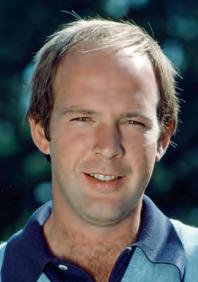
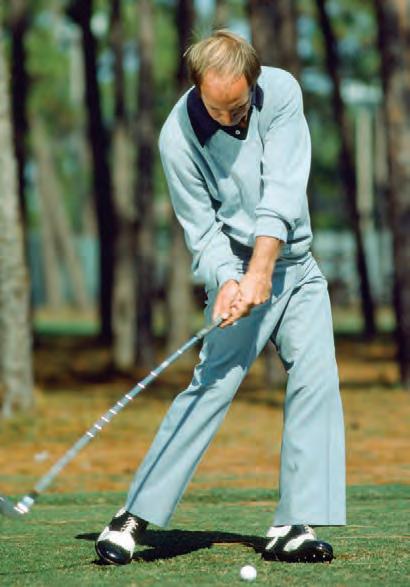
“I never related hitting a golf ball to hitting a baseball. My golf swing felt like I was throwing a ball from second base to first. Nobody throws a baseball without using their legs and turning their hips. It’s the same in a golf swing.”
—LARRY NELSON

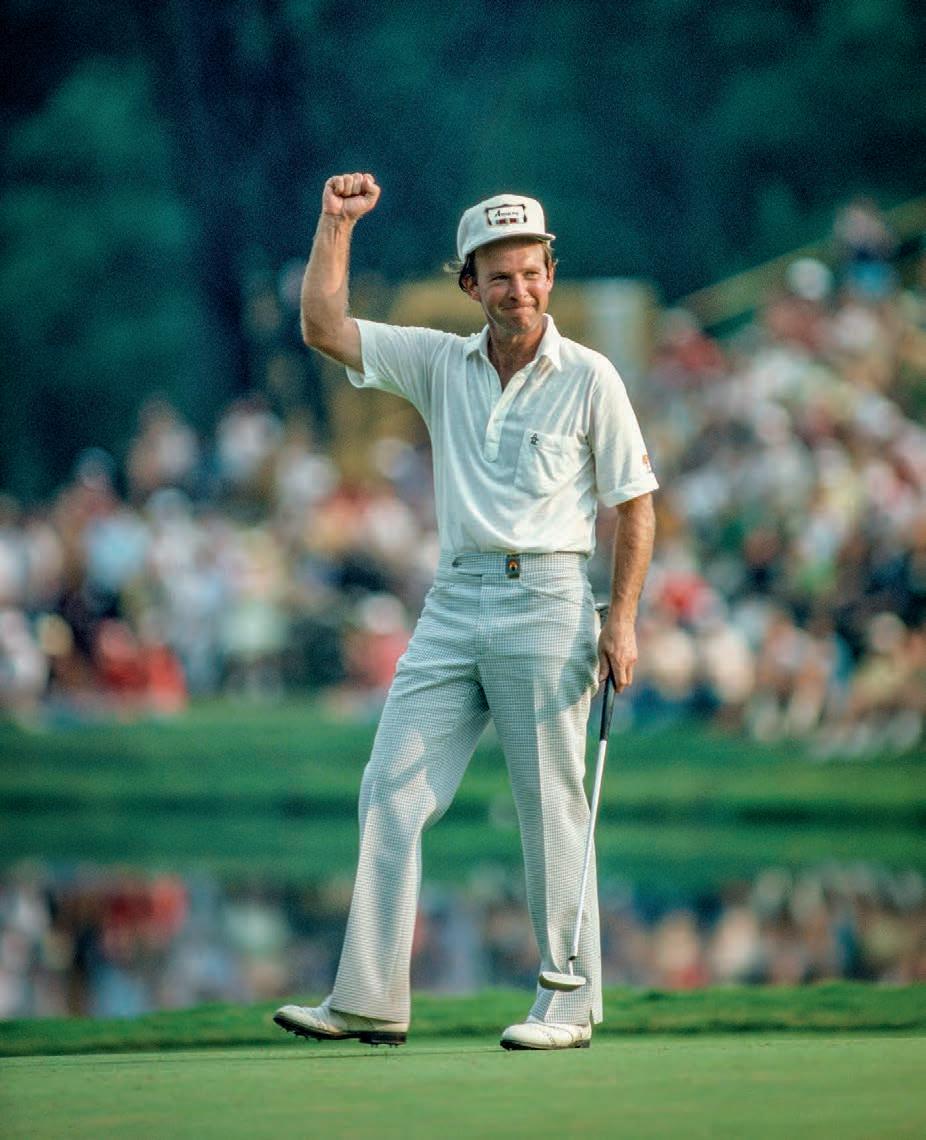
Thanks to consecutive 66s in the second and third rounds on the Highlands Course, Nelson took a four-stroke lead into the final day and cruised, finishing at 7-under 273.
As a rookie, he went 11 straight weeks without either getting into a tournament via Monday qualifying or making a cut, which earned a player a spot in the next tournament. He finished eighth in his 12th tournament, made enough money to keep his card and was on his way. And thanks to the alphabet, he often found himself with a clubhouse locker next to Nicklaus.
“I remember Larry’s early career and how he would hit 3-woods off the tee because he couldn’t get his driver off the ground,” said fellow Hall of Famer Lanny Wadkins. “He was still learning how to play. But he was out on TOUR playing, which was pretty amazing.”
Nelson was a three-time runner-up in 1977 and earned more than $99,000. Two years later he was a two-time winner, and two years after that, he won his first major championship at the 65th PGA Championship, beating Fuzzy Zoeller by four strokes at Atlanta Athletic Club. Thanks to consecutive 66s in the second and third rounds on the Highlands Course, Nelson took a four-stroke lead into the final day and cruised, finishing at 7-under 273.
No one could’ve predicted this. Except Nelson’s mother, once, whimsically.
“I was 10 or 12 and we were watching the Masters or some big tournament on TV,” Nelson said. “They showed Arnold Palmer and then showed his birthday, Sept. 10, the same as mine. My mom saw that and said, ‘Maybe you’ll grow up to be a professional golfer someday, too, Larry.’ I never even gave it a thought at the time.”
THE 1979 RYDER CUP was the beginning of a new era for the lopsided event. Great Britain & Ireland expanded to include all of Europe, which meant adding Europe’s new best player, Seve Ballesteros. The Spaniard figured to be a difference-maker in the matches at The Greenbrier in West Virginia. Ballesteros wasn’t because Nelson shut him down with help from his partner, Wadkins.
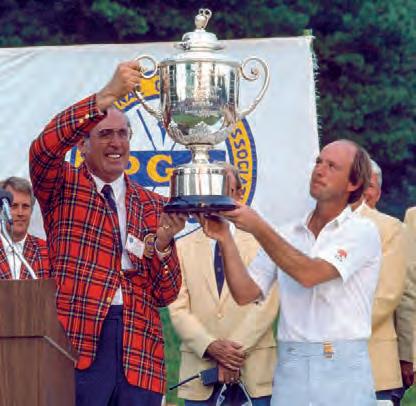
Wadkins asked U.S. Captain Billy Casper to pair him with Nelson after Tom Watson, Wadkins’ expected partner, withdrew due to the birth of his first child. “I had the match-play experience, Larry didn’t,” Wadkins said. “I just kept telling Larry, ‘Let’s bury them.’ We just kept going and going.”
Wadkins and Nelson were unstoppable. They defeated Ballesteros and Ignacio Garrido in the opening fourballs, 2 and 1, then won an afternoon foursomes match. The next day, the Americans stuffed Ballesteros and Garrido in foursomes, 4 and 3. That was the morning round’s last match. Casper guessed Europe would send out Seve first in the afternoon
OPPOSITE and ABOVE : Larry Nelson celebrates after winning the 1981 PGA Championship at Atlanta Athletic Club.to avoid the Nelson-Wadkins duo, so he matched the move. Checkmate. Nelson and Wadkins thumped Ballesteros and Garrido, 5 and 4.
“I birdied the first five holes, Larry birdied 6, I birdied 7 and Larry eagled 8,” Wadkins said. “We were 9 under through eight holes. We blitzed them. It was pretty special.”
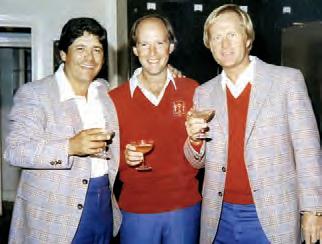
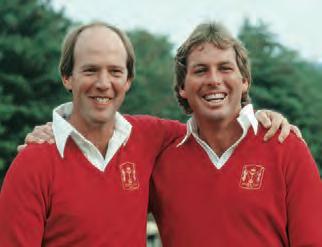
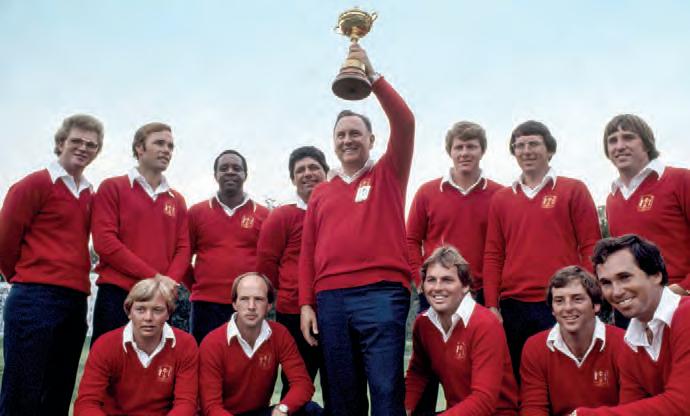
Nelson drew Ballesteros in singles—probably not by accident—and beat him again, giving him a 5-0 mark as a Ryder Cup rookie. It took 42 years until another American, Dustin Johnson, matched Nelson’s feat in the 2021 matches at Whistling Straits.
Nelson went 4-0 in 1981 on what is widely considered the
For nearly 70 years, E-Z-GO® has been leading the charge with industry-leading products, class-leading innovations and advanced technologies. Wherever your adventure takes you, E-Z-GO provides you with the little luxuries that brings you a world-class experience. With E-Z-GO, you can find your perfect ride.

best U.S. Ryder Cup team ever assembled. Playing a first-round match with Lee Trevino, Nelson birdied the last two holes to lift the Americans from a 1-down deficit against Bernhard Langer and Miguel Piñero with two holes to play to a stunning turnaround victory.
“I made a 2-footer that felt like a 20-footer at 17,” Nelson said. “At 18, I sank about a 50-footer for the win. I never saw Trevino get really excited about anything, but when I made that putt, he got really excited.”
Nelson won two more matches with Tom Kite as a partner and another singles match, but U.S. captain Dave Marr held Nelson out of the Friday afternoon session, which kept him from a chance at another 5-0 week. Four decades later, the 75-year-old Nelson is still mildly annoyed by that, to be honest, but he is overwhelmingly grateful to have been a part of a team with 10 of its 12 members destined for the Hall of Fame.
“Larry was a great Ryder Cup player when the event wasn’t as highly watched,” said long-time TOUR player Mark McCumber. “If he’d done what he did in the ’90s, he would’ve been known as the Ryder Cup killer.”
There was some irony in 1987 when Nelson rejuvenated his game thanks to a serious workout regimen and beat Wadkins, his old Ryder Cup partner, on the first hole of a sudden-death playoff to win his second PGA Championship at PGA National Resort in Palm Beach Gardens, Florida. The championship was played in August in searing heat, and Nelson and Wadkins, at 1-under 287, were the only players to break par on the Champion Course.

“If there were world rankings [back then], there was a time when Larry would’ve been top four in the world,” said two-time U.S. Open champion Andy North. “When you consider that he didn’t play golf until his early 20s, what he accomplished was magnificent.”
IT IS NOT LARRY NELSON’S fault he is golf’s Invisible Man. No three-time major champion and Ryder Cup star has accrued less attention.
How is that possible? Two of his major wins were PGA Championships in August, a time when TV golf ratings dipped, and golf might not make the sports section’s front page. His ’81 PGA win was a stellar performance but without drama, and
“If there were world rankings [back then], there was a time when Larry would’ve been top four in the world. When you consider that he didn’t play golf until his early 20s, what he accomplished was magnificent.”
—ANDY NORTH
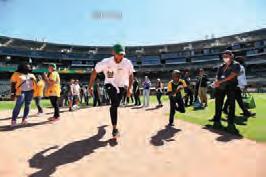
Stephen and Ayesha Curry’s Eat. Learn. Play. Foundation is dedicated to unleashing the potential of every child. Rooted in three of the most vital pillars for a healthy childhood—nutrition, education, and physical activity—Eat. Learn. Play. is working to ensure that every child has access to the nutritious food they need to be healthy and thrive, resources to become good readers, and safe places and equitable opportunities to play.
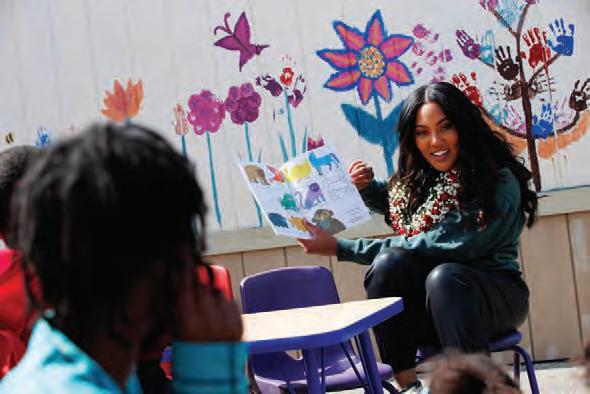
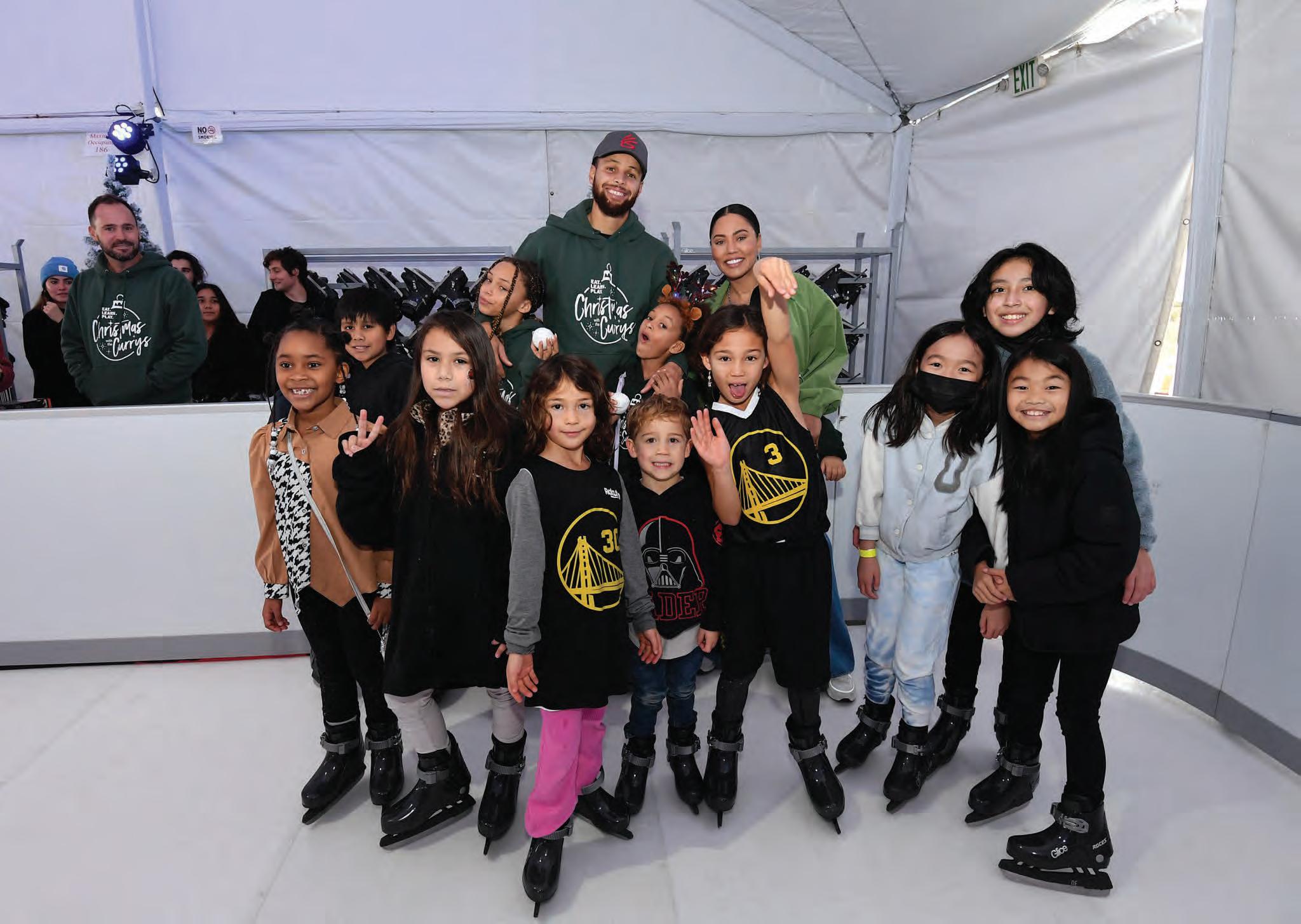
We’re honored to be partnering with Workday, the Memorial Tournament, and Nationwide Children’s Hospital to reach kids and families here in the Columbus area.
www.EatLearnPlay.org

PGA National was so new in ’87 that it was brown on account of having so little grass and looked atrocious on TV.
The 1983 U.S. Open at Oakmont was Nelson’s finest hour. Nelson trailed by seven strokes after 36 holes, and he stood 7 over par for the championship through four holes of the third round. He then proceeded to play his final 14 holes in 7 under par for a 65 to get back to even par. He trailed defending champion Tom Watson and Ballesteros, the reigning Masters champion, by one stroke heading into Sunday’s final round.

Afternoon storms pushed the last few holes to Monday morning, when only a few thousand fans and not many TV viewers watched. It didn’t matter how sensational the ending was—Nelson sank a 60-foot birdie putt from across the 16th green on his first hole of the morning—or that he ended up edging Watson, the game’s reigning superstar, by a stroke.
Nelson’s one-shot lead vanished when he three-putted the 18th from 25 feet below the hole and got into the house at 4-under 280. His lead was restored when Watson dumped his approach into a greenside bunker and bogeyed the short par-4 17th. Watson needed to birdie the mighty 18th for a tie but missed the green long and faced a tough pitch.
“He’d chipped in the year before on Jack at 17 at Pebble Beach,” Nelson said. “It really would’ve been something if he’d done it two years in a row. Tom’s chip had a chance to hit the pin, but it went way past. Then he made the [comeback] putt from 40 feet. My wife had the most astonished look on her face.”
Horrified, Gayle Nelson thought that his putt had tied her husband. “She had one of those bigeye things going on,” said Nelson with a chuckle. “I said, ‘No, that’s OK, I still won.’ ”
Not only had he won, but Nelson set a championship record with his 132 aggregate score over the final 36 holes, breaking Gene Sarazen’s 51-year-old mark. And he did that at mighty Oakmont. The record still stands, by the way.
But then, the slights began to pile up. The USGA annually
Nelson rallied to win the 1983 U.S. Open at Oakmont after a weather-plagued Sunday pushed the finish to the next day.… Nelson set a [U.S. Open] championship record with his 132 aggregate score over the final 36 holes, breaking Gene Sarazen’s 51-year-old mark. And he did that at mighty Oakmont.
The record still stands, by the way.
The steel we process helps drive innovation and enhance products used every day, from your car all the way to the 18th green. Our steel, used in the manufacture of golf club shafts, fairway mowers and golf carts, helps you get the most out every swing and ensures the grass is always greener on the fairway.
Based out of Columbus, Ohio, Worthington Industries is a leading global industrial manufacturer with facilities all around the world.

issued a highlight video of every U.S. Open. Except in 1983. A tiny amount of footage of Nelson’s win was tacked onto the end of the 1982 U.S. Open video. It was insulting.
Nelson said that the PGA of America assured him he’d be captain for the 1997 Ryder Cup matches in Spain until suddenly, he wasn’t, and Tom Kite was. That mystery remains unsolved.
In 2007, Golf Channel aired promos touting its U.S. Open coverage for the upcoming championship that year at Oakmont, with a clip showing all of the great Oakmont champions of the last century— among them Ben Hogan, Johnny Miller, Jack Nicklaus and Ernie Els. Everyone, that is, except Nelson. Golf’s Hall of Fame voting became an annual passover ritual for Nelson, despite his résumé. He became eligible for induction at age 40. He wasn’t elected until age 58 in 2006.
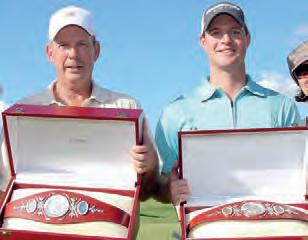
“Larry is definitely underappreciated, said McCumber. “He’s an amazing story that hasn’t been told well. He was a great ball striker, never a phenomenal putter, but he could putt. He probably had as many putters as Arnie.”
Before Nelson’s Hall of Fame election, former PGA TOUR Champions standout Gil Morgan joked about Nelson’s
penchant for arriving at the putting green before a competitive round carrying three or four putters. He would decide which one to use right before he teed off.
“You never knew what he was going to putt with,” said Morgan. “I would’ve had a hard time doing that. But when he was on, he was really good.”
Nelson’s game aged well. He collected 19 victories on the PGA TOUR Champions and won what is now called the PNC Championship, the father-son made-for-TV event, twice with son Drew (2004 and 2008) and once with son Josh (2007).
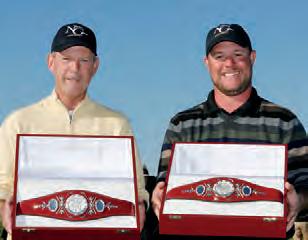
His legend lives large at elegant Atlanta Country Club, where he still plays and lives nearby. Take a right from the foyer, walk a few steps, and you’ll find a gold-colored plaque that reads, “Larry Nelson Room.” Inside is a collection of trophies, photographs and memorabilia from his career, including his 2000 Senior PGA TOUR Award, an impressive statuette of Jack Nicklaus raising his putter during the 1986 Masters. The room is basically
The Larry Nelson Museum, a tribute to a local hero although— sshhh!—Nelson was actually born in Fort Payne, Alabama, before moving to the Atlanta area at an early age.
When Nelson entertained a writer at the club for lunch,
Nelson’s game aged well. He collected 19 victories on the PGA TOUR Champions and won the PNC Championship, the father-son made-for-TV event, twice with son Drew (2004 and 2008) and once with son Josh (2007).
he instructed the server to put the bill on his account. “And my name is Larry Nelson,” he informed the young man, who tried not to grin at the obvious. Everyone at ACC knows Larry Nelson.
It’s exactly that kind of humility that can cause a man to be overlooked. It can also help him sleep better, knowing he faithfully lived Shakespeare’s words, “To thine own self be true.”
Nelson made sure to invite Hummel, his Army pal whose words steered Nelson toward golf, to the 2006 Hall of Fame induction ceremony. During basic training at Fort Hood, neither man could have imagined a game Nelson had never played would someday be his legacy.
“I always like to say I didn’t pick golf,” Nelson said, “golf picked me.”
Golf chose wisely. MT
Gary Van Sickle has covered golf since 1980 for several news outlets, including Golf World and Sports Illustrated.
ABOVE: In addion to his PGA TOUR career, Nelson found success on the PGA TOUR Champions, winning 19 times including these three (from left): 1998 American Express Invitational, 2000 Bank One Senior Championship and 2001 MasterCard Championship.
BELOW: Nelson was the recipient of the 2000 Senior PGA TOUR Player of the Year Award.
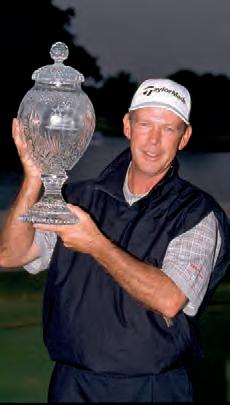
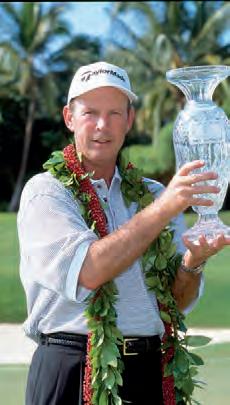
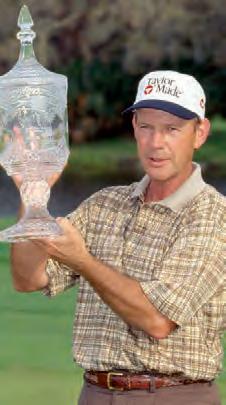
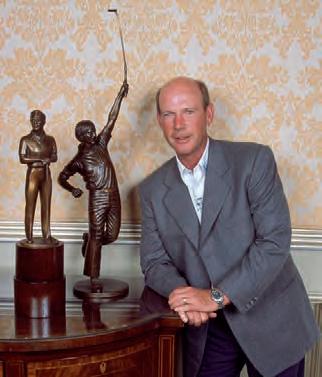












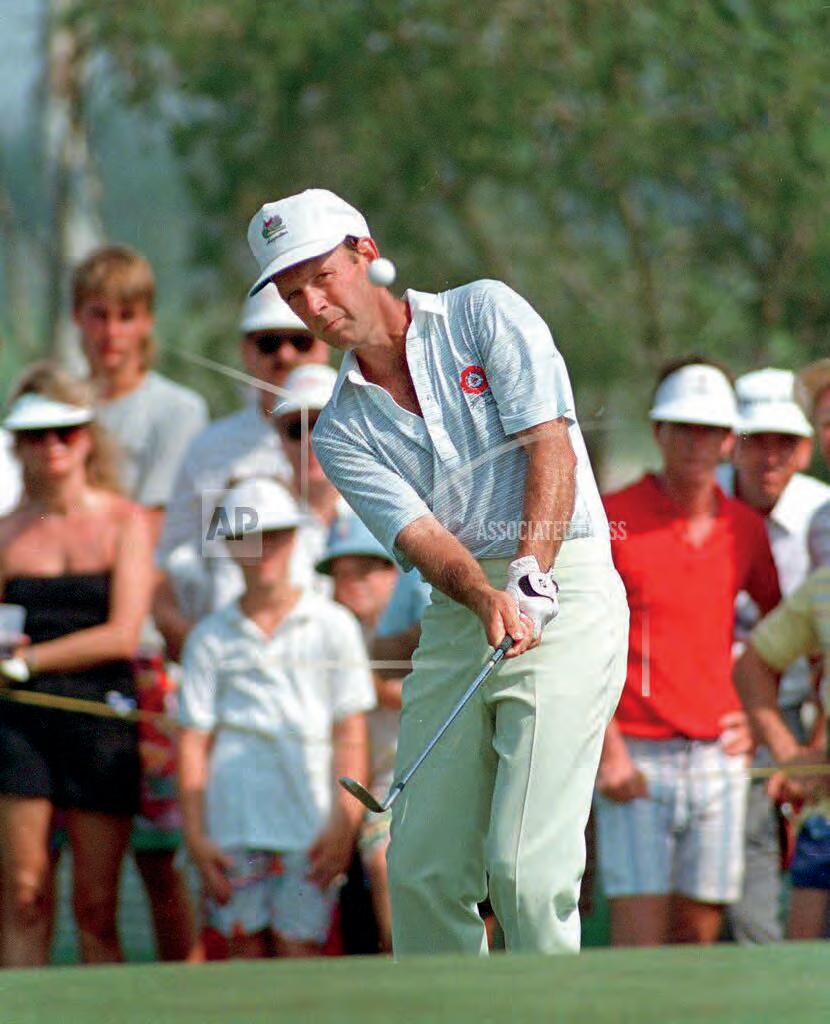
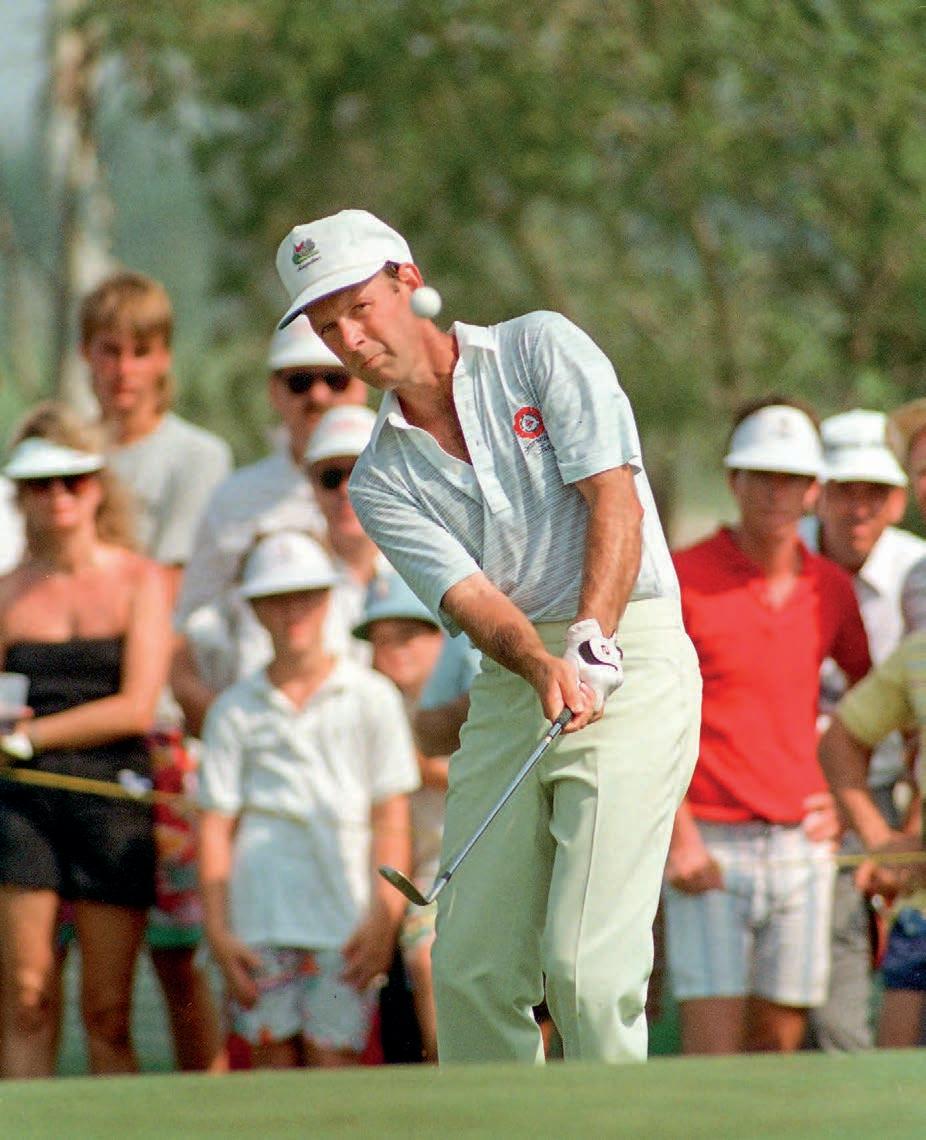
MAJOR CHAMPIONSHIP VICTORIES
1981 PGA Championship
1983 U.S. Open
1987 PGA Championship
PGA TOUR VICTORIES
1979 Jackie Gleason-Inverrary Classic, Western Open
1980 Atlanta Classic
1981 Greater Greensboro Open
1984 Walt Disney World Golf Classic
1987 Walt Disney World/Oldsmobile Classic
1988 Georgia-Pacific Atlanta Golf Classic
PGA TOUR CHAMPIONS VICTORIES
1998 Boone Valley Classic, American Express Invitational, Pittsburgh Senior Classic
1999 GTE Classic, Bruno’s Memorial Classic
2000 Las Vegas Senior Classic, FleetBoston Classic, Boone Valley Classic, Foremost Insurance Championship, Vantage Championship, Bank One Senior Championship
2001 FleetBoston Classic, SBC Championship, MasterCard Championship, Farmers Charity Classic, Royal Caribbean Classic
2003 Constellation Energy Classic
2004 FedEx Kinko’s Classic, Administaff Small Business Classic presented by KBR
INTERNATIONAL VICTORIES
1980 Tokai Classic (Japan)
1983 Dunlop International Open (Japan)
1989 Suntory Open (Japan)
1991 Dunlop Phoenix (Japan)
OTHER VICTORIES
1978 Georgia Open
1988 PGA Grand Slam of Golf
1998 Wendy’s 3-Tour Challenge (with Hale Irwin and Gil Morgan)
1999 Chrysler Senior Match Play Challenge
2004 Office Depot Father/Son Challenge (with Drew Nelson)
2007 Del Webb Father/Son Challenge (with Josh Nelson)
2008 Del Webb Father/Son Challenge (with Drew Nelson)
2015 Bass Pro Shops Legends of Golf, Legends Division (with Bruce Fleisher)
OTHER CAREER HIGHLIGHTS
Ryder Cup 1979, ’81, ’87 Posted perfect 5-0-0 record in 1979 Ryder Cup
Alabama Sports Hall of Fame 1989
Georgia Sports Hall of Fame 1994
World Golf Hall of Fame 2006
PGA Distinguished Service Award 2011

























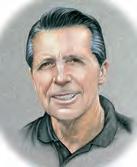
















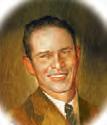






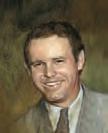

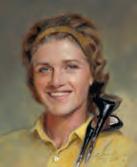
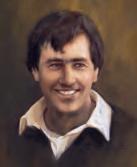







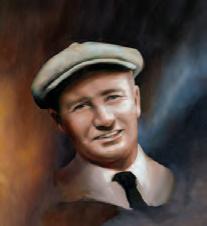
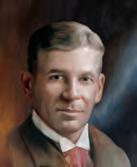


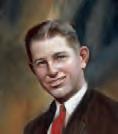



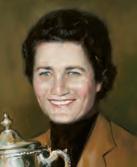


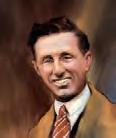








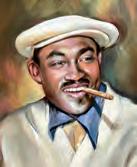



IN 1986 THE MEMORIAL TOURNAMENT ENDOWMENT was established to allow the Tournament to plan prudently for the future and to continue the development and maintenance of needed facilities. Funds generated from the endowment are used to provide new and better facilities for spectators and fans and to assure the Tournament’s support of several worthwhile charities.
EVAN J. ANDREWS
HAROLD “ANDY” P. ANDREWS
STEPHEN P. ANDREWS
GREGORY ANTHES
ABNER H. BAGENSTOSE
DONALD “RICK” F. BAIRD
DONALD “RIC” F. BAIRD III
CURT BANGLESDORF
DAVID L. BARNES
TIMOTHY J. BATTAGLIA
C. RICHARD BECKETT
WILLIAM BRADLEY BENNETT
ROBERT W. BOICH
TODD E. BORK
BARRY G. BOYLES
GEORGE P. BRAY
JAMES G. BROCKSMITH, JR.
FRED C. BROWN
JAMES B. BURKE
MICHAEL A. BYERS
CHAD N. CACCHIO
RONALD E. CALHOUN
THOMAS L. CAMPBELL
PHILIP D. CAMPISI
CRAIG CASSADY
ANTHONY T. CHAPEKIS
JOHN J. CHIMENTO
JOSEPH A. CHLAPATY
GRANT CHRISTMAN
RALPH R. CIOFFI
DAVID CLARK
STEPHEN B. CLARK
THOMAS J. CLARKE
PETER M. CLARKSON
TIMOTHY CLINKSCALES
JOSEPH P. COCHRAN
RICHARD T. COCHRAN
JACK J. CONIE III
RICHARD R. CORNA
JEG A. COUGHLIN, SR.
WILLIAM P. CSEPLO
DOMINIC J. CURCIO
WILLIAM N. DABBELT
ARTHUR J. DeCRANE
BLAKE DeCRANE
SCOTT E. DeSANO
JON P. DIAMOND
JAMES DIDION
ANTHONY DiGIANDOMENICO
CHRISTOPHER J. DONABEDIAN
ALVA N. DOPKING, JR.
THOMAS B. DYER
JAMES L. EHRET
DANIEL G. EMMENEGGER, JR.
JOHN S. ENSIGN
GREGORY ESSIG
T. WILLIAM EVANS
PHILIP G. FANKHAUSER
BRETT A. FEBUS
S. TREVOR FERGER
THE MEMBERS OF THE MEMORIAL CLUB ARE:
LARRY J. FOX
WILLIAM H. FRANZ
TAKEO FUKUI
R. WILLIAM GARDNER
JOSEPH J. GASPER
JOHN B. GERLACH, JR.
CATHY GERRING
LEONARD GORSUCH
THOMAS A. GOSNELL
KIM D. GREAVES
LOWELL “ROCKE” GREER
BRUCE R. HAGUE
JOHN R. HALEY
FRANK D. HARMON
JOHN R. HARPER
THOMAS A. HASSFURTHER
W. HENRY HAUSER
LEO J. HAWK
LAWRENCE J. HAYES
PAUL G. HELLER
JACKSON B. HERCEG
MILAN B. HERCEG
YOSHIHIRO HIDAKA
KOKI HIRASHIMA
CHRIS HITE
RALPH E. HODGES
PHILIP HOFFMAN
THEODORE J. HOST
J. PATRICK HUBER
JOHN B. HUTCHENS
J. LAWRENCE HUTTA
JAMES T. HUTTA
MARTIN INGLIS
THOMAS W. IRELAN
VICTOR D. IRELAN
C. LEE JOHNSON
JILL EVANS JOHNSON
THOMAS B. JOHNSON
FRITZ KAISER
JAMES R. KARPAC
KEN ARMEN KAZARIAN
JOHN KELEMEN III
NEIL E. KELLEY
JOHN P. KENNEDY
JOHN W. KESSLER
BENJAMIN T. KING
SAMUEL B. KING
JAMES M. KOSTELAC
THOMAS C. KRUSE
JOHN KUCHARCZYK
RICHARD S. LANGDALE
DAVID P. LAUER
PETER J. LAVERTY
LARRY L. LIEBERT
JEFFREY D. LOGAN
RYAN M. LONG
MICHAEL LONGANO
PAUL B. LOYD, JR.
CHERYL W. LUCKS
JACK E. LUCKS
ROBERT D. MacKINLAY
CHRISTIAN D. MAHER
DANIEL M. MAHER
DONAL H. MALENICK
STEPHEN J. MANGUM
JAMES P. MANOS
ROBERT J. MASSEY
JAMES A. MAXWELL, JR.
MICHAEL W. McCARTY
GEORGE W. McCLOY
RUSTY McCLURE
JOHN P. McCONNELL
LAWRENCE A. McLERNON
ROBERT D. McNEIL
JOHN T. McNICHOLAS
ROBERT S. MEEDER
URBAN MEYER
SCOTT MILLER
VAIL K. MILLER
VAIL K. MILLER, JR.
CAMERON MITCHELL
DAVID J. MLICKI
MICHAEL E. MORRISON
THOMAS E. MOSURE
KYLE J. MUMFORD
SIGMUND MUNSTER
MICHAEL R. MURNANE
MASAO NAGAHARA
DENISON “CHIP” NEALE, JR.
BARBARA NICKLAUS
JACK W. NICKLAUS
JACK W. NICKLAUS II
JACK W. NICKLAUS III
STEVEN C. NICKLAUS
THOMAS E. NOLAN
JAMES A. OBNEY
DANIEL M. O’BRIEN
H.M. “BUTCH” O’NEILL
RICHARD G. ORLANDO
NILES C. OVERLY
PETER PARAS, JR.
JOHN W. PARTRIDGE, JR.
MICHAEL C. PASCUCCI
ROBERT D. PATRELLA
DAYNA PAYNE
RAY M. PEREZ
CHRISTOPHER B. PESAVENTO
DARYL L. PETERMAN
LOYAL M. PETERMAN
CECIL J. PETITTI II
MARK PHELAN
SCOTT T. PICKETT
BENJAMIN B. PRICE
WILLIAM B. PRICE
GARY L. RACEY
STEPHEN S. RASMUSSEN
FRANK R. RAYMOND
C. MICHAEL REARDON
ADAM RICHARDS
DAVID V. RICHARDS
WILLIAM E. ROBERTS
JEFFREY A. ROBY
JOEL ROBY
JOSHUA ROBY
BRADLEY H. ROSELY
ANDREW J. ROTH
THOMAS A. RUMFOLA
L. JACK RUSCILLI
LOUIS V. RUSCILLI
ROBERT A. RUSCILLI, JR.
MICHAEL D. RYAN
TODD A. SACKETT
MARTIN L. SAVKO, JR.
MARTIN L. SAVKO, SR.
RONALD E. SCHERER
GREGORY E. SCHNEIDER
BRIAN SCHOTTENSTEIN
GARY L. SCHOTTENSTEIN
D. JAMES SCHUMER
JOHN J. SCOTT III
KEVIN SHANAHAN
STEVEN P. SHEPARD
J. ROBERT SIERRA
CHARLES M. SIMON
SAMUEL E. SMILEY
DOUGLAS A. SMITH
JEFFREY H. SOPP
DAN STERGIOU
ERIC STEWART
JEFFREY L. STEWART
JOHN C. STIEG
TYLER STIEG
NORMAN C. STRAKER
JOSEPH W. TAYLOR
DAVID T. TERRY
RAYMOND J. TESNER
CHARLES C. UNGUREAN
BRUCE L. VOR BROKER
WAYNE C. WALKER
RAY C. WASIELEWSKI
ALFRED J. WEISBROD
KENNETH J. WESTERHEIDE
RANDY WILCOX
JEFF WILKINS
EVAN A. WILLIAMS
R. MAX WILLIAMSON
JAMES L. WILMERS
JOHN O. WINCHESTER
MICHAEL A. WOLCOTT
JIM D. WRIGHT
TROY WRIGHT
DECEASED
WILLIAM E. ARTHUR ’22
JAMES M. BEARD ’12
MICHAEL J. BERKELEY ’01
L. JOHN BISHOP ’13
MICHAEL D. BLOCH ’16
MICHAEL BOICH ’01
KEN BOWDEN ’17
RUSSELL L. BOWERMASTER ’16
DAN C. BROWER ’15
CHARLES R. CARSON ’12
L. PHILIP CARSTENS ’08
RICHARD F. CHAPDELAINE ’20
CHARLES P. CONRAD ’01
MILLARD M. CUMMINS ’19
FREDERICK DeMATTEIS ’01
JOHN R. EVANS ’19
TERRY A. FRIEDMAN ’04
ROBERT P. GARDNER ’20
LOUIS M. HALEY ’06
ZEMPEI HATTORI ’01
JOHN F. HAVENS ’17
JOHN G. HINES ’14
ROBERT S. HOAG ’13
KENNETH HOULE ’98
PETER J. JOCHUMS ’21
JEFF KEELER, JR. ’05
JACK E. KING ’17
ROBERT A. LANDTHORN ’21
RICHARD A. LANG ’02
PAUL B. LONG, JR. ’23
JOHN H. McCONNELL ’08
DAN R. McFARLAND ’22
JOHN W. McKITRICK ’19
JOHN D. MONTGOMERY, SR. ’07
ROBERT T. MURNANE ’07
JAMES E. NOLAN, JR. ’14
TERENCE A. OSBORN ’19
WILLIAM D. PARKER ’20
HAROLD T. PONTIUS ’15
H.R. “BUSS” RANSOM ’21
MERWIN J. RAY ’18
S. BRADFORD RYMER ’04
KEIZO SAJI ’00
PANDEL SAVIC ’18
DAVID A. SCOTT ’03
FRITZ SCHMIDT ’17
DAVID G. SHERMAN ’10
WILLIAM E. SLOAN ’21
SAM S. STALLWORTH, JR. ’03
SCOTT W. STEARNS ’23
JAMES R. THOMAS ’12
KENNETH D. THOMAS ’13
R. DAVID THOMAS ’02
MICHIO TORII ’11
JERRY L. TRABUE ’18
DALE WADE ’98
THOMAS B. WEIHE ’21
IVOR H. YOUNG ’15
RICHARD S. ZIMMERMAN ’02
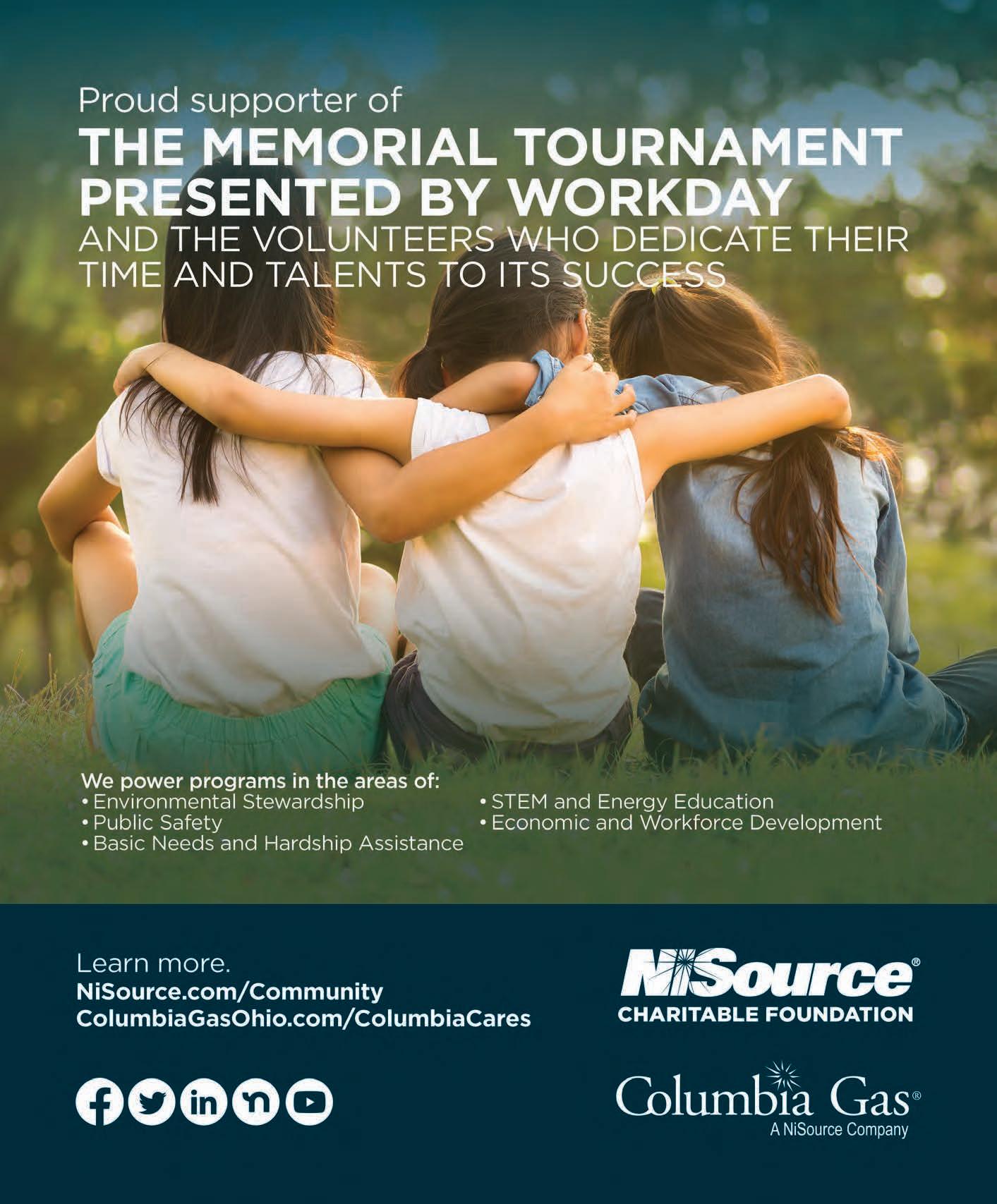
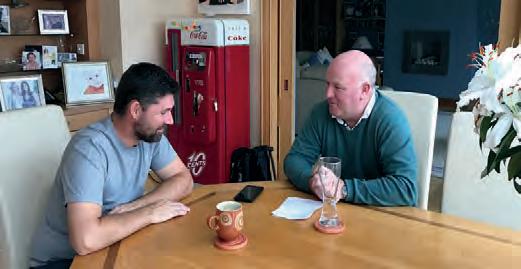 BY BOB BAPTIST
BY BOB BAPTIST
ROWING
GBARNS, a small village a few miles from the North Sea in Scotland’s East Lothian, John Huggan spent countless summer days playing as many as 72 holes with his friends at a nearby par-65 municipal course.
“There were eight par 3s, many of them over 200 yards,” he said, “so you learned how to chip and putt very quickly.”
Huggan became proficient enough at the game in his late teens and early 20s to be selected to represent Scotland and Great Britain/Ireland in various boys and youth team events. He won the Scottish Boys’ championships as a teenager, was runner-up in the 1983 Scottish Amateur, and the next year he won the country’s Universities Championship.
He had no illusions of playing the game professionally, however.
“I never felt I was that good,” he said, “and I wasn’t. I was never the best player on any of those teams; in fact, sometimes I was the worst.”
Instead, he was pursuing a business degree at a Scottish university and working in a bank when fate intervened and steered him to a career that will be recognized this week at the Memorial Tournament presented by Workday. Huggan, 62, is this year’s recipient of the Memorial Golf Journalism Award.

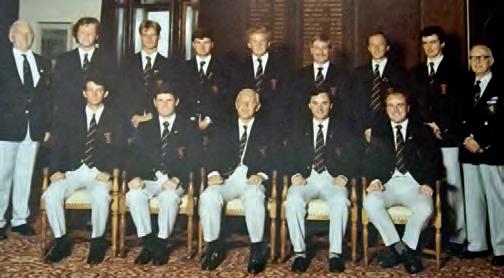
Bernard Darwin
Herb Graffis
O.B. Keeler
Henry Longhurst
Grantland Rice
Charles A. Bartlett
Pat Ward-Thomas
Tom Scott
Herbert Warren Wind
Charles Price
Will Grimsley
Leonard Crawley
Bob Harlow
William D. Richardson
Percy Huggins
Dick Taylor
Jack Whitaker
Peter Dobereiner
Dan Jenkins
Jim Murray
Bob Green
Furman Bisher
Michael Williams 1999
Bob Drum
Ronald Heager
Peter Ryde
Lincoln A. Werden
2000
Dave Anderson
Renton Laidlaw
Nick Seitz
2001
Leonard Kamsler
Michael McDonnell
Tom Ramsey
Robert Sommers
Kessler
Barkow
Parascenzo
McKay
Iwata
Chirkinian
Bowden
Dai Davies Tom Place
Ron Green, Sr.
Art Spander
Dave Kindred
Bob Verdi
Jaime Diaz 2015
Doc Giffin
2016
Rhonda Glenn John Garrity
2017
Jerry Tarde
2018
Larry Dorman Ron Balicki
2019
Peter Alliss
2020
Jim Nantz
2021
Tim Rosaforte
2022
Michael Bamberger
2023
John Huggan
“This is a special award for me, if only because of its connection to Jack Nicklaus,” Huggan said. “Where I come from, no one is admired more for the way he played golf—win or lose.”
Huggan said that he never quite understood why he had decided to study business anyway.
“A mystery to this day.”
In 1986, three years into his degree program, Huggan wrote about 50 job-seeking letters to companies that had any connection whatsoever to golf. One that replied, and invited him to interview, was Golf World UK magazine. Huggan got the job as its instruction editor—despite having zero experience in journalism. “The only thing I can say in my slight defense on that,” he said, “is that when I was in school, I was a straight-A student in English and a straight-C student in everything else.”
A year later, as part of a temporary employee swap, Huggan worked for two months in Connecticut for Golf Digest magazine, the start of a relationship between him and the influential monthly that continues today.
Huggan joined Golf Digest full time in 1988 and was the instruction editor for eight years before returning to Scotland to write for the Glasgow Herald. For two years, he worked that job while also freelancing as the European correspondent for Golf Digest and its now-defunct sister publication, the weekly Golf World.

“It kind of became too much,” Huggan said, “so I said to [Golf Digest editor] Jerry Tarde, ‘Something has to go here, and I’m afraid it’s going to have to be you, because I can’t give up this job [in Scotland].
“And he said, ‘Well, what number do we have to [reach] to make it work [at Golf Digest]?’ So I told him the number, and he agreed right away—which made me think I should have thrown out a bigger number.”
Tarde likely would have met it. He considers Huggan “one of a kind” among golf journalists. “Huggy always looked at golf from a different perspective and had the best interests of the game at heart,” Tarde said. “He is fearless as a journalist, never afraid to ask the tough questions …
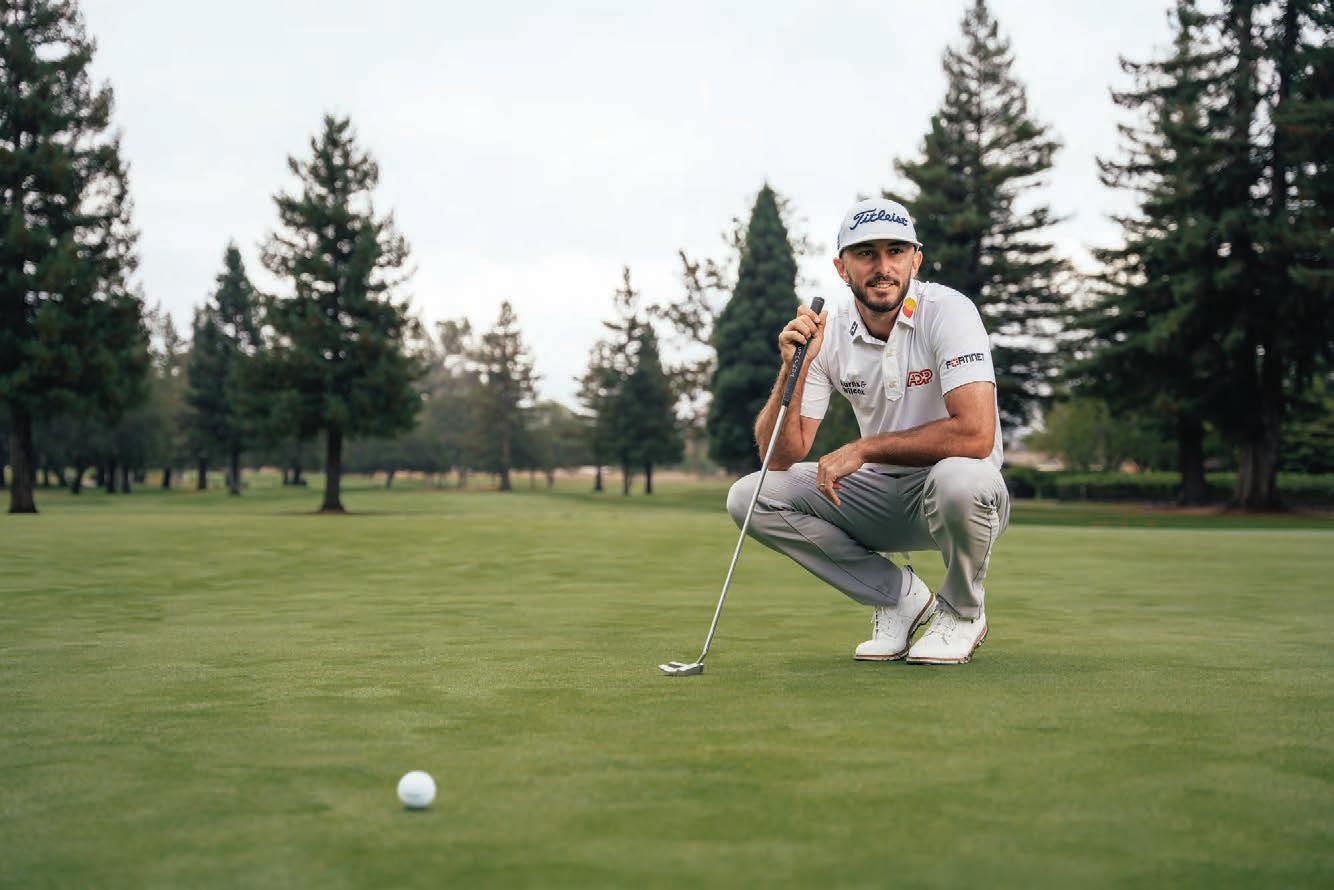
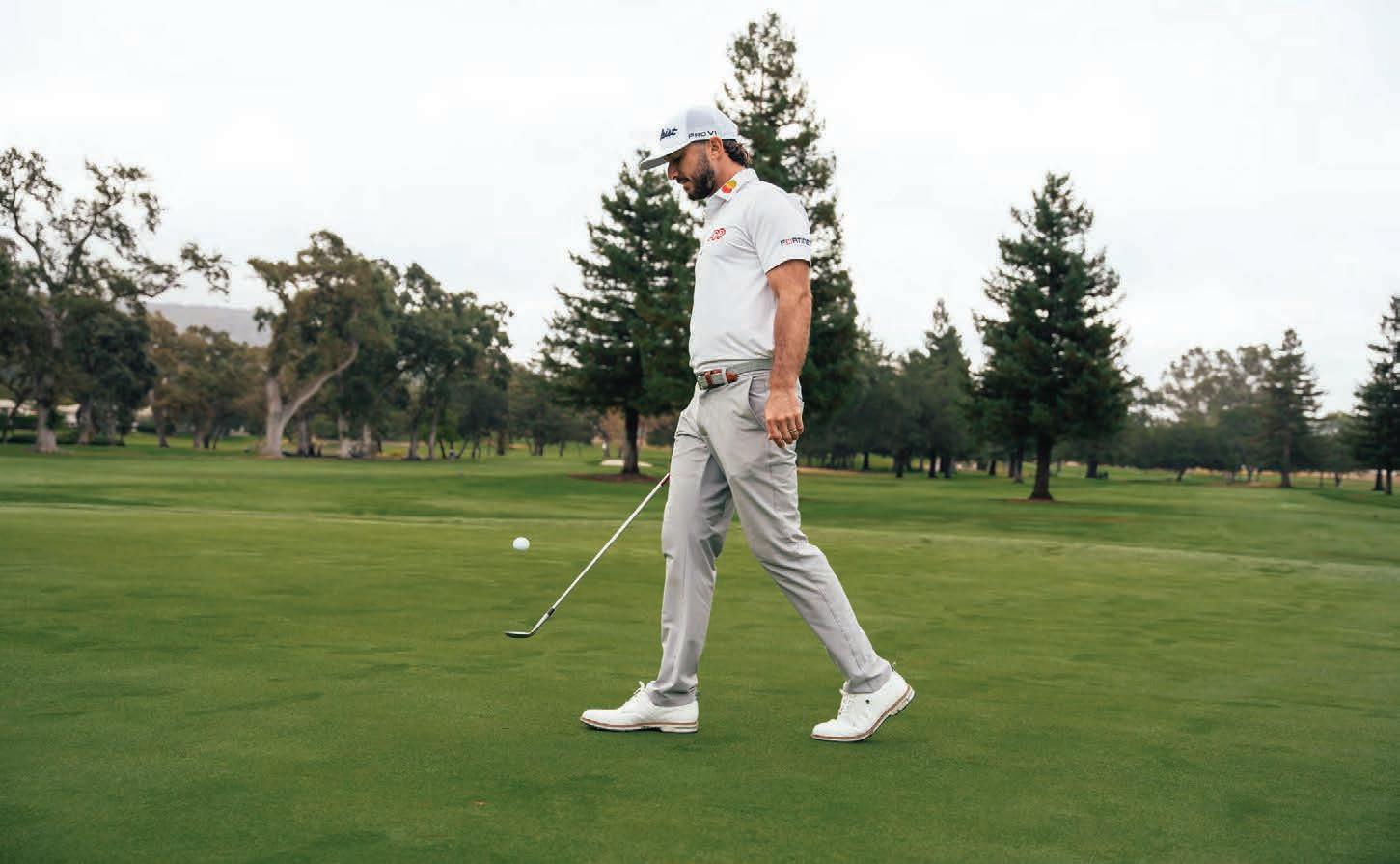
and completely understands how a good player thinks. He’s also respected by the top players who appreciate his honesty.”

That was never more apparent than in February 2022, when, in an exclusive interview with Huggan, six-time major winner Phil Mickelson first uttered the widely publicized “obnoxious greed” attack on the PGA TOUR that seems destined to define Lefty’s legacy.
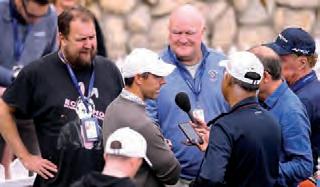









































































































“Phil used [the term] multiple times in his interview with

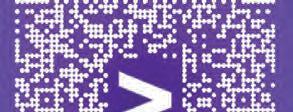


John,” Tarde said. “He wanted John to put it in his notebook, and John gave it to him.”
Huggan’s knowledge and his ability to connect with players and readers alike have served him well in his career and enabled him to survive the severe contraction of the workforce in the print journalism industry.
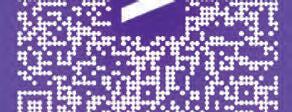
“I’ve been lucky,” Huggan said. “The deal with Golf Digest has always been there. Even by itself, it would have been enough to stay in the business and make a living. Any [freelancing] over and above that has been a bonus, I feel like. So I’ve been very fortunate.”
Some of his peers who have fallen victim to the downsizing have found homes as commentators on television, be it Golf Channel or the various networks that pay to broadcast the sport. Huggan said that’s a letter he’s never been tempted to write, nor an offer he’s had to refuse.



“Probably because [them] knowing me, I wouldn’t have lasted five minutes in TV,” he said. “I’m far too honest.” MT























The Beta District is where prototypes are tested, tweaked and honed through collaboration and feedback. We have the facilities and the community you need to make your idea ready for its public launch.


Whether you’re working on an autonomous vehicle or uncrewed aircraft, a revolutionary telehealth solution, or the next space station, you can beta test it here.


Our



FOR THE FIRST TIME IN HIS PGA TOUR CAREER, BILLY HORSCHEL WON WITH HIS WIFE AND CHILDREN IN ATTENDANCE WHEN HE CAPTURED THE 2022 MEMORIAL TOURNAMENT PRESENTED BY WORKDAY
 BY SCOTT TOLLEY
BY SCOTT TOLLEY
FIVE MONTHS AND OVER 2,900 MILES removed from the scene of his victory in the 2022 Memorial Tournament presented by Workday, Billy Horschel let his mind take a much shorter trip to recall his golf career’s scrapbook moment.
“We probably talk about it once a week,” Horschel said as he strolled the hallway of a resort in Riviera Maya, Mexico, “and I certainly think about it all the time.”
This was in early November just before Horschel was to tee it up in the World Wide Technology Championship at Mayakoba. The flashback returned him to June 5 and the final round of the Memorial Tournament that made his 2022 season among his best since joining the PGA TOUR in 2011—and certainly his best since 2014, when he won the TOUR Championship and a FedExCup title. The bridge in between was a scene that produced a cherished family photo.

When his final putt dropped on the 18th green at Muirfield Village Golf Club, giving him a four-shot victory, Horschel was mobbed by his three young children— ages ranging from 3 to 7 at the time. We are talking about the running of the bulls, family style. The little feet of Skylar and Colbie leaped and danced on the green, while 3-year-old Axel—borrowing from countless televised celebrations in sports—pointed to the sky in quiet appreciation. (OK, he was pointing to the Goodyear Blimp, but play along.) And, of course, there was his wife Brittany, a love-at-first-sight sweetheart from Horschel’s junior golf days, to coordinate the hugs and kisses.
The traditional and highly coveted handshake with Memorial Tournament Founder and Host Jack Nicklaus off the 18th green had to wait—albeit briefly.
“To me, it was all perfectly right,” Nicklaus said. “My favorite picture in golf resulted from when my son Gary ran out on the 18th green at Canterbury when I won the 1973 PGA Championship. When you see a player’s family so excited about a husband and father winning a golf tournament and they run out there and give him a big hug, I think that’s fantastic. I love it!”
The Memorial win was Horschel’s seventh on the PGA TOUR but his first with his family in the gallery. “I really wanted to get the monkey off my back,” Horschel said. “It’s sort of a running joke in our family that my wife and my kids have never been at a victory. I’ve just always wanted that one moment where my family runs out, the kids run out, that I can always look back for many years to come, and they can look back at for their entire life, of being on the green and congratulating their father for a victory. So, it’s special to have that video and those photos for the rest of our lives.”
“This is the Memorial Tournament,” Jack interjected. We own that footage. You’ll have to buy it.”
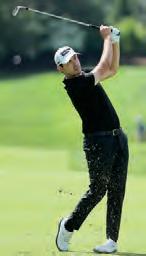
Jack’s kidding aside, it was priceless.
It would be natural to think that a 4-shot win was the exclamation point on a walk in the park. But nothing comes easy on the PGA TOUR, and Muirfield Village is not your average walk in the park. Just a year after Jon Rahm built a 6-stroke Saturday-night

 Aaron Wise (top) shot a 3-under-par 69 on Saturday and eventually finished sole second; Patrick Cantlay (middle), the 2019 and 2022 Memorial winner, tied for third place with Joaquin Niemann (below).
Aaron Wise (top) shot a 3-under-par 69 on Saturday and eventually finished sole second; Patrick Cantlay (middle), the 2019 and 2022 Memorial winner, tied for third place with Joaquin Niemann (below).

Since 2014, NetJets has proudly served as the Official Private Jet Provider of the PGA TOUR®. With a fleet of more than 900 aircraft, NetJets delivers seamless access to those with even the most demanding lifestyles. Get details at netjets.com.


lead—only to get a gut punch off the 18th when he was told he had to withdraw because of a positive COVID-19 test— Horschel built a lead of five strokes through 54 holes.
It was a cushion by way of a third-round 7-under 65. He carded seven birdies and finished the day on a streak of 44 consecutive holes without a bogey to post 13-under 203. Aaron Wise of Canada and Cameron Smith of Australia were the closest pursuers after 69 and 72, respectively.
Smith had been among six players who held a share of the first-round lead with a 5-under 67, while Horschel opened with a 70. The talented 28-year-old Aussie added a second-round 69 to forge ahead by a stroke in his quest to join Tiger Woods as winners of THE PLAYERS Championship and the Memorial in the same year. Horschel, meanwhile, whose best previous Memorial finish in eight starts was a tie for ninth in 2019, edged closer with a 68.
“I just have to go to the [first] tee understanding I’m leading the Tournament,” Horschel said after his Saturday 65. “I’m not going to be protective; I’m not going to be overly aggressive. I’m going to play the way I have the last three days.”
Horschel’s gaudy streak of consecutive holes without a bogey stretched to 49 on Sunday before ending on the sixth hole. Meanwhile, he didn’t make his first birdie until the 10th hole. By the time he finished the par-3 12th, where he had to scramble for bogey, Horschel’s lead had dwindled to two over Wise.

Some players might panic. Not Horschel, who admits that he’s a grinder, a “guy who doesn’t mind if it’s not pretty. As long as it gets the ball in the hole with the least amount of shots, that’s all that matters.”
He had further grinding to do when he holed parsaving putts of 12 feet on the 13th hole and 8 feet on 14. Then came the par-5 15th, which the Golden Bear redesigned after the 2020 Memorial to facilitate more drama. He got his wish. Sitting 241 yards from the front of the green, Horschel carved a “perfect” 5-wood that rode the slight wind off the left and carried onto the putting surface.
“You played two beautiful shots,” Nicklaus said to
“[I’m a] guy who doesn’t mind if it’s not pretty. As long as it gets the ball in the hole with the least amount of shots, that’s all that matters.”
—BILLY HORSCHEL

Horschel after the round. “Probably only about 10 guys that can hit that green today.”
“Just like you, big man,” Horschel, smiling wide, replied to the Tournament host.

His third shot also was beautiful, a right-to-left bending putt from 55 feet that dropped for eagle. Horschel reacted by stretching out both arms in celebration. “If I had to do something special, I was ready for it,” he said.
Especially after Wise, who along with Joaquin Niemann was the only player to apply significant pressure on Horschel, stuffed a wedge to 2 feet on the 15th hole for a sure birdie.
“That was icing on the cake to make eagle,” said Horschel, who then had a relatively stress-free final three holes to card an even-par 72 and 13-under 275 aggregate total.
Wise bogeyed the final hole for a 71 on a Sunday so difficult that no one shot better than 69 and finished second at 279.
Niemann and two-time Memorial winner Patrick Cantlay also closed with 71 to share third at 281.
For Horschel, a man of modest superstitions such as carrying four tees and a 1936 quarter in his right-front pocket, if there were any thoughts—real or imagined—that he couldn’t finish atop a PGA TOUR event with his wife and kids just outside the ropes, they were exorcised under a stampede of little feet on the 18th green here at Muirfield Village.
“I love when a family can be part of a celebration,” Nicklaus said. “Wives and children are always there, supporting these players. PGA TOUR golfers are away from home a lot, and their families miss them. So if the wife and children are fortunate to be there when they win, well … it’s picture perfect.” MT
“That was icing on the cake to make eagle.”
—BILLY HORSCHEL

Central Ohio has been our home for more than 30 years. We’re happy to support this great community where we live and work. IGS.COM

BILLY HORSCHEL flips out his phone and loads up the video of his three kids rushing on to the 18th green at Muirfield Village Golf Club after his winning putt drops at the 2022 Memorial Tournament presented by Workday. There’s Skylar, his oldest, and sister Colbie dancing on the green— “Daddy, did you really just win?” they squealed with delight and jumped with joy—and youngest son, Axel, locked on his dad’s leg and pointing upward to the Goodyear Blimp. Under a soft blue sky, here comes wife Brittany to give Horschel a congratulatory kiss before he receives the famous handshake from Tournament Founder and Host Jack Nicklaus. A whale-wide grin plasters Horschel’s face.
It’s a moment stuck on repeat in his memory bank, but that doesn’t stop the rush of endorphins and the goose bumps on the back of his neck every time it plays. Indeed, it will be hard to top Horschel’s seventh PGA TOUR victory, which may serve as the ultimate proof that he’s grown into the golfer that he’s always wanted to be.
“I have a very good understanding how to win golf tournaments,” he said in his winner’s press conference.
With his third trophy worldwide in 15 months, Horschel backed up those words, but it wasn’t always that way. Horschel has never been short of confidence. As a youngster, his father said he wouldn’t take him to play Summit View Golf Club, the 2,611-yard, par-58 executive course located five minutes from home until he cleared the 110-yard carry over their backyard creek. Challenge accepted.
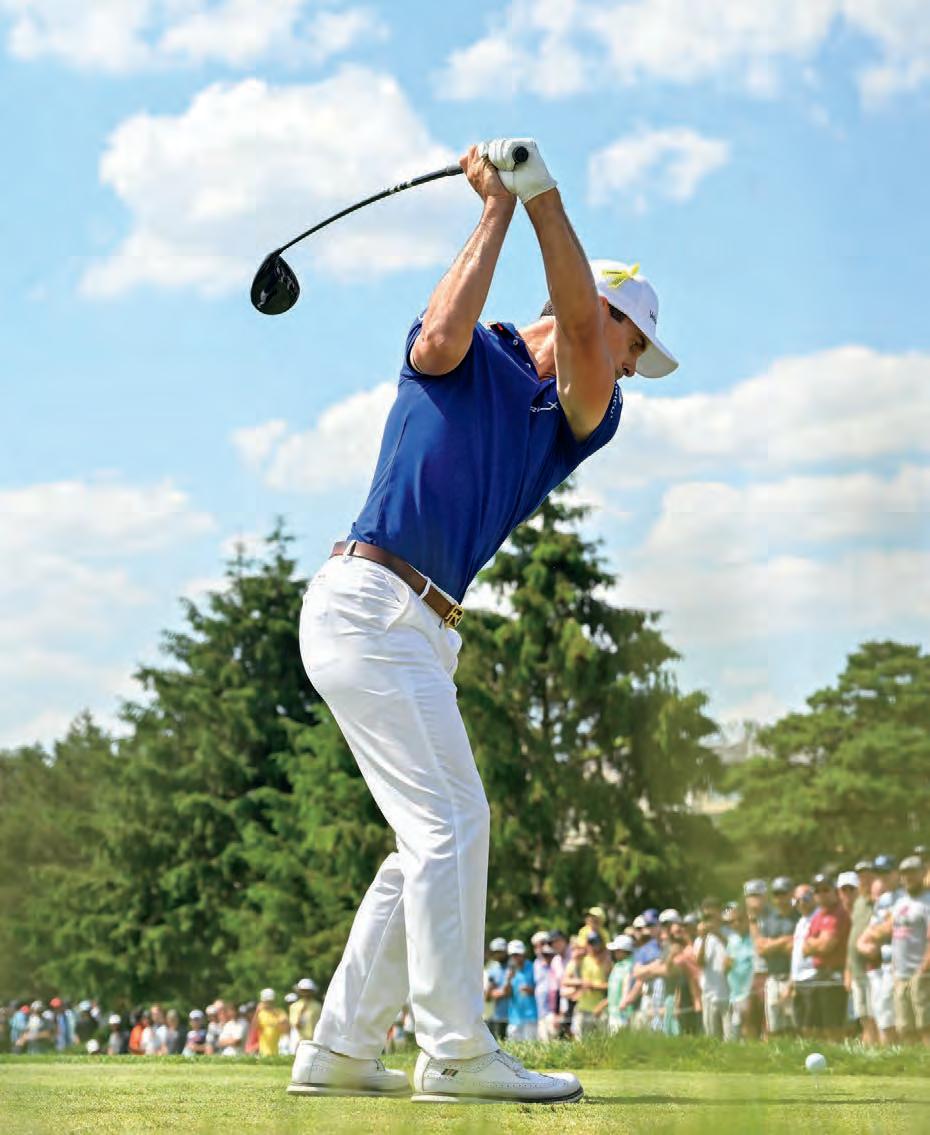
“I waited out on the driveway after I did it for I don’t know how long,” Billy recalls.
Then his father upped the ante: He had to loft a shot over the house. Horschel did that too, but it’s his next swing he remembers vividly. Attempting to hit from the backyard to the front, he smashed a living room window. When confronted by his father, he did what any young boy would do.
“I blamed it on my younger brother,” Horschel said.
When the laughter fades, Horschel continues talking about his blue-collar background and how his upbringing instilled the values of work and perseverance. His father was a foreman for a local construction company, and before that part of a crew that put up dry wall and framing; his mom went back to college at age 50 to get her college degree while working full time for a military company. As he puts it, “I am who I am because of where I come from.”
Growing up in Grant, Florida, Horschel wasn’t a prized high school recruit. In his own words, he was good, but nothing special and had only one scholarship offer, to Brevard Community College. University of Florida men’s golf coach Buddy Alexander determined another recruit was blessed with a better swing than Horschel’s, but there was something about Horschel and his confidence that Alexander liked. He followed his gut and awarded Horschel a book scholarship, the equivalent of $400 for the semester.
“That’s got to be one of my better decisions,” Alexander said.
Horschel ’s game quickly flourished as he worked tirelessly on his wedge game in particular, earning first-team All-America honors, and he qualified for the U.S. Open at Winged Foot in 2006. “That was the first time I felt like this PGA TOUR dream of mine could come to fruition,” he said.
“He just knew exactly what he wanted to do and where he wanted to go, and that was play on the PGA TOUR,” Alexander recalls.
Yet for a time, Horschel was always one loose swing or bad break away from self-combustion. His coach knew it spelled trouble and hounded him to control his emotions.
“It was a process,” Alexander said. “I wanted him to put his clubs in the bag instead of slamming them in there, and before that I wanted him to slam the clubs in the bag instead of throwing them up the fairway.”
As a three-time first-team college All-American and Walker Cup player, Horschel seemed destined for stardom when he turned pro in 2009. Surgery to his left wrist spoiled his rookie campaign early in 2010. When he returned, he struggled to keep his card the next two years. A body of evidence had begun to accrue, leaving some to question whether he had that closer’s instinct. His performances during crunch time—he ranked 108th in 2013 in final-round scoring
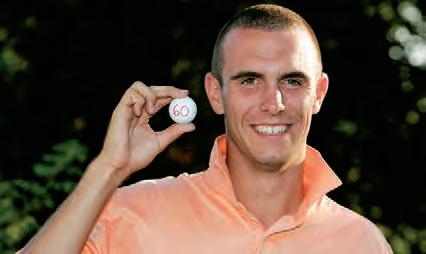 Billy Horschel displays his golf ball from his USGA-record-setting round of 60, shot at Chaska Town Course in the first round of stroke play at the 2006 U.S. Amateur.
Billy Horschel displays his golf ball from his USGA-record-setting round of 60, shot at Chaska Town Course in the first round of stroke play at the 2006 U.S. Amateur.
… Horschel wasn’t a prized high school recruit. In his own words, he was good, but nothing special and had only one scholarship offer, to Brevard Community College.USGA/JOHN MUMMERT
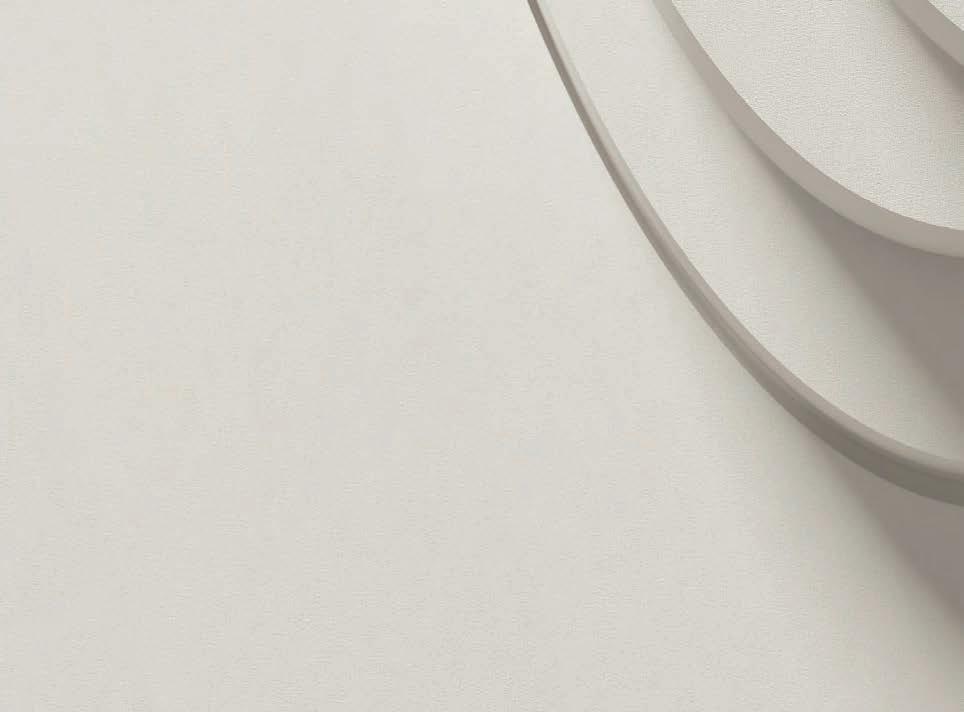

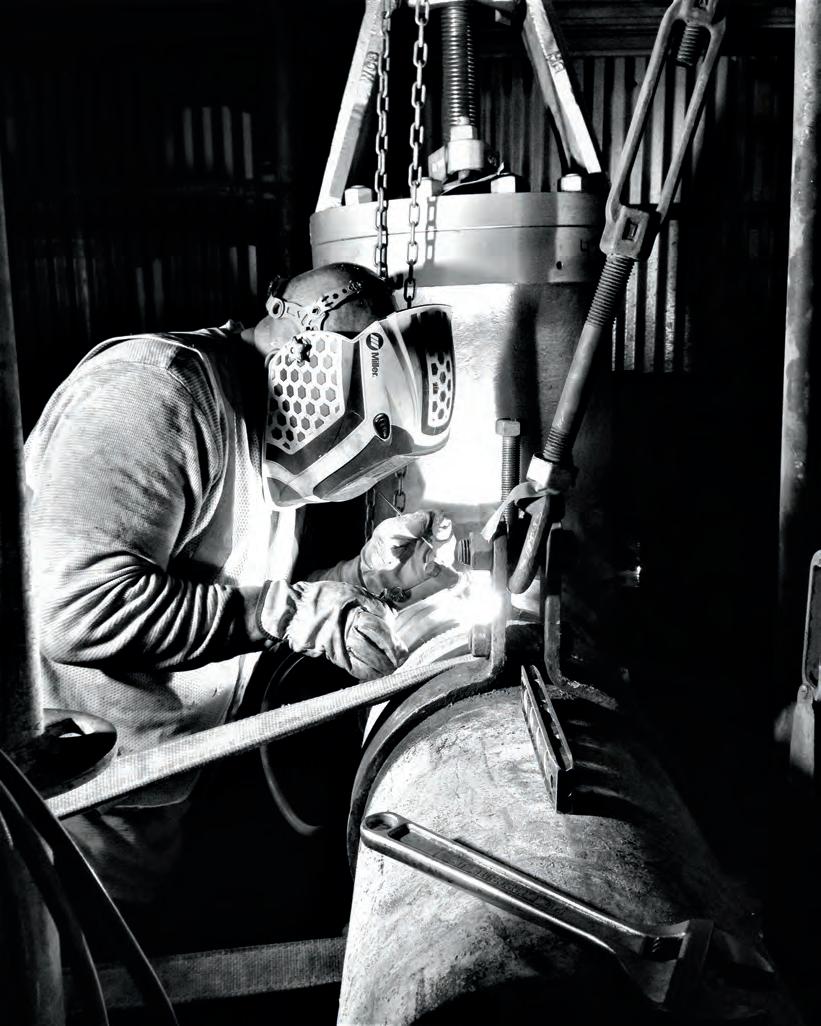

(71.55)—suggested he had yielded to nerves on occasion.
“Like my legs weren’t under me,” he said after blowing a 54-hole lead at the 2013 Valero Texas Open. “Everything felt like Jell-O.”
Horschel never doubted he had the ability to win, and in the final round of the 2013 Zurich Classic of New Orleans, he strung together six straight birdies to take the lead. Only D.A. Points, playing in Horschel’s group, kept pace. A playoff loomed unless Horschel could hole a 27-foot birdie putt at the last hole.
“I saw the line right away and I was like, ‘You know, if it’s my time, this putt needs to go in,’ ” Horschel said.
When the winning putt fell, Horschel was unable to restrain his excitement. He punched the air repeatedly, then bowed his head and buried his face beneath his cap. His eyes
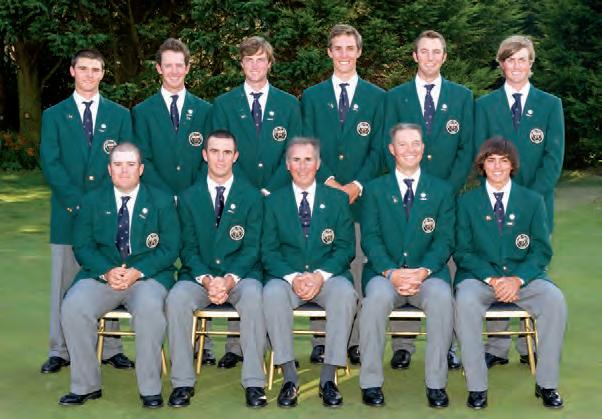
grew cloudy with tears. He’d broken through, but there were more lessons to be learned on the art of winning.
Take the 2014 Deutsche Bank Championship. With a chance to claim the title, Horschel fatted a 6-iron from the middle of the fairway at the 72nd hole into the marsh fronting the green and lost the tournament. Anderson, who has been a constant throughout Horschel’s professional career, sanding down the rough edges of his game without sacrificing any of his joy and energy, called Horschel that night to dissect what went wrong and check on his pupil’s mindset. He shared that he noticed Horschel had abandoned his routine and his swing was a little quick but waited to hear Horschel’s assessment.
“He doesn’t take losing well, and there was a moment when I thought he would be down and disappointed and all that, but he took a negative experience, learned from it, and
“I saw the line right away and I was like, ‘You know, if it’s my time, this putt needs to go in.’ ”
—BILLY HORSCHEL
WE VOLUNTEER FOR THE COMMUNITY, FOR THE GAME AND FOR THE FAMILIES SERVED BY NATIONWIDE CHILDREN’S HOSPITAL
The Memorial Tournament presented by Workday is made possible by thousands of volunteers. Join us in celebrating their passion and dedication through the Volunteer of the Year Award.
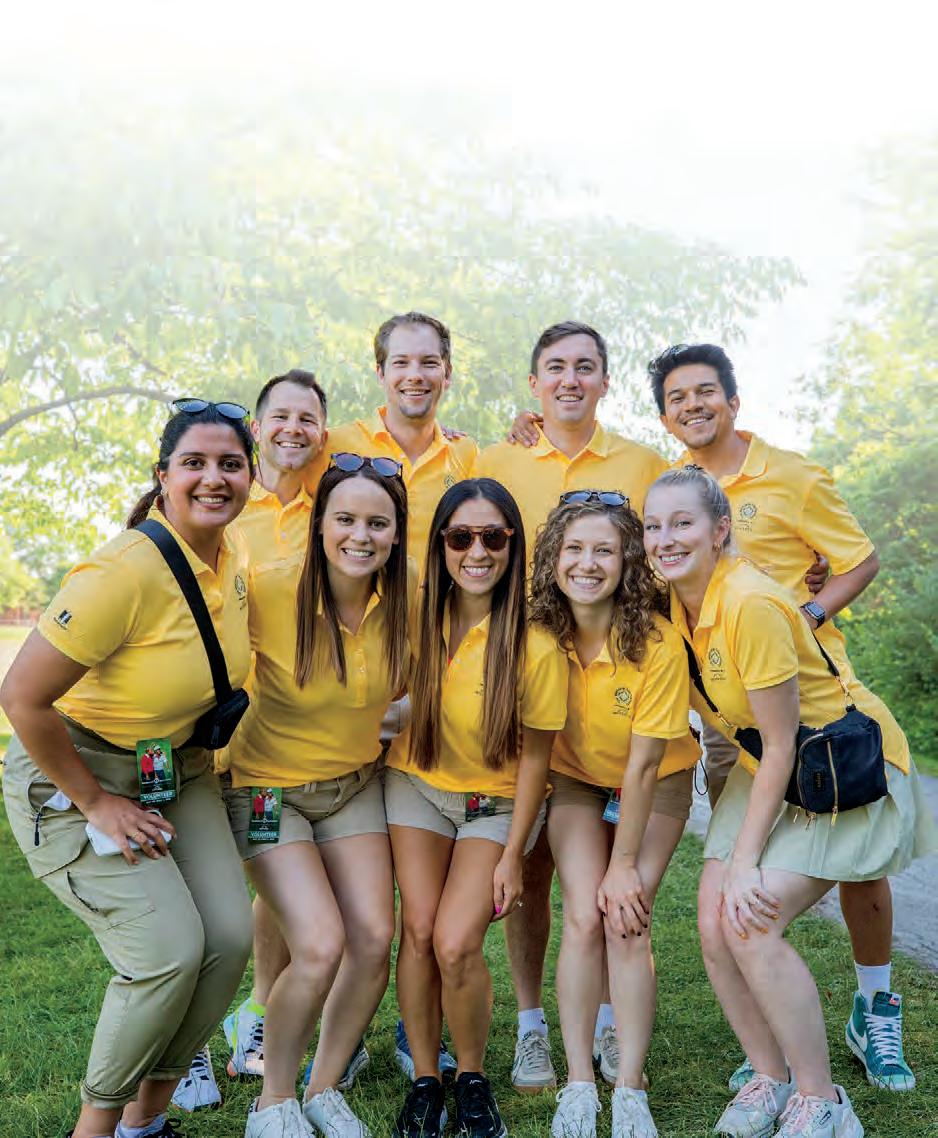 FOUNDATION
FOUNDATION
used it as motivation and goes and wins the next two weeks [BMW Championship and TOUR Championship] and the FedExCup,” Anderson said.
Horschel said it was all part of his process of learning how to handle his emotions. That outgoing, over-caffeinated intensity is a product of the nervous energy and anxiety that fuels him. “We’re not trying to control the emotions, we’re trying to process through them,” said Bhrett McCabe, who has worked with Horschel on the mental side for the past five years.
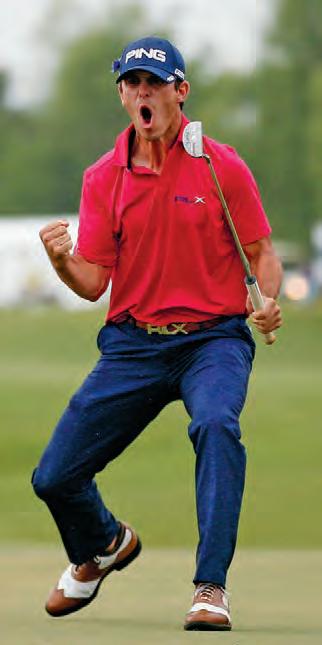
Horschel has studied some of the best closers, none more so than Tiger Woods, who dissected Muirfield Village Golf Club five times on the way to victory and gave a blueprint on how to maintain a judicious balance between boldness and good sense.
“I’ve learned from watching Tiger and tried to execute when I have a lead the way Tiger would,” Horschel explains. “I’ve thought, ‘How would Tiger try to hit this shot if he was in my shoes?’ For example, at No. 9 at Memorial, the pin is all the way back right [on Sunday]. I hit a good drive and had a wedge shot in. You always want to be aggressive when you have a wedge in, but if you hit it 2-3 yards right, you’re in the water. Where would Tiger try to hit the wedge shot? Probably 15-18 feet short, left of the hole. I have those thoughts. He’d try to put the ball where he gives himself a chance for birdie but not add pressure on himself to try to get up and down for par or make a mistake.”
Despite missing the cut a week earlier, Horschel arrived at the Memorial Tournament with visions of greatness.
“I called him ahead of the Tournament, and he said, ‘I’m just going to win this thing. I’m just going out there with that attitude,’ ” McCabe recalls. “When he gets in that singular focus, look out.”
Horschel essentially won the Memorial on Saturday, imposing his will on one of golf’s great cathedrals to the tune of 7-under 65.
“Going into the final round with a five-stroke lead, there is only one outcome that is any good. If you win, you’re supposed to, but if you lose, you’re a choker. I hate that term,” McCabe said. “Billy knew that guys were likely to charge
because they had nothing to lose. The natural tendency is to hold back and protect.”
Indeed, there were a few dicey moments for Horschel on the way to claiming the trophy. His streak of 49 consecutive holes without a bogey ended on the sixth hole. He failed
“I’ve learned from watching Tiger and tried to execute when I have a lead the way Tiger would...” —BILLY HORSCHEL


to make a birdie until the 10th hole. He had to scramble for bogey on the par-3 12th and his lead dwindled to two over Aaron Wise.
Horschel was acutely aware of what was at stake for him. He had been the 54-hole leader at the Arnold Palmer Invitational in Orlando in March, just a two-hour drive from his home where his whole family was gathered. But his concentration in the final round waned. He never felt comfortable, playing his first 10 holes in 5 over and missing a 33-foot birdie putt at 18 that would have forced a playoff. This time he was confident it would be different.
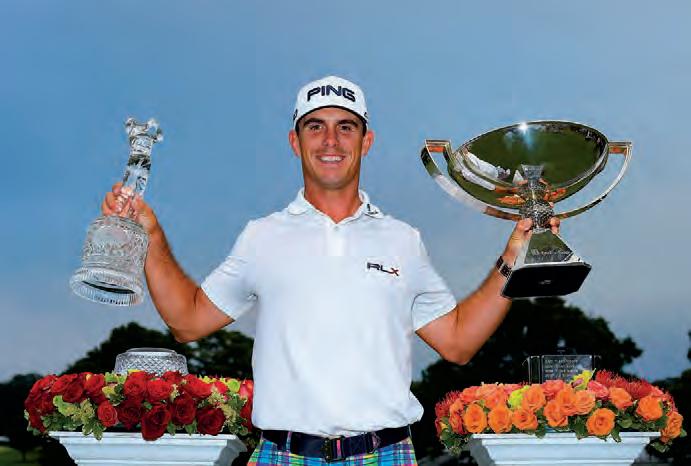
His family had outgrown connected rooms at a hotel, so for the first time Horschel rented a home with his parents just off the fifth hole at Muirfield Village. From Saturday night and into the morning and throughout the round, he had been contemplating what it would be like to celebrate a win with the family. “Some would say don’t focus on it. I like to address the
situation,” he said. “If I win today, I get to accomplish what I’ve always dreamed of doing since I started having a family. I was going to make sure I got it done this time.”
He averted trouble with clutch par putts of 12 feet on the 13th hole and 8 feet on 14. Then he curled in a 53-foot eagle putt at 15 and lifted both arms to the heavens.
Horschel capped off a banner year by finally being selected for the U.S. Presidents Cup team. Patriotism burns in him like a blue flame, and now his heart is set on making the Ryder Cup team this year.
“I think playing in his first team event just fuels the fire to want to do it again,” said Anderson.
Winning the FedExCup and a $10 million payday at age 28 meant he could buy his brothers shiny new cars, a house for his parents when they retired and treat Alexander to a week at the British Open, but it hasn’t made Horschel complacent. If anything, it’s freed him up to dream big. Horschel doesn’t




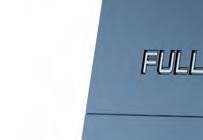





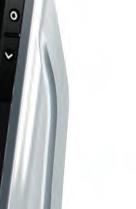
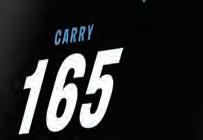




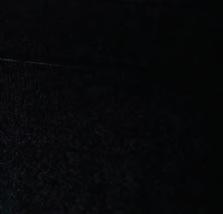

It’s your choice with Full Swing if you want to improve on the range like Tiger with our Full Swing KIT launch monitor or head home to use our Pro 2.0 Simulator trusted by multiple major champions like Jon Rahm.

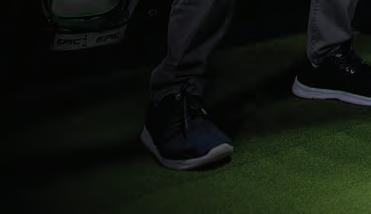


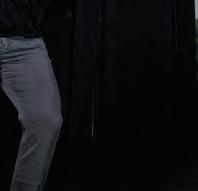
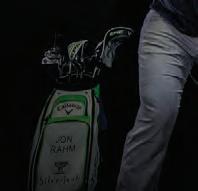

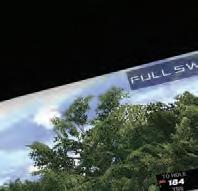
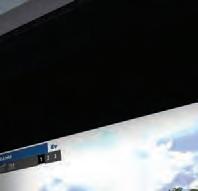
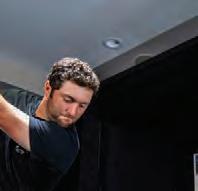
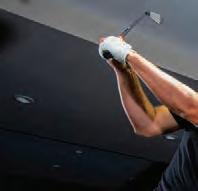
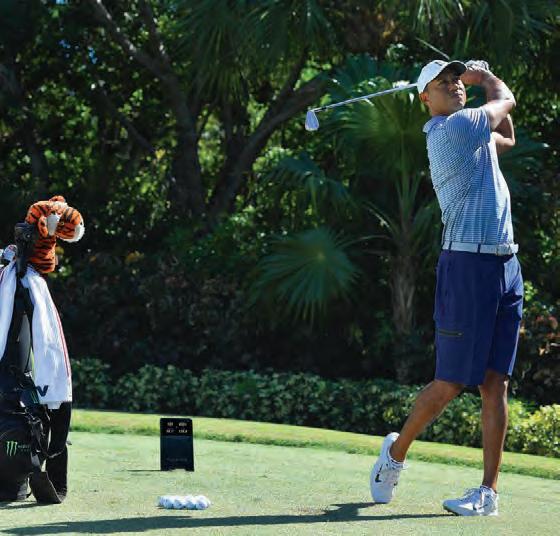
just want to achieve 10 career wins, he wants to win 15, if not 20 times so he can be a lifetime TOUR member. He’s always dreamed of winning all four majors and is confident he’s got at least two in him.
“I want to do things others haven’t done before,” he said. “That’s always been what drives me. That’s how you get remembered.

“I’ve always wanted to be the No. 1 player in the world,” he added. “I’d rather be able to say I reached my full potential as a player and got every ounce of talent out of me. If that meant I only got to No. 3, I could live with that.”
Horschel, who to date has reached a career-best of No. 11 in the world, concedes his goals are ambitious, but notes, “That’s why they are goals. If you don’t set them high, then what are you really working for?”
Ever since the birth of Skylar, he’s worked hard and made sacrifices to make his dream come true of winning in front of his children. Was it as good as he had hoped it would be?
“Better,” he said. “I didn’t see my little guy [Axel, 3 at the time]. As soon as he saw the ball go into the hole, he started running. I shook Aaron Wise’s hand and as I was shaking his caddie’s hand, he wrapped his arms around my legs. I could see my middle one [Colbie] come running at full speed, and behind them I could see Skylar, my oldest, her face was all red and she was crying. Then to have my wife right behind them all, that was awesome. The hug on the green and to see all their excitement for me winning. They are already saying, ‘Daddy, you’ve got to win again.’ ” MT
Adam Shupak is a senior writer with Golfweek.“I want to do things others haven’t done before. That’s always been what drives me. That’s how you get remembered.”
—BILLY HORSCHEL


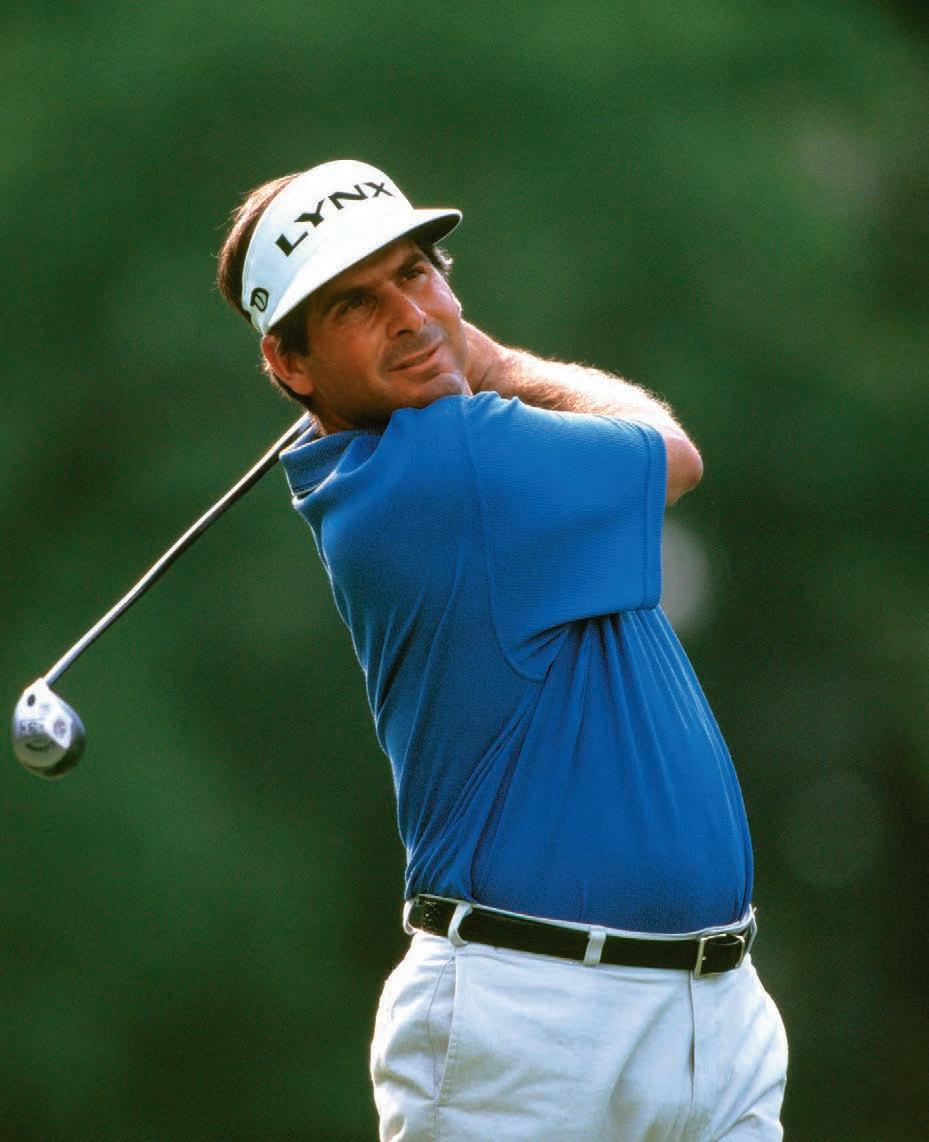
RETROSPECTIVE: 1998 MEMORIAL
TWO VICTORIES at Muirfield Village Golf Club achieved 15 years apart are among the most cherished in Fred Couples’ Hall of Fame career. The two wins assuage the disappointment for the one that got away, the one that still makes the ultra-cool golfer … well, less cool.
“It was hard to get over, because it meant a lot to me to win Jack’s Tournament,” Couples said, referring to the weather-shortened 54-hole edition of the 1990 Memorial Tournament in which he double-bogeyed his final hole on Saturday and never got the chance to atone for it. “It was a bad deal. I kind of took it personally. So, I didn’t go back for a while. It stung me.”
One of the most talented natural athletes in the game’s annals, Couples had opened the 1990 Memorial with a 3-under 69, the only score of par or better amid a chilly, windy day when the field scoring average soared to a record 78.792. Tournament Founder and Host Jack Nicklaus at the time considered it the finest round he’d seen at Muirfield Village, given the weather. Couples surged to a record four-stroke lead, and he remained out front right up until hooking his tee shot on the 18th hole in the gloaming late Saturday. His ball was never found, and the subsequent double bogey dropped him two strokes behind Greg Norman, who was declared the winner when the final round was washed out the next day.
Couples, who won the 1992 Masters, returned to Muirfield Village only once between ’90 and ’98. He obviously missed it. Solid rounds of 68 and 67 to start the 23rd Memorial propelled him to a familiar place—in the lead, which he shared with Len Mattiace. Despite a throbbing headache, he
posted another 67 to take a three-stroke lead over first-round co-leader and good friend Davis Love III at 14-under 202 in what had become a shootout as a rain-softened Memorial course yielded 31 sub-70 scores. “That was probably one of the best rounds I played given how awful I felt,” Couples recalled. “I thought I was going to go out and shoot a million.”
Andrew Magee threatened early in the final round, but Couples held steady, built his lead to four strokes at the turn and won by that margin after a 69 and 17-under 271 total.
Fast forward to 2013 and Couples was serving for a third time as captain of the U.S. Presidents Cup team here at Muirfield Village. He had succeeded Nicklaus as America’s leader in 2009 and had proven to be an effective and inspiring manager. The U.S. won all three times under Couples, capped by an 18½-15½ decision, a victory that provided another level of satisfaction.
“Shaking Jack’s hand in 1998, that was special, but I was kind of overwhelmed in the moment, and I wish that I would have kind of lingered there with him,” Couples said. “So to go back as Presidents Cup captain and get another win, I made sure to really take it in.”
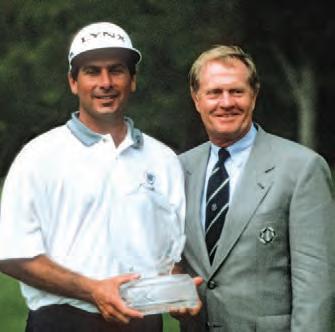
Inducted into the World Golf Hall of Fame in 2010, Couples won 15 PGA TOUR titles and owns another 14 wins— and counting—on the PGA TOUR Champions, including a memorable victory last fall in the SAS Championship when he fired a career-low 12-under 60 at Prestonwood Country Club in Cary, North Carolina, for his first win in five years.
The month before that performance, Couples served as an assistant captain to Love on the U.S. Presidents Cup team at Quail Hollow Club in nearby Charlotte, the sixth time he had been an assistant captain on a Ryder Cup or Presidents Cup team. All but once, in the 2012 Ryder Cup, the U.S.
“Shaking Jack’s hand in 1998, that was special, but I was kind of overwhelmed in the moment, and I wish that I would have kind of lingered there with him.”
—FRED COUPLES
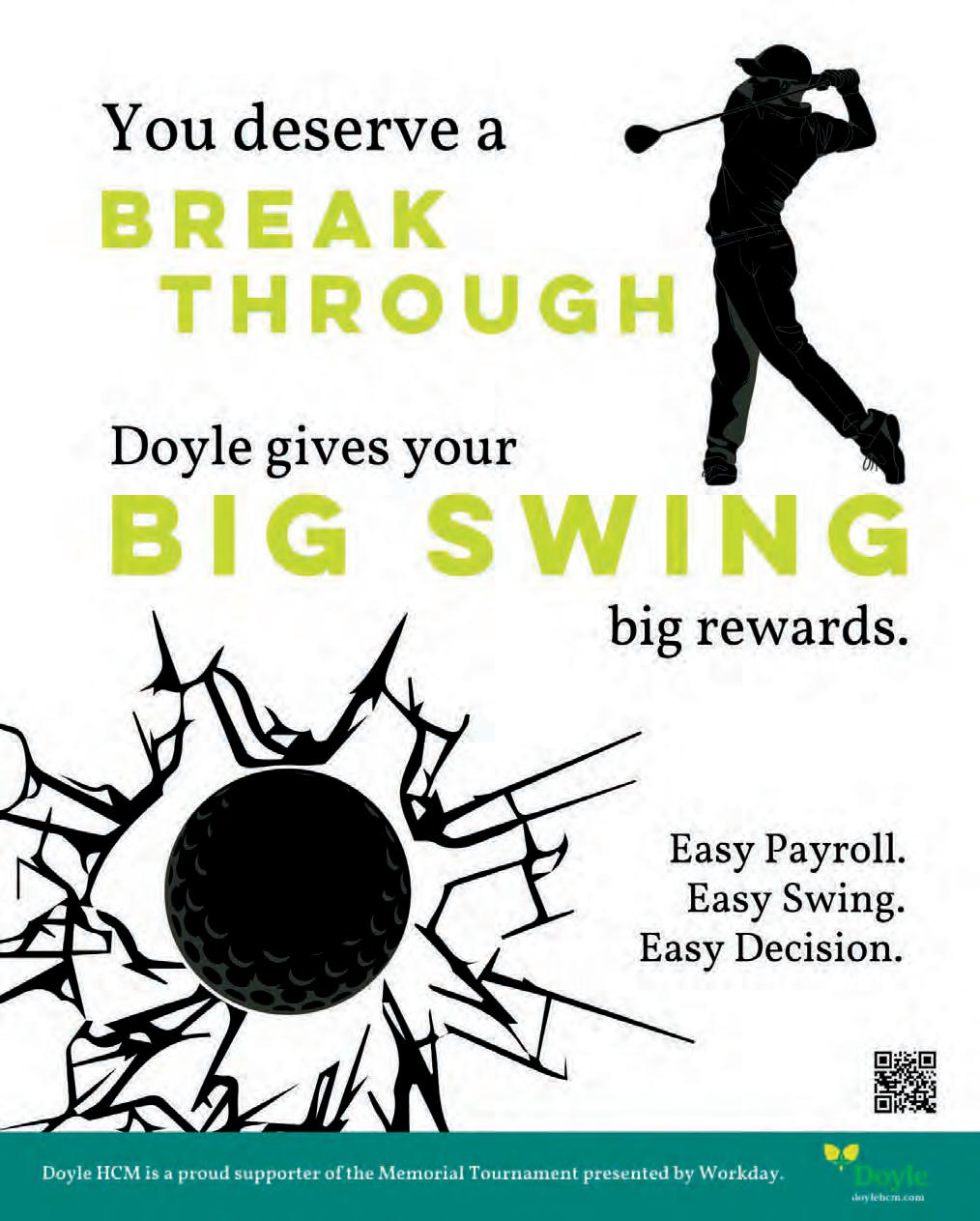
ended up winning. He has forged an identity in his later years as an integral figure in U.S. team rooms, not necessarily a Captain America type, but a captain for all American golfers. Few men connect better with peers and young players, applying his old-style cool and keen acumen to subtly inspire and motivate.
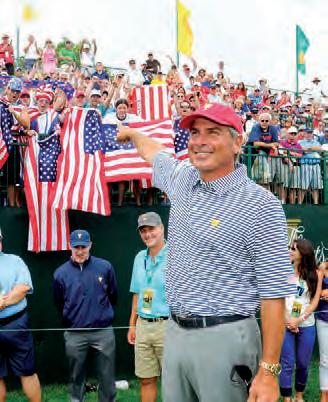
“I personally vote Fred on every team possible until he dies,” Justin Thomas said in Charlotte. “I mean, he’s the greatest. He’ll shoot you straight. He can get serious with you. He can also kind of poke fun and joke with you. He just brings a great dynamic.”
“We all love being around Fred. He’s very calm, relaxed, rubs off on everybody,” said Steve Stricker, the 2011 Memorial Tournament winner, who retained Couples as one of his assistants for the 2017 Presidents Cup and the 2021 Ryder Cup, both blowout victories.
“I’ve just been very lucky, and I’ve been a part of teams where we had great players. The talent has been unreal,” Couples said, accepting, hesitantly, his identity as one of the most successful team captains golf has known. “I’ve always felt I knew when to tap a guy on the shoulder or kick another
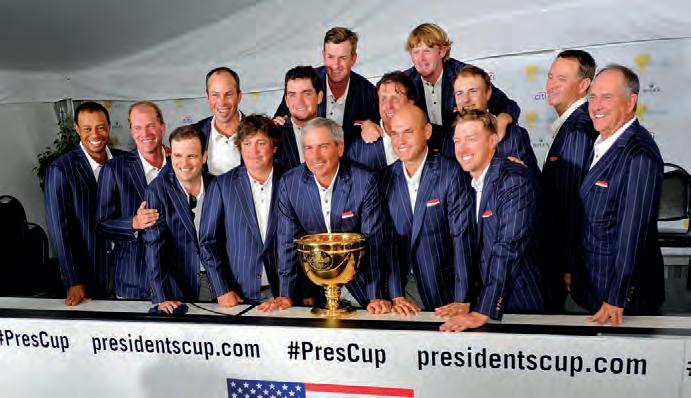




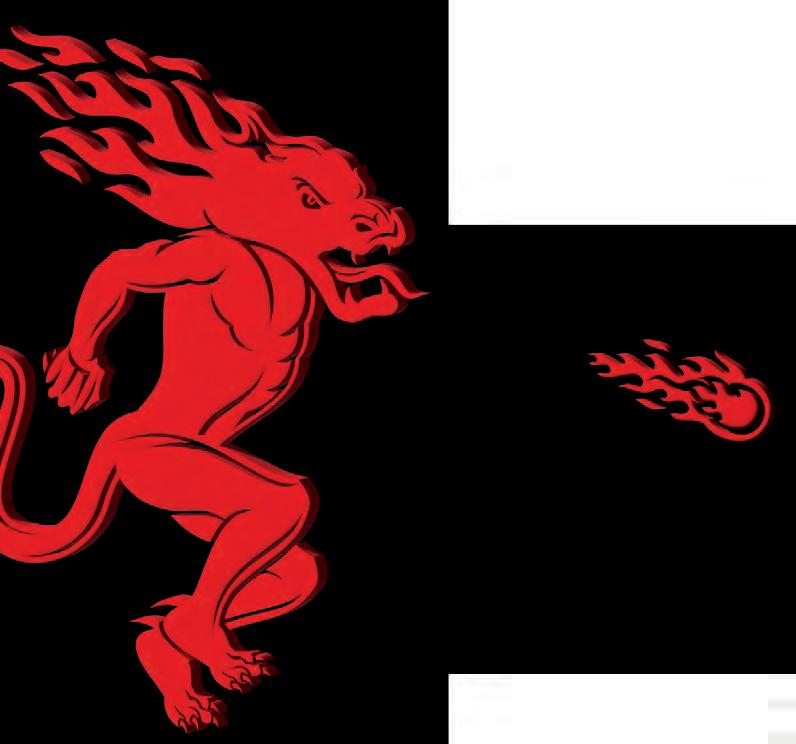
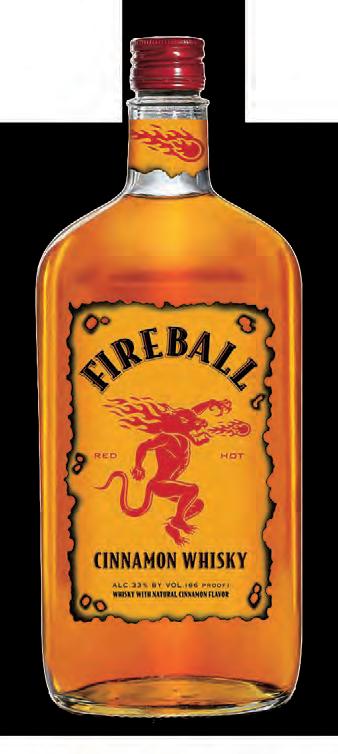

guy in the butt if he needed it, but always in a positive way. I can read a guy’s eyes and get a sense of maybe knowing what he needs.”



Had it not been for a chronic back injury that limited his ability to compete in his prime, Couples might have enjoyed considerably more success. He doesn’t dwell on it. He won the Masters. He won the Memorial, one of his five top-five finishes in 22 appearances from 1982-2013. In the aftermath of his ’98 triumph, he exclaimed, “Next to Augusta, this is it for me.”
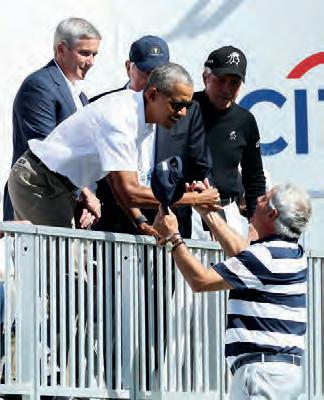

















He hasn’t changed his mind.















“There’s always the Masters. And then the Memorial, it’s as good as it gets,” Couples said. “I was playing golf with some people from Workday [the Tournament’s presenting sponsor] not long ago, and I told them, ‘You have the best tournament.’ What Jack has done, the golf course, everything that goes into it for the players, it’s just very, very special.” MT


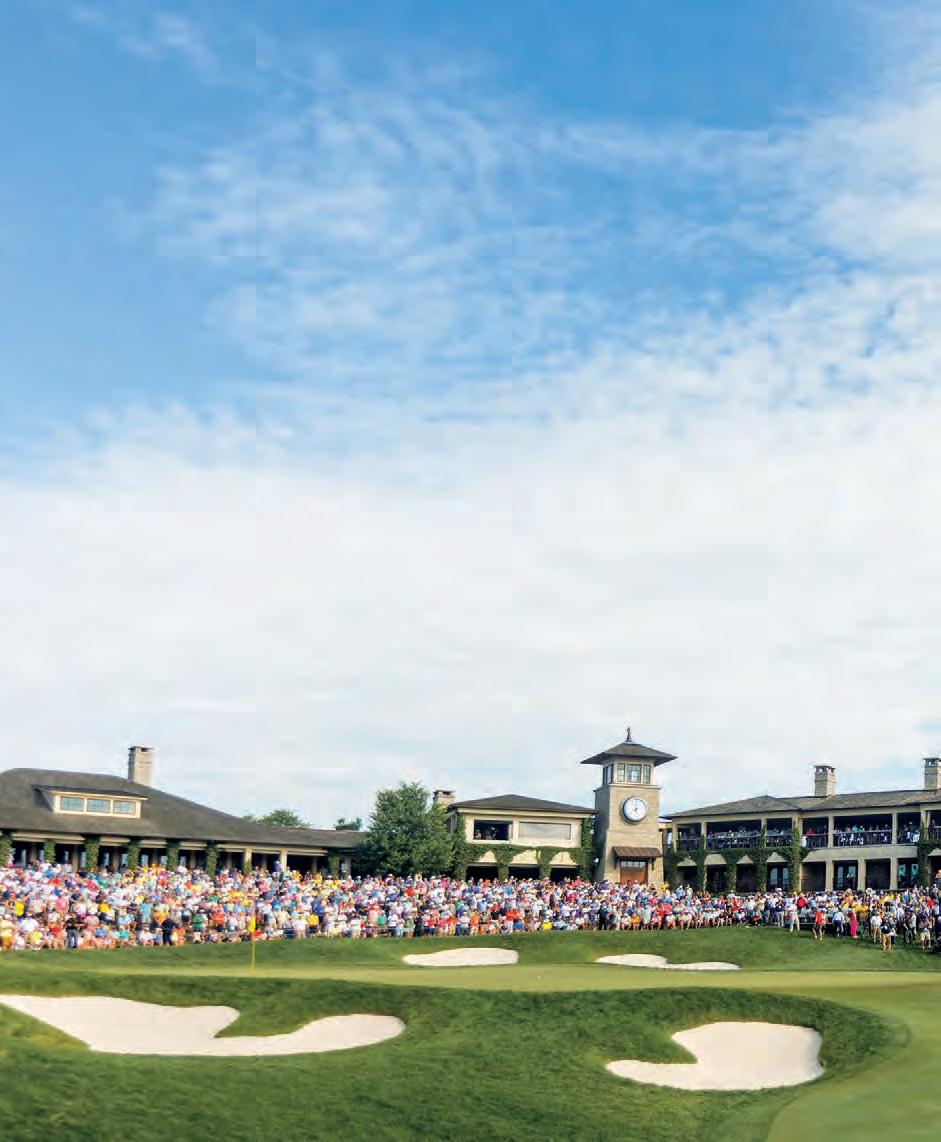
EDITOR’S NOTE: Immediately following the 2020 Memorial Tournament, Jack Nicklaus, the Tournament Founder and Host as well as the designer of Muirfield Village Golf Club, initiated a comprehensive renovation of his prized and highly regarded golf course. Perennially ranked among the top layouts in the U.S. since opening in 1974, Muirfield Village primarily was designed to host a PGA TOUR event. This was a dream that was born from a conversation at the 1966 Masters and fulfilled a decade later with the first playing of the Memorial Tournament. Nicklaus always has been mindful to keep Muirfield Village Golf Club playable for the club’s membership while presenting a sturdy test for the game’s top players. His latest work on the course addressed multiple goals: improve the functionality of the layout; strengthen the challenge for the game’s top professionals; and offer amateur players an increasingly enjoyable golf experience. In the following pages, the Golden Bear takes us on a tour of the course, offering his insights on key changes, including a modest stretching of the Tournament tees to 7,571 yards, while also describing his approach to playing each hole.

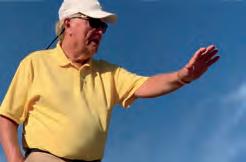
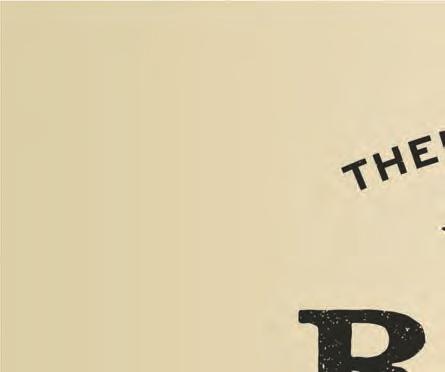

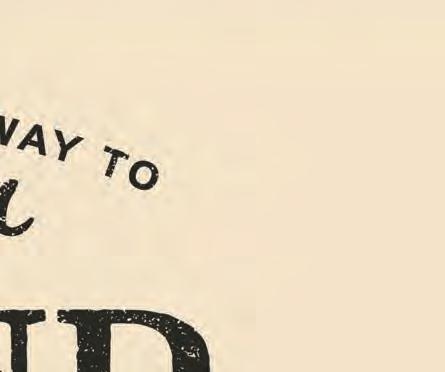
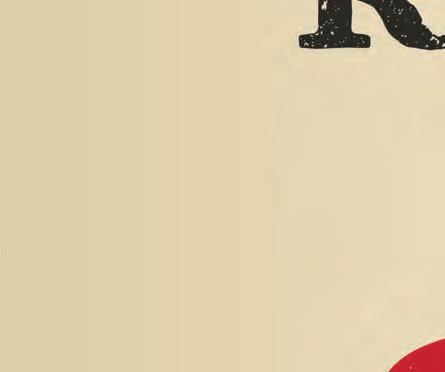
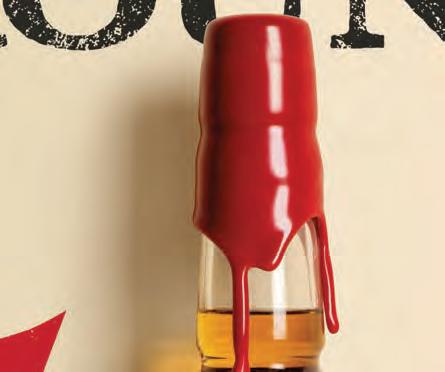
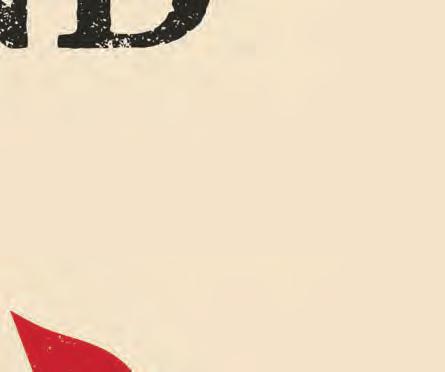
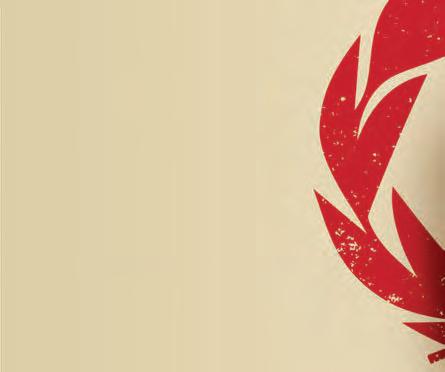
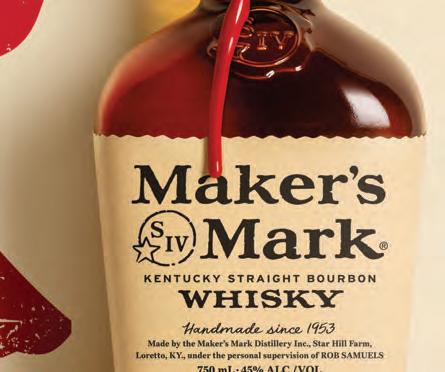
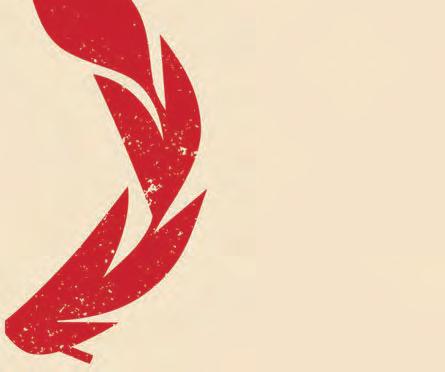

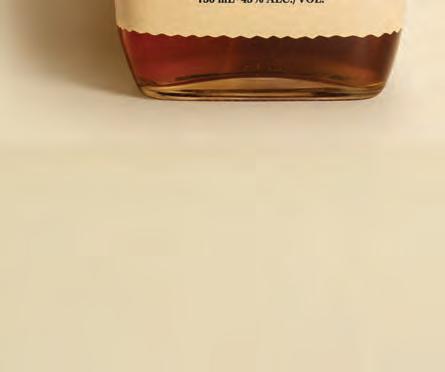



WITH AN ADDED 20 YARDS, the opening hole has length to it, but it is a fairly simple hole that plays downhill and, most of the time, downwind. The tee was slid left a few yards to give you a little better angle. The bunkers along the right fairway were reduced but pushed out farther. So, rather than challenge them, the play off the tee should be short or left of those bunkers—as it was originally designed. The green, which was pushed into the hill that once backed the previous green, has been expanded on the right side to counter the added length. It’s a softer green that plays around a big bunker on the left, and there is an option to run the ball in from the right side.

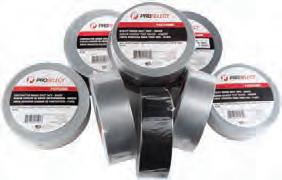
Your average day doesn’t include time to spare, so “fast” has a different meaning for you. “Fast” means as soon as possible—that’s why we offer same day and next day delivery. We also have Pro Pick-Up, so you can skip the lines, get your order, and get back to work. On the rare occasion that we don’t have a product in-store, it’s as good as on its way with our nationwide distribution network. When you need to get it fast, get it from Ferguson.

DESPITE ADDING 8-10 YARDS, this is basically the same hole with very few changes, so it still plays the same. The field will hit 3-wood or driver off the tee, and then play a mid- to short iron into the green. The green has not been changed, with the exception of the left side, where we took a little off cosmetically to give you a better view into the left bunker. Accuracy is a premium, because you still have to be careful of the creek on the right.
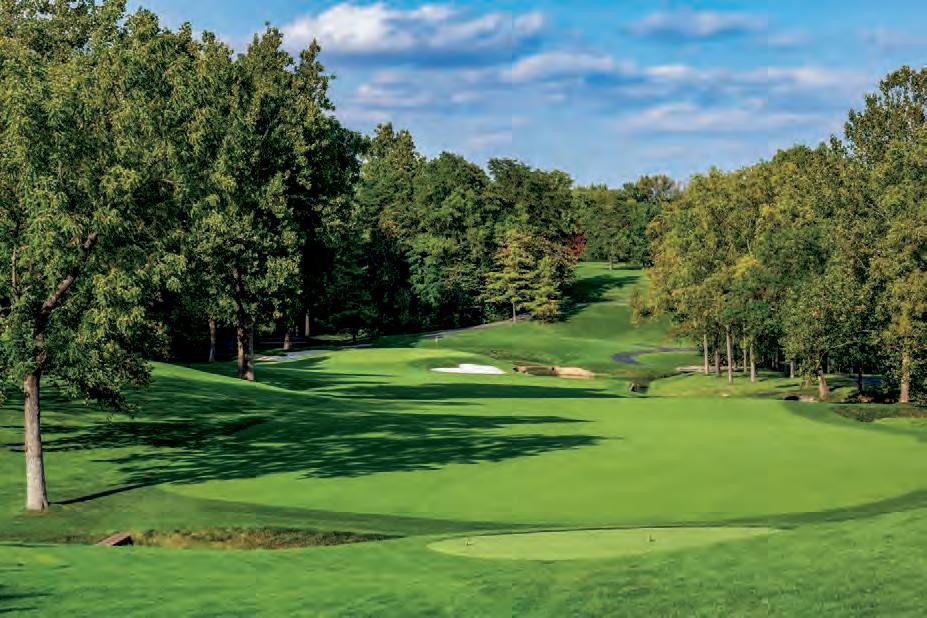
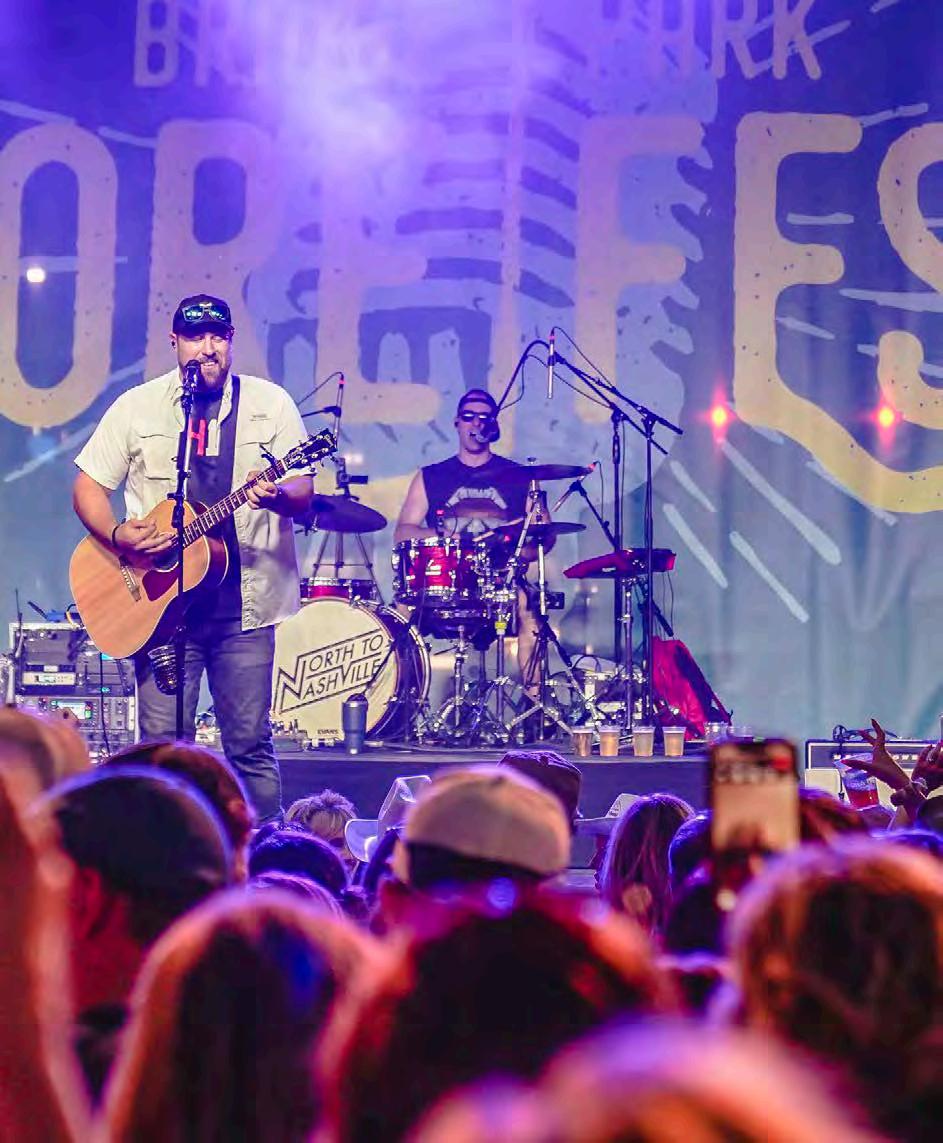
WE MOVED THE TEES on the third hole down the hill to the right about 20 yards to give you more of a look up the creek bed that runs up the left side of the hole and right to the green. Also, from the prior tee, you found yourself looking right into the houses on the right. The play off the tee is a long iron or 3-wood into position, although some players will play driver. The green has been enlarged a little, with the bunker on the right removed. The entire green now feeds into the water, although it is a little flatter and softer, especially in the middle, with more pin placements than before. On the approach shot, the right side of the green is now covered with water, so the left side of the green is obviously the preferred play.



THE FIRST PAR 3 OFFERS the same tee shot as before, with the only difference being that the green has been widened about three paces. The back bunker has been removed and the green now stretches farther back, so the tee shot plays significantly longer. This green went from one of the smallest on the golf course to arguably the largest. The pin variance will leave golfers playing a middle iron to a long iron into the back of the green. There are a couple of deep bunkers on the left, and those sort of protect the ball from getting away from the hole and into the steep drop-off. The bunkers on the right still offer a great challenge.

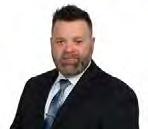
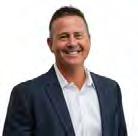
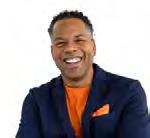

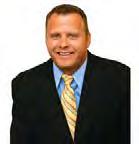
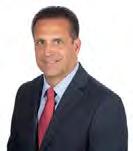
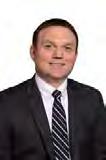
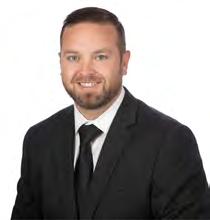
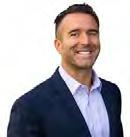


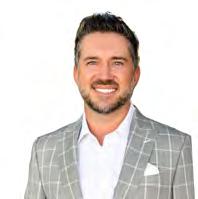

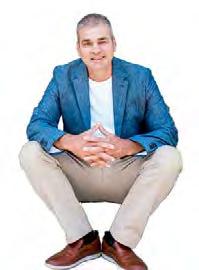
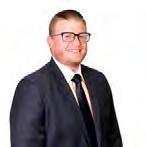
THE FIFTH HOLE IS ACTUALLY SHORTER than before. After moving the tee down and to the left, we knocked down the hill on the right for better visibility off the tee. The creek still splits the hole, forcing a decision off the tee. I would say that 95 percent of the players—maybe even more—will hit the ball down the fairway on the left side, probably with a 3-wood. There will be the occasional player who will try to take it over the water, leaving himself with a short iron into the green. Have at it! It is there for the taking, if you want it, but the penalty is severe. The green, which has been moved back 30 yards and to the left, is a bit smaller and narrower and is protected by a bunker front left and two little ones on the right. The more aggressive you get, the tougher the third shot. If you lay it back for a wedge third shot, you are looking right up the green. If you try to get a little more aggressive and get up closer to the green, it could be good, but if you go long, the pitch is over a bunker to a green running towards the water.


SHOTLINK DATA INDICATED that too many balls off the tee were being hit over the left fairway bunker, so 10-12 yards were added, and that bunker is now more relevant to today’s player. Depending on the wind, this might be the first hole where most of the players in the field go with driver. Remember, the course mostly plays downhill, so 7,500 yards translates to something closer to 7,200 or 7,300 yards. The optimal tee shot is right of the first bunker on the left, and short of the second bunker on the right, leaving a short iron over the water to a green that is a little bit softer, allowing for a few more pin placements in the back portion.

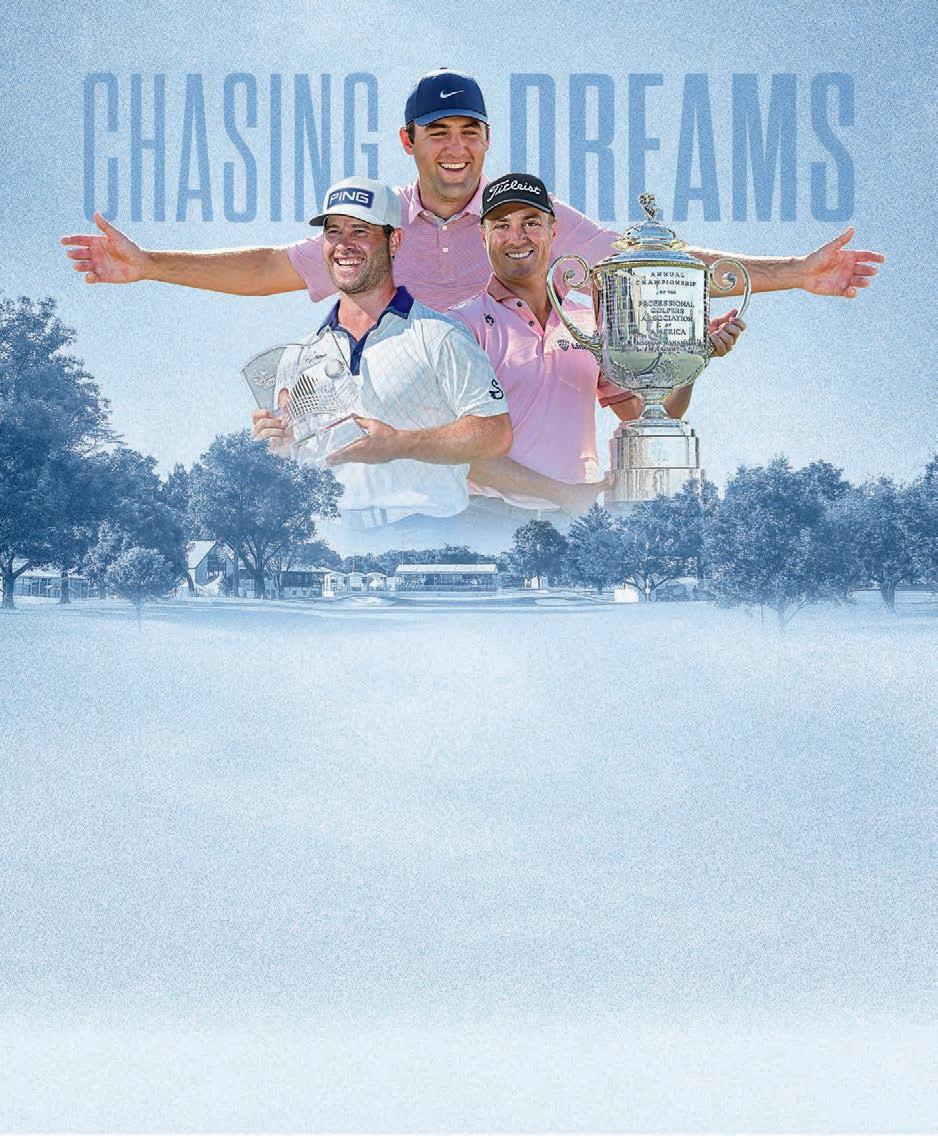


THE TEE SHOT IS THE SAME, though we added 5-6 yards, and demands a drive in between the four fairway bunkers. The green has been moved back and left and has a little bit more undulation in it. The same opening exists in the front, but you have an up-and-over putt to the left side of the green. Some fairway has been added to the back side of the green, so if a ball is hit too far, rather than just sit in rough just behind the green it will instead roll down a slope into a fairway pad. I think it is bit more fun to play, though perhaps a little more difficult.

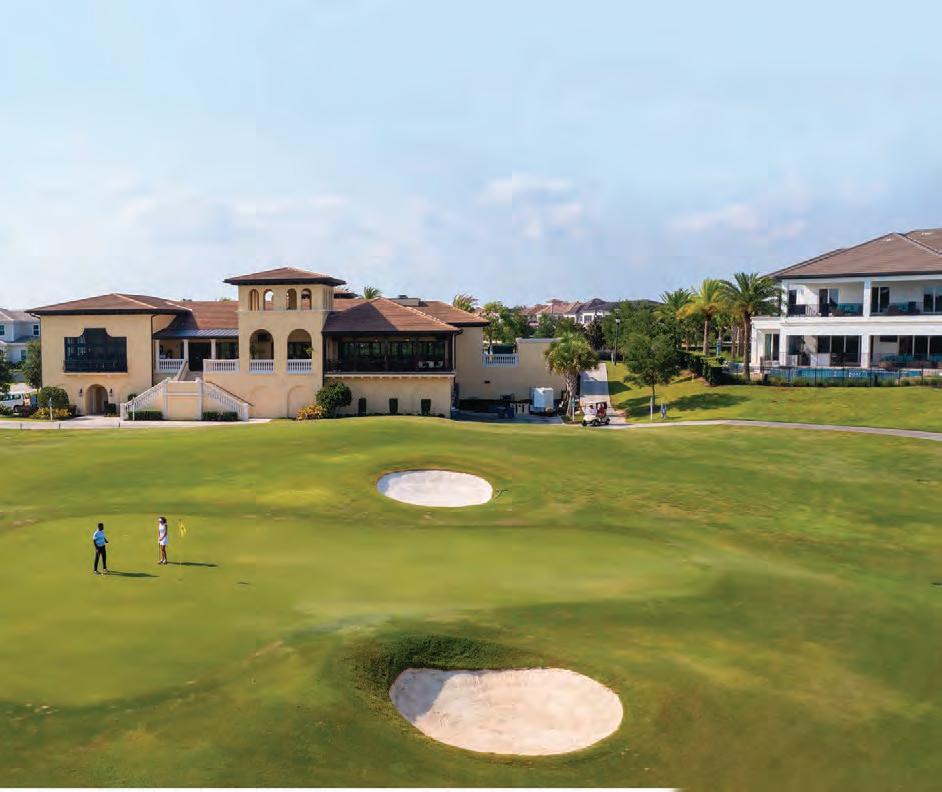

THE TEE SHOT SHOULD BE about a 6- or 7-iron for most of the players, maybe an 8-iron at times, depending on where the pin is located on the green. The problem before the latest renovation was that the old green was built on top of an older green. So we eliminated both versions and created a new green. At the same time, we rebuilt the bunker on the right. The build-up on the right side of that bunker made for an impossible shot at times. Now, the grade has dropped a little and makes for a much more playable bunker shot.

3.143 HOLE STATISTICS
3.082 7TH 13TH
WE’RE A CANADIAN-BASED INTEGRATED ENERGY COMPANY HEADQUARTERED IN CALGARY. WE ENERGIZE THE WORLD TO MAKE PEOPLE’S LIVES BETTER.
And, we’re growing in Ohio. We’re now the state’s largest refiner, sustainably providing products needed for everyday living: gasoline, diesel, jet fuel, and asphalt. We employ more than 1,000 people at our Lima Refinery, Toledo Refinery, and our marketing office in Dublin. We also have opportunities for students and new graduates.
To learn more about Cenovus, including career opportunities, visit cenovus.com/careers.



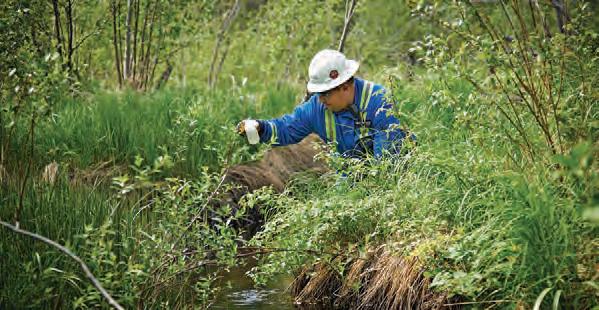
MOST PLAYERS IN THE FIELD will hit a driver or 3-wood, depending on how aggressive a fellow wants to be off the tee. But it’s the approach where things have changed and get more interesting. We basically eliminated the back-left of the green, and at the same time we lengthened the green along the right playing down to the water. We changed the back-right bunker— almost cutting it in half—so we could add some space to provide another pin placement farther right on the green. With the left of the green reduced, we don’t have as many pin locations as we used to, but we have a few nice cupping options on the front of the green, near the water. The same elements come into play—you have the water front and right of the green, and an awkward chip from the back running toward the water.
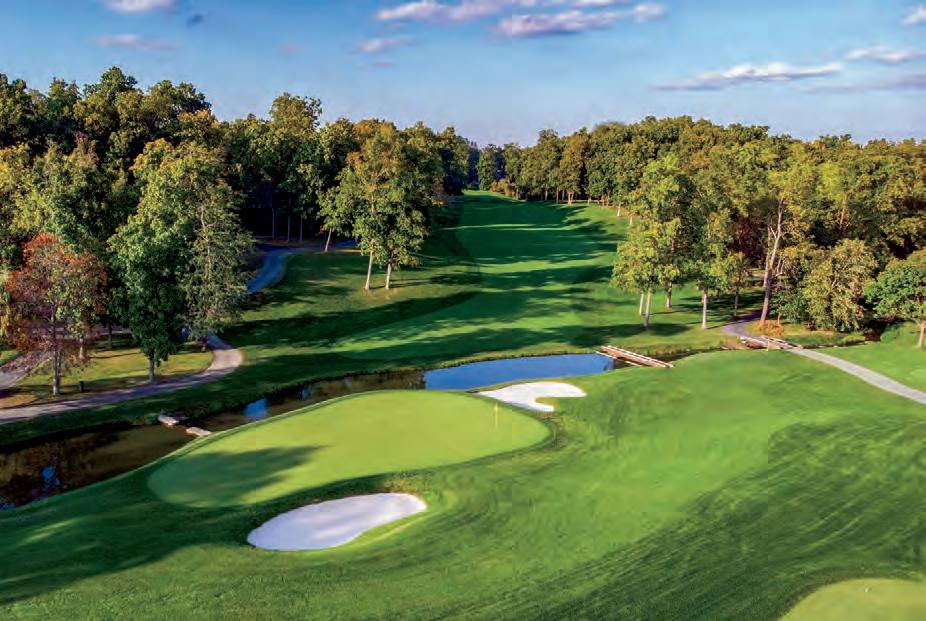

IF YOU LOOK AT CLUB SELECTION off the tee at Muirfield Village Golf Club, you might play driver twice on the front (Nos. 6 and 7), and likely five or six times on the back—beginning here. This hole presents the same tee shot, although we did narrow the fairway a bit. You want to hit the ball to the right of the left fairway bunker. The green has been moved to the left, providing a bit more space on the right. We have fairway that runs around to the back right of the green, with a bunker situated in the middle to complement two bunkers on the left of the green. We now have five pin positions the PGA TOUR can choose from: front, middle-right, middle-left, middle-right-back-left, and middle-back-center. This has created a little more variety than we had before, and in the end, I think it is a much better hole.


PLAYERS FACE THE SAME TEE SHOT, with the creek on the left and bunker on the right. If you fit a driver between the two and hit it long, you can get home in two. If you want to play it as a three-shot par 5, the players might go hybrid, iron and wedge into the green. The green was moved to the left to avoid the trees on the right. Before the renovation, the trees would hang out there, and players would sometimes have to slice a shot into the green, which isn’t the play that should be required. The green is more of a bowl, meaning if you miss it long or to the right, the chip is a little more severe coming down the hill into the green. Hit the green in two, and there are a lot more opportunities for eagles here.





DEPENDING ON THE PIN, the choice here is either a short iron into the left side of the two-tiered green or take one more club to find the right side of the green. Obviously, the tee shot must cover the large lake, which also guards the right side as well. The back bunker is no bargain and is not a place you want to be.

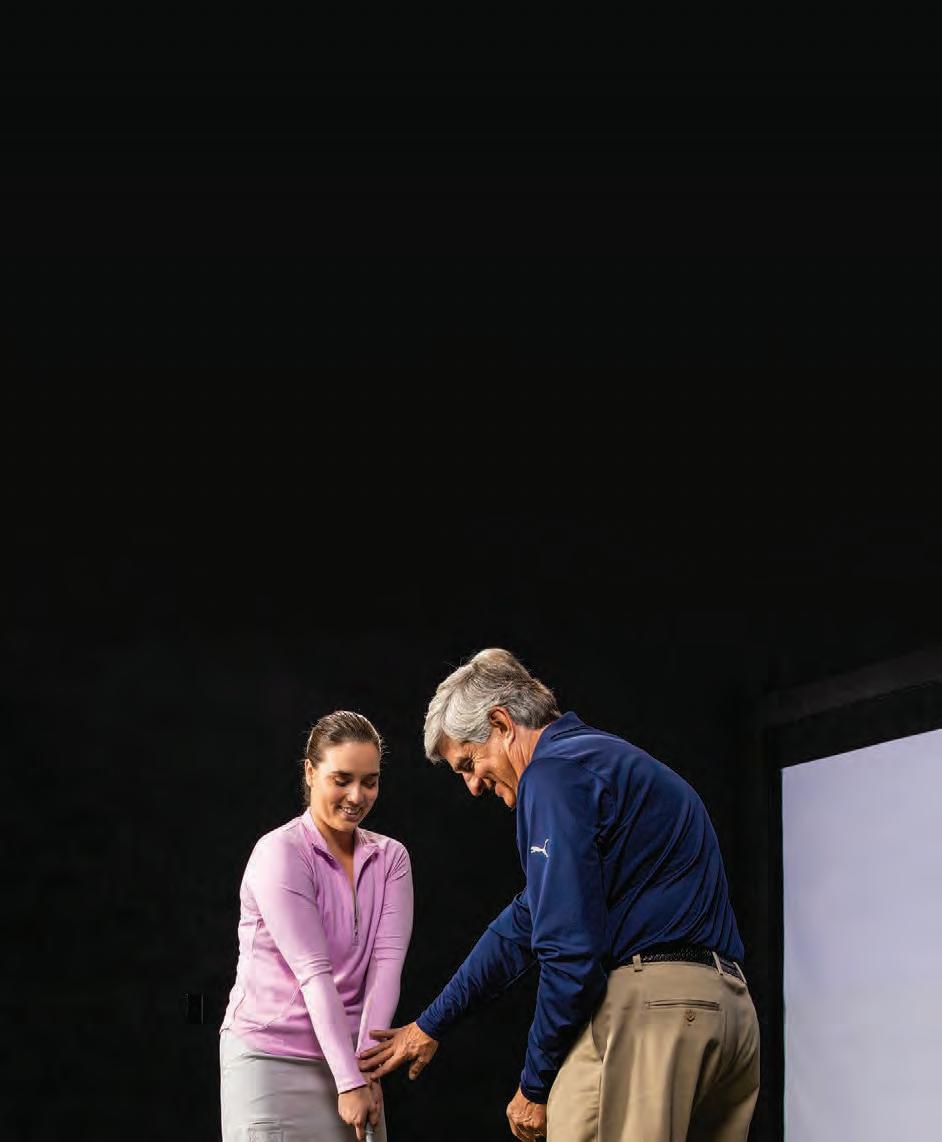
WE NARROWED THE FAIRWAY just past the bunker on the left, from about 42 yards to about 22 yards. We then added trees on the left side. So now, if you want to try to drive it forever down the left side, we have provided you a little bit more of a challenge for your second shot. Two bunkers guard the large green right, left and in the rear.
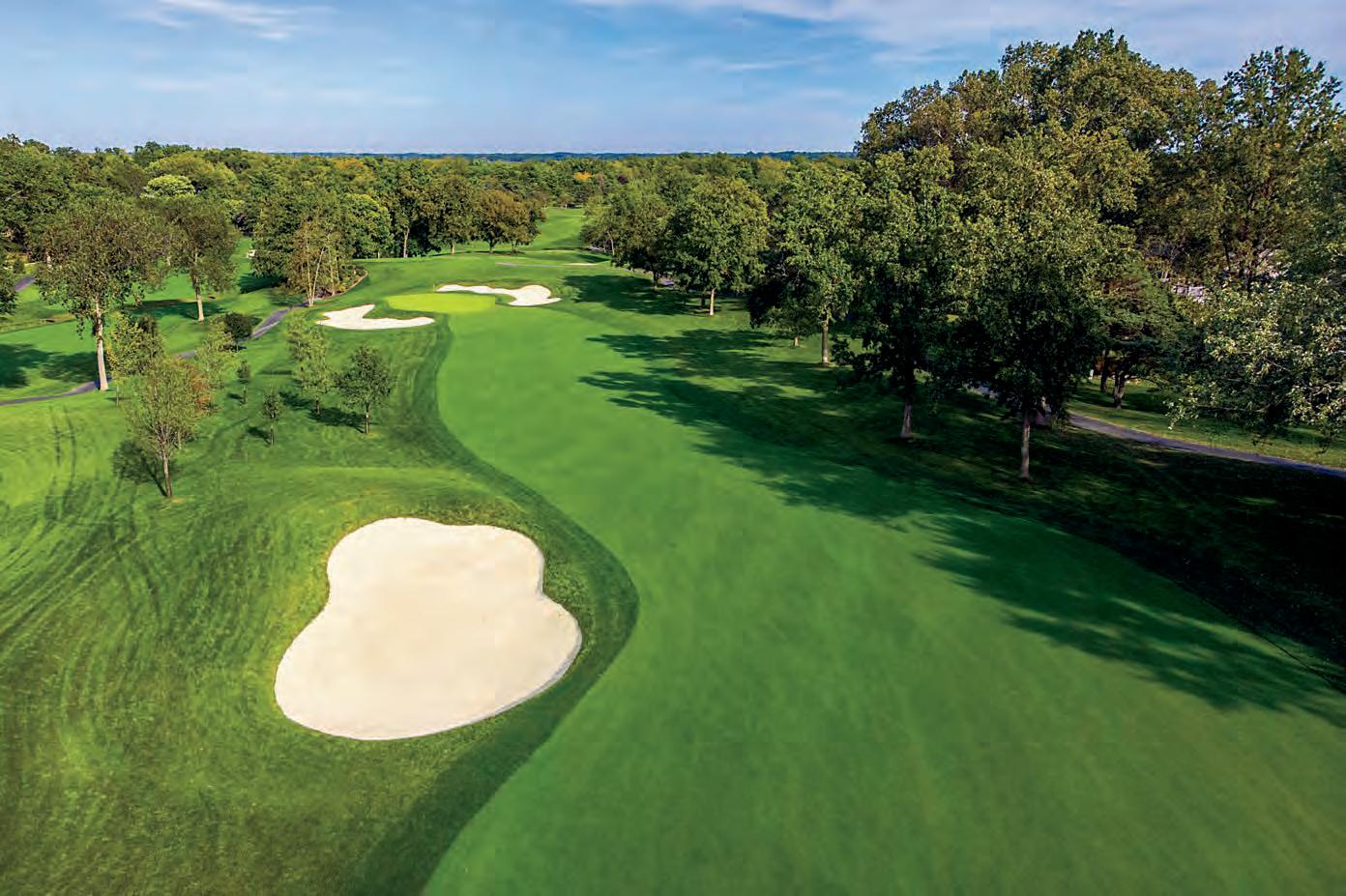

I BELIEVE THIS IS ONE OF THE BEST short par 4s in the game of golf. Because of that, we made no changes whatsoever in the design. It is still a drivable par 4, if the player so chooses, but that is a risky option. Most competitors are likely to play a long iron off the tee, and a 9-iron or wedge into the green. The penalties are obvious, with the potential of missing into the water up the right or putting the ball into the bunkers on the left, which means you’re left with a very difficult up and down with the green running toward the water. It’s truly a fun hole to play.



WE MADE MAJOR CHANGES during the renovation, and, thus, changes the way the hole is played. We took the fairway, dropped it about 20 feet, and moved it left to bring the creek bed on the left side into play. We added four bunkers on the right to take up the elevation change and provide transition from the trees on the right down to the fairway. Although the second shot from the fairway is pretty much the same, you can see where your shot could land if you lay up and then how you can play into the green. The green has been dropped a bit and moved to the right. The water hazard at the front of the green has been expanded on the right side, with two little bunkers between the water and the green. But if your ball misses the green to the right, it should find the water hazard. It is a tough chip from the left or behind the green. We will see a lot of eagle and birdie chances here, but also a fair amount of 6s and 7s.
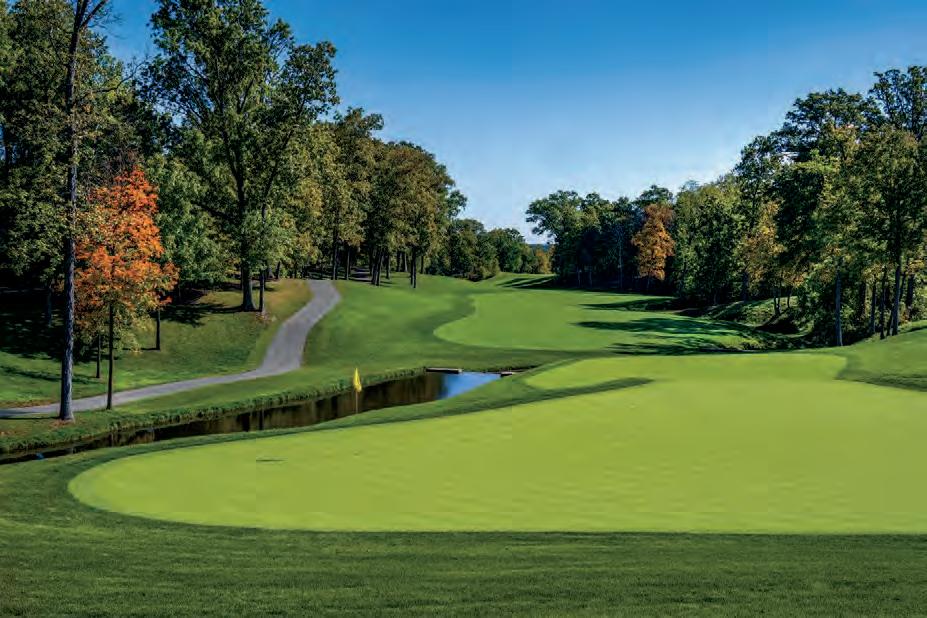
an emergency physician
At our Advanced Immediate Care locations, we treat urgent, non-life-threatening illnesses and injuries.
Our advanced level of care and diagnostics, supervised by emergency medicine physicians, gives you the expertise of a hospital emergency department but with shorter wait times and at a lower cost.
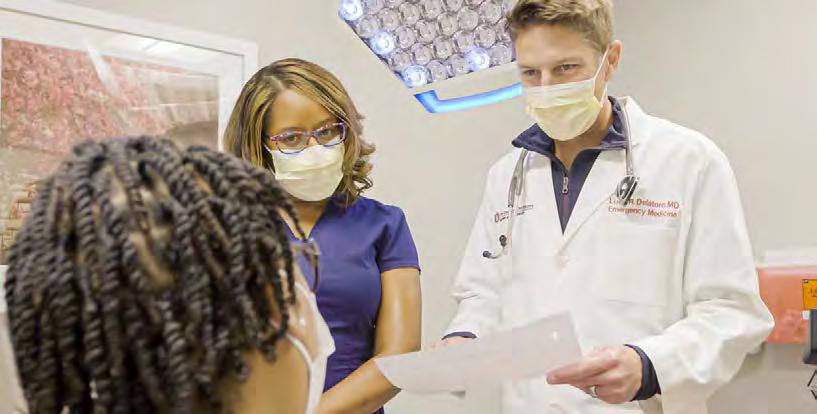
No appointment needed | Walk in seven days a week
Prefer to make an appointment? Log in to mychart.osu.edu or call 614-293-3200
Operating hours and ages treated vary by locations.
Scan QR code for locations and more information

AFTER WE REDESIGNED THE HOLE prior to the 2013 Presidents Cup, it just didn’t play like I wanted or what the Memorial field liked. The green wouldn’t hold shots, especially on the back left. It turned out that the left side pitched away from the tee, and that should not have been the case. So, we took eight inches from the middle of the green and added eight inches to the left so that it holds shots better. With the relocation of the maintenance area after the 2022 Memorial, I saw the opportunity to install a new back tee that has a bit more elevation and provides a slightly different angle but doesn’t really change how the hole plays.





BECAUSE OF THE DISTANCE PLAYERS are driving the ball, I made further changes here by adding about 18 yards to the tee shot. In 2020, we took the bunker on the left in about 20 yards and the one on the end of the fairway on the right in about 4 or 5 yards. Players now face a daunting tee shot that requires a great deal of precision. If you get into one of those bunkers, you’ve got some work left. A small creek runs in front of the green, which we softened a bit to create more pin placements. Three bunkers protect the left and right side of the putting surface.






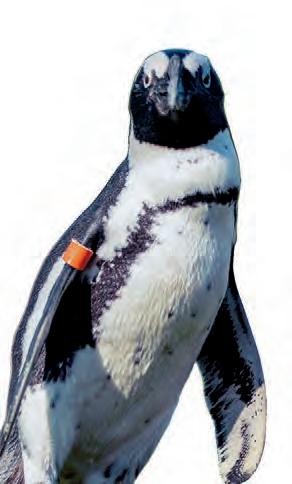
THE 18TH HOLE, A STRONG DOGLEG RIGHT , has the same tee shot, with most of the players going with 3-wood and leaving themselves a middle to short iron into the green, but they have to avoid the creek on the left and bunkers at the corner of the dogleg on the right. Before the renovation, we had only one pin position on the back left of the green, so we softened that area. We also softened the back right of the green, and lengthened it out with less pitch, so the ball doesn’t run up there and just come back.

RETROSPECTIVE: 1983 RYDER CUP
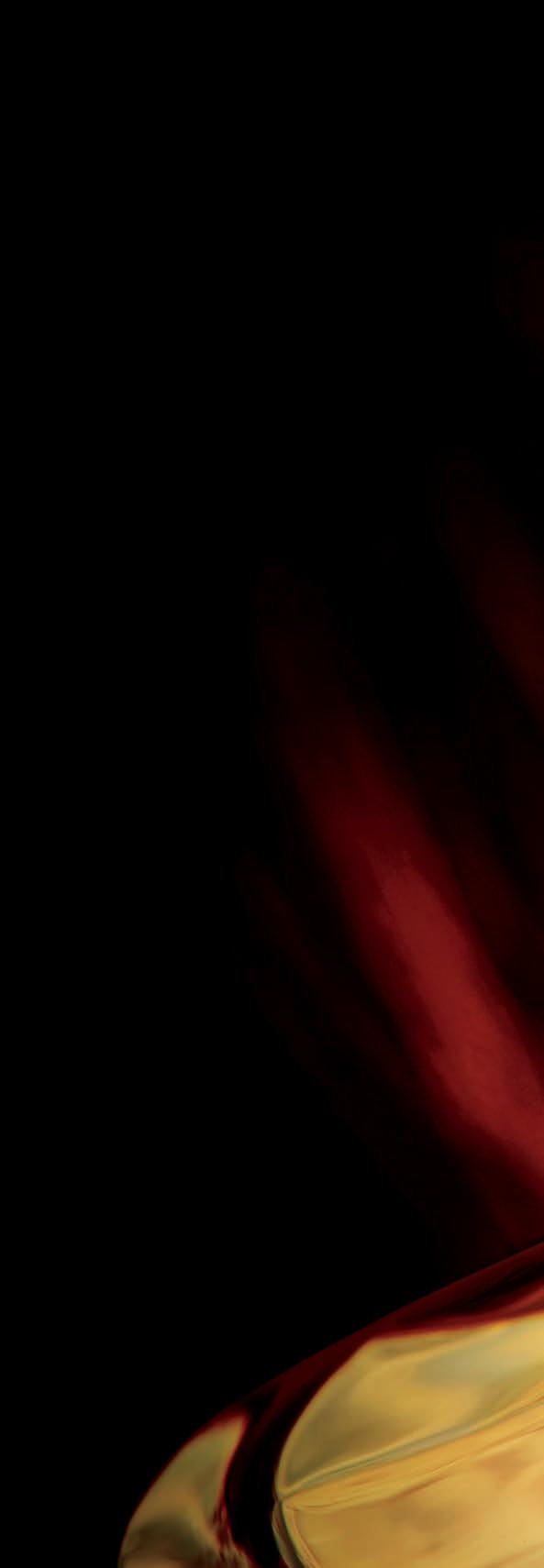
RETROSPECTIVE: 1983 RYDER CUP
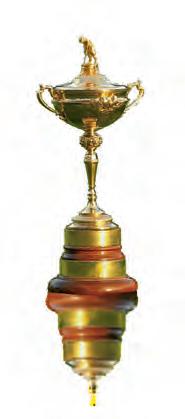
Forty years ago, the rivalry between the U.S. and Europe in the Ryder Cup truly heated up when the American team, captained by Jack Nicklaus, eked out a one-point victory
BY BOB DENNEY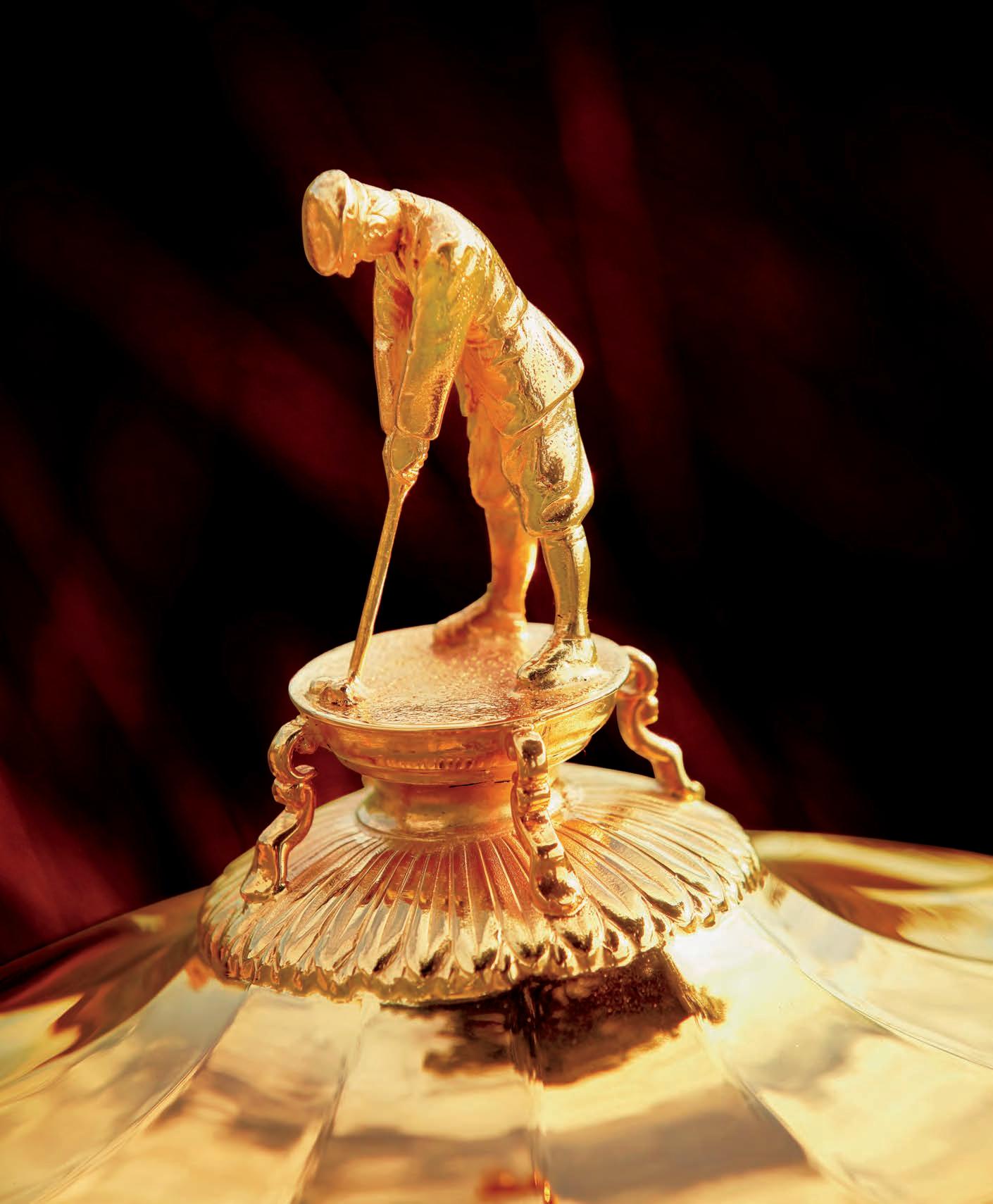


FOUR DECADES AGO, the Ryder Cup’s only visit to South Florida and the first staged in October commenced during a hot, humid week at PGA National Golf Club in Palm Beach Gardens. What became a thriller nearly didn’t happen. And what did happen was a series of pivotal events that set the table for the future of the Ryder Cup, from an event that network television once ignored to a must-see competition on both sides of the Atlantic.
In 1983, the Cup needed a jolt after a drama-sapping 20-3-1 run of success by the United States team over the past 56 years. Although Continental Europe was inserted into the Ryder Cup Deed of Trust in 1979—following a suggestion by Jack Nicklaus two years earlier—a change in the complexion of the competition still took time. The Americans still won handily, 17-11, in ’79 at The Greenbrier in West Virginia, and the Americans overpowered Europe, 18½-9½, in ’81 at Walton Heath in Surrey, England, with a stacked U.S. team that featured 11 players who had won or would win a major championship (the exception being Bruce Lietzke).
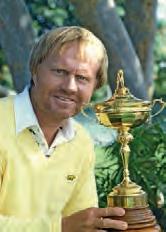
In the wake of that rout, the PGA of Great Britain & Ireland and the European Tour locked into all-out renovation to turn the tide, while the PGA of America—caretakers of the Cup in the United States—put its trust in the most capable hands in the world, selecting Nicklaus, the Memorial Tournament Founder and Host, who lived 20 minutes from PGA National’s 2-year-old, 7,137-yard Champion Course. When he was introduced as captain on Dec. 16, 1982, Nicklaus had just arrived home from a hunting trip and sported a scruffy beard while posing with the Ryder Cup trophy. The hunt was just beginning.
America’s team would be chosen by points awarded to players who finished in the top-10 in PGA TOUR events, while Europe’s 12-member team was not selected by a three-member
panel, as in past years, but solely by the Order of Merit points standings. There were no captain’s picks for either team.
So, who would captain Europe?
Executive Tour Director Ken Schofield deemed Tony Jacklin, a two-time major champion who was left off the 1981 European team, the right choice. Jacklin was approached prior to the first round of the Car Care Plan International at Sand Moor in Leeds, England.
“I was shocked that I was invited by the Ryder Cup Committee, and it was [just] six months before the event,” Jacklin said recently. “Normally, a captain is announced 18 months out. I found out years later that there was a lot of arguing going on. Historically, the captain had always been an elder statesman.
“Bernhard Langer was involved in the discussion, and he recommended somebody closer to the age of the players. I was 38 at the time. I took a night to think about it, and I said to myself that this is an opportunity to get a few things straightened out. I went back the next day and said that I would do it if I had carte blanche to do what I wanted.”
Among Jacklin’s requests was that the players, caddies, spouses and partners would travel first class aboard the Concorde, the elite supersonic jet. “Prior to this, we were essentially at the back of the bus,” said Jacklin.
Jacklin insisted that his team wear “better outfits,” and that Saville Row would handle the suits. “We were wearing about anything that anyone gave us,” Jacklin said. “One year, we actually wore plastic shoes. One of my soles separated while playing at Laurel Valley [in 1975].”
Jacklin also met with the president of the European Tour, Rt. Hon. Lord of Derby. “I told him that I agreed to the captaincy,” said Jacklin, “and I asked him about Seve Ballesteros.” Europe’s most electric star, the Spaniard had played on the 1979
team, but he was left off the 1981 team due to his insistence on appearance money.
“You accepted the captain’s role, and that’s your problem,” Jacklin said, relaying what Derby told him.
“And of course, Seve was never anyone’s problem,” Jacklin added. “Seve was never properly sat down and accommodated. He was basically Tiger Woods before Tiger Woods came along.”
Jacklin arranged a meeting with Ballesteros at the Prince of Wales Hotel in Southport, before The Open at Royal Birkdale. Jacklin impressed upon Ballesteros that they both had a common grudge from 1981. “After a long discussion and after a lot of venting, I said to Seve, ‘I can’t do it without your help,’ ”
Jacklin said. “He looked at me for a minute with those intense dark eyes of his, and said, ‘OK, I help you.’ ”
From there, Jacklin made his reunion with Nicklaus and toured the facilities at PGA National. The two longtime friends had combined for 13 Ryder Cup appearances, none more significant than 1969 at Royal Birkdale when Nicklaus conceded a 3-foot par putt to Jacklin to produce the first tie in the event’s history.
One of the first points to check off Jacklin’s list was assurance that Europe would have a team room. “We had never had a team room, and it worked amazingly well,” said Jacklin, who also told Nicklaus that he would be organizing gifts for the players, and both agreed to an exchange.
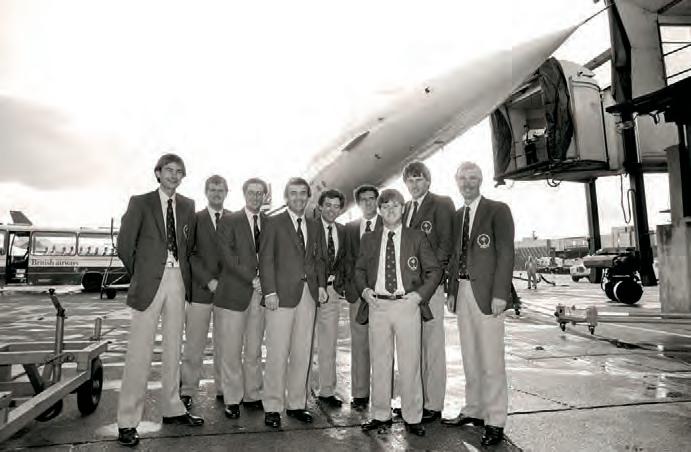
Among Jacklin’s requests was that the players, caddies, spouses, and partners would travel first class aboard the Concorde, the elite supersonic jet. “Prior to this, we were essentially at the back of the bus,” said Jacklin.











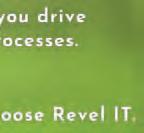

While Jacklin dealt with his mending behind the scenes, Nicklaus was involved in his own discussion a week after rain drenched the Champion Course.
Typical South Florida afternoon thundershowers were threatening the matches. Both captains, PGA of Great Britain Executive Director Colin Snape and PGA of America President Mark Kizziar huddled in a room at the PGA Sheraton Resort Hotel. PGA Honorary President Joe Black, a veteran rules official, also attended the meeting.
“Tense moments arose when a European official stated that if we could not complete the matches by Sunday, they
would have to leave as one member of their team had a contractual obligation,” said Kizziar. “That is when Jack said, ‘If we are not going to finish the matches, I am not going to take my team out of the locker room.’ Joe Black was assigned the task of determining how we would proceed if suspending play became necessary. Luckily, after a few rain suspensions, we were able to finish on Sunday.”
As the matches neared, a welcome dinner for the players and officials was held at Nicklaus’ home in North Palm Beach. Though team rooms for each side were reserved at the PGA Sheraton Hotel, the U.S. team had all its dinners at Nicklaus’
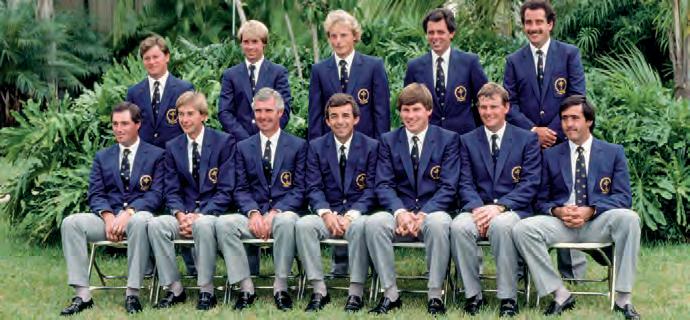
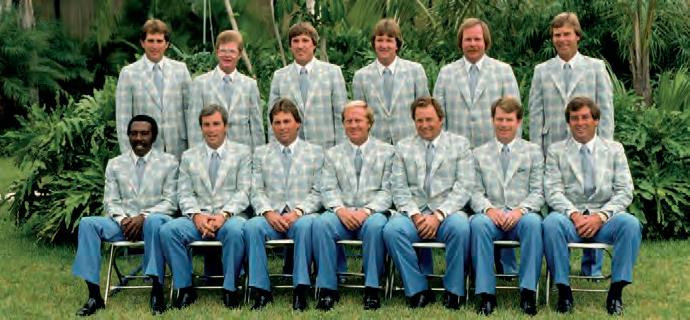
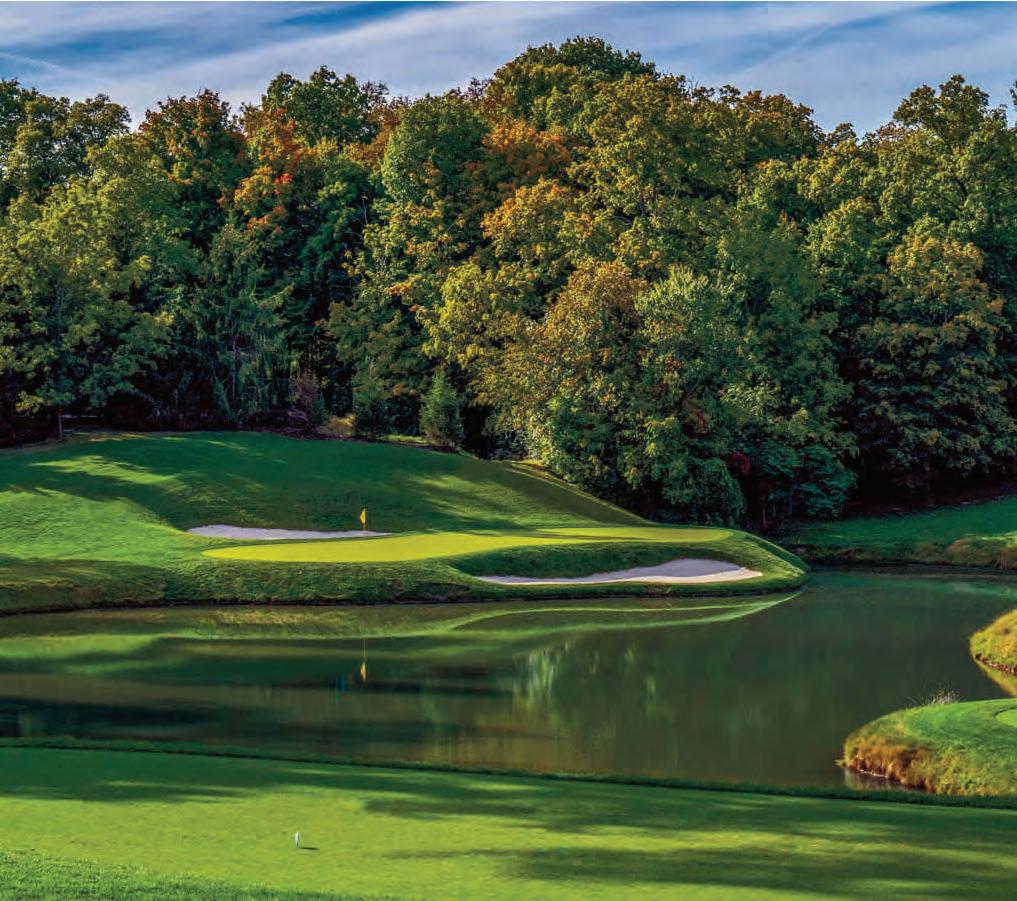
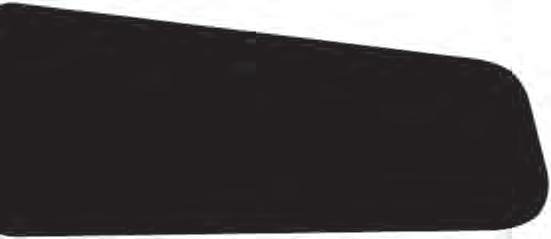
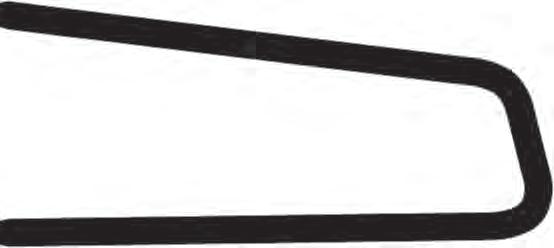

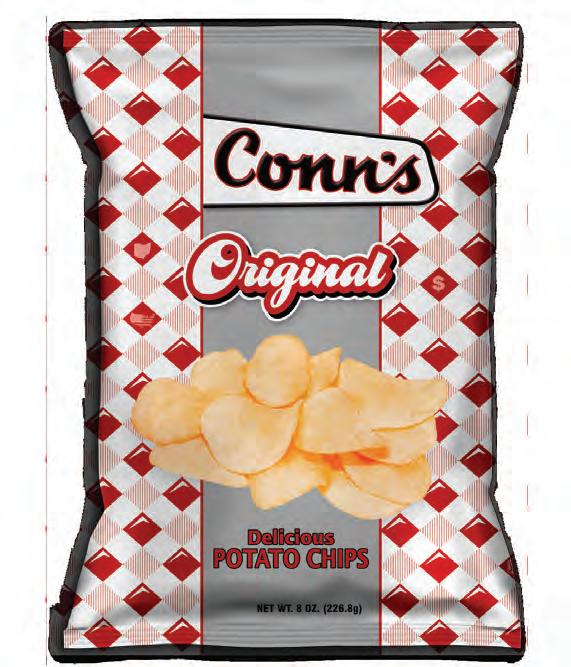

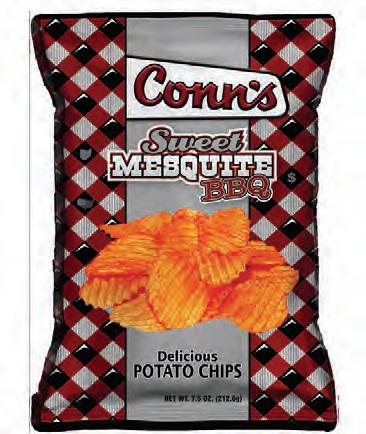

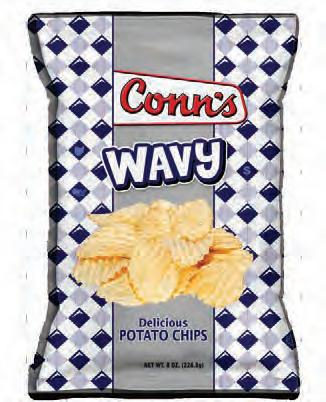

home. “Barbara [Nicklaus] red-flagged us [on the way in], so we wouldn’t get impaled on a spike-like fin sticking out from a mounted marlin that Jack caught in Australia,” recalled Lanny Wadkins, one of the heroes of the U.S. team.
The U.S. player roster included newcomers Curtis Strange, Calvin Peete, Jay Haas, Bob Gilder and Craig Stadler. They were joined by Wadkins, Ben Crenshaw, Raymond Floyd, Tom Kite, Gil Morgan, Tom Watson and Fuzzy Zoeller.
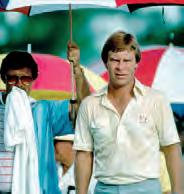
Ballesteros led Europe’s dozen and was joined by four rookies—Ian Woosnam, Gordon Brand, 20-year-old Paul Way and 43-year-old Brian Waites, a club professional from Nottingham who had garnered the necessary qualifying points—and six members from the 1981 team: Nick Faldo, Bernard Gallacher, José María Cañizares, Langer, Sandy Lyle and Sam Torrance. Ken Brown, who made his return after four years, rounded out the visiting side.
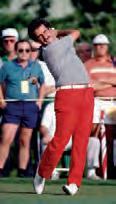
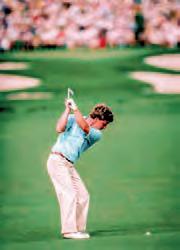
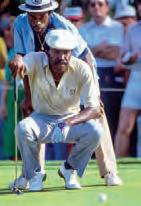
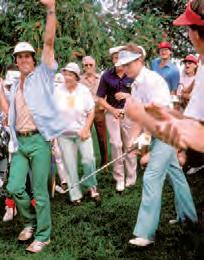
The event in Palm Beach Gardens was notable for another reason.The PGA of America scored a television coup with the first live coverage of the event in the U.S. ABC network captured the final four holes of singles matches from PGA National on Sunday, Oct. 16, with legendary announcer Jim McKay anchoring the segment.
“I remember it was hot as hell down there,” Wadkins, who made his third of eight career Ryder Cup appearances, said. “The first day it was so hot making the turn, our shirts were on the heavy side. Stadler and I went into the pro shop and bought shirts. Actually, we charged them to Jack, and we played the second nine in new shirts.”
Nicklaus’ golf cart got stuck in the mud on the way to the first tee, Kizziar remembered. But the captain was in high gear after
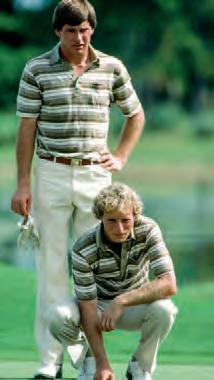
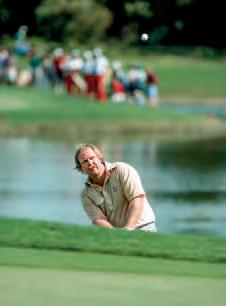









that. Wadkins recalled that Nicklaus had consulted other captains for advice. Dave Marr, who guided the 1981 team, said, “Whatever you think you need, get more.”
That advice served Wadkins on the third hole of his foursomes match with Stadler on Friday morning as they faced Faldo and Langer. Wadkins spotted Nicklaus in a golf cart and waved him over. “I had lost a metal spike after my second shot on the par 5,” Wadkins recalled. “Jack pulls up in his cart. I said, ‘Hey Jack, you got your shoes on?’ I just lost a spike right where I push off my right side.’
“He said, ‘I got it!’ Jack dives into some big ol’ bag almost head-first and came out with a cleat and a cleat wrench. He said, ‘Stick it up here.’ And he put a cleat on my shoe. There’s no telling what else was in that bag. When the greatest player of all time is giving you a shoeshine, you tend to remember that.”
Meanwhile, the off-course drama continued for Jacklin, who was stopped at lunch on Saturday by Spanish Rules Official Angel Gallardo. “Seve’s not happy. I think you need to talk to him,” Gallardo said.
“I found Seve in the locker room,” said Jacklin, after Ballesteros had just completed a third match partnering with Way. “ ‘Seve,’ I said, ‘Are you OK?’ He looked at me and said, ‘I don’t know, this boy, I got to tell him everything.’ And he
listed thing after thing. I said, ‘But you are doing great; you’re putting points on the board.’ Then Seve said, ‘Yeah, but I feel like his father.’
“I said, ‘Seve, you ARE his father! Is there a problem?’ He looked at me again for a few seconds and said, ‘For me, it’s no problem.’ I put them together again in afternoon four-balls and they beat Bob Gilder and Tom Watson.”
With that win, Ballesteros and Way went 2-1-1 together, and the 25th Ryder Cup was tied, 8-8, setting up a special Sunday singles session.
Jacklin sent out Ballesteros, Faldo and Langer in the first three matches in an attempt to build momentum. Faldo and
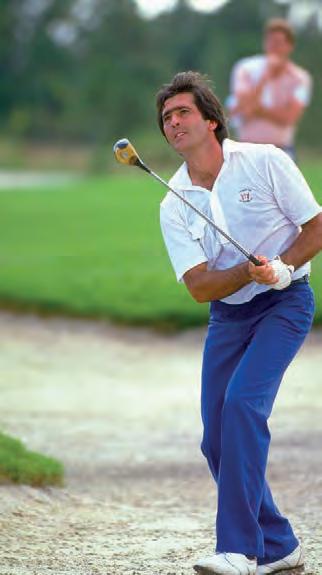
“So he [Ballesteros] looks at it for a while, [and] he says, ‘tres de madera,’ 3-wood … So he goes ahead and hits it, and he carries the ball 250 yards on the fly … right on the front of the green. … We get a half. We’re the luckiest people in the world to get a half after where we were. I mean that 3-wood out of that bunker has to be one of the greatest shots in golf.”
—NICK DE PAUL, SEVE BALLESTEROS’ CADDIE

Langer responded by defeating Haas and Morgan, respectively. Ballesteros, meanwhile, was in a battle with Zoeller, who was suffering from chronic back pain, and they were tied heading into the par-5 18th hole. Both players found the left rough with their drives, but Zoeller recovered safely into the fairway while Ballesteros hacked his second shot into a fairway bunker, 250 yards from the green.
The Spaniard reached for a 3-wood and took a big swing. The ball cleared the front edge of the bunker and landed on the left fringe some 18 feet from the flagstick. From there, he two-putted to save par to halve the match after Zoeller missed an 8-footer for the win.
No video footage exists of the shot, only a photographer’s image of a majestic finish by Ballesteros. “It is the greatest shot I’ve ever seen,” Nicklaus said.
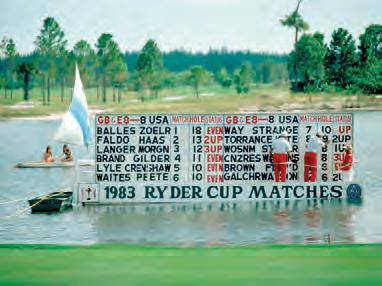
“We’ve got a lip that’s about 6 feet high and the ball’s about 15 feet from the lip, so I think all we can play out of there is about a 5-iron,” Nick De Paul, Seve Ballesteros’ caddie, said in a 2015 interview with Golfing World, describing the scene.
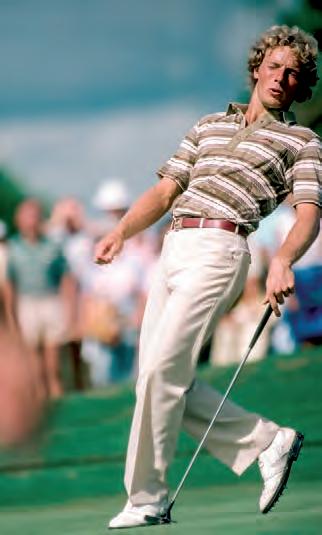
“So he looks at it for a while, [and] he says, ‘tres de madera,’ 3-wood, so I say, ‘Damn, I don’t know if he can get this ball up over that lip.’ So he goes ahead and hits it, and he
carries the ball 250 yards on the fly … right on the front of the green. … We get a half. We’re the luckiest people in the world to get a half after where we were. I mean that 3-wood out of that bunker has to be one of the greatest shots in golf.
“I heard that Jack Nicklaus also said that was the greatest shot he ever saw. So they missed all that with the cameras. People will never see that shot, but a lot of people did see it, and they agree with me that that was one of the greatest shots ever,” De Paul said.
Over the next few hours, both teams threw punches and counterpunches at each other. Brown defeated Floyd, 3 and 2,
“Walking down the fairway with my players, tears were running down my face. It’s an experience I’ll remember the rest of my life.”
—U.S. CAPTAIN JACK NICKLAUSLEFT: The floating scoreboard shows the 8-8 tie at the end of the second day of competition.

and Way upset Strange, 2 and 1, leaving three matches still on the course.
Torrance and Kite dueled to a tie, just as Watson reached the 16th hole 1 up on Gallacher. Wadkins, meanwhile, playing in the final match, had outplayed Cañizares, but the Spaniard kept answering him by making putt after putt for halves, including a 30-footer for par on No. 16 after recovering from the water. Wadkins was 1 down with two holes to play.
At No. 17, Wadkins converted a 6-footer for par to stay alive, setting up the march down 18, a 578-yard par 5, with water guarding the right and back of the green.
“I knew I had to win the hole and tie my match for us to win,” Wadkins said. “I outdrove Cañizares off the tee. He then put [his second shot] across the corner of the lake. I was actually thinking about laying up. When he did, he forced me to be more aggressive with my second shot. I hit a really good 3-wood, and I remember Curtis yelling at my ball, ‘Get up! Get up!’ I remember thinking, ‘Don’t worry, it’s solid.’ ”
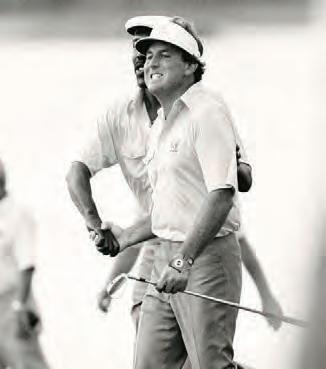
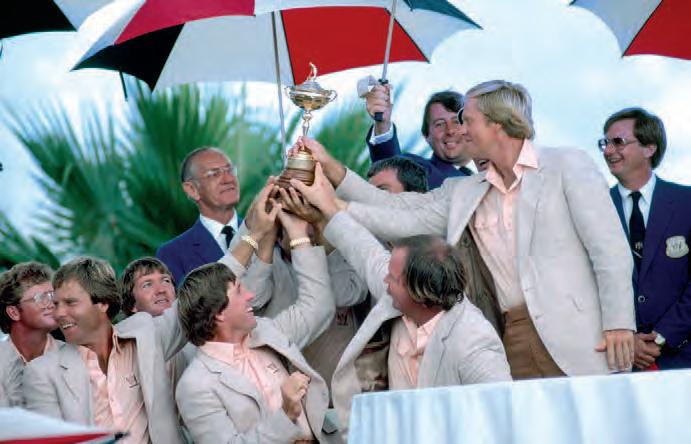
Cañizares hit his approach fat, with the ball making the front edge of the green.
“That gave me an opening,” Wadkins said. “I remember
distinctly my yardage. I had 72 yards. I put it to a foot. Then Jack went over and kissed the divot. I walked up on the green and saw how close I was. Tom Kite slapped me on the back and said, ‘Great shot.’ I tried to say something, and nothing came out. It was the most nervous I’d ever been playing any one shot I can remember.”
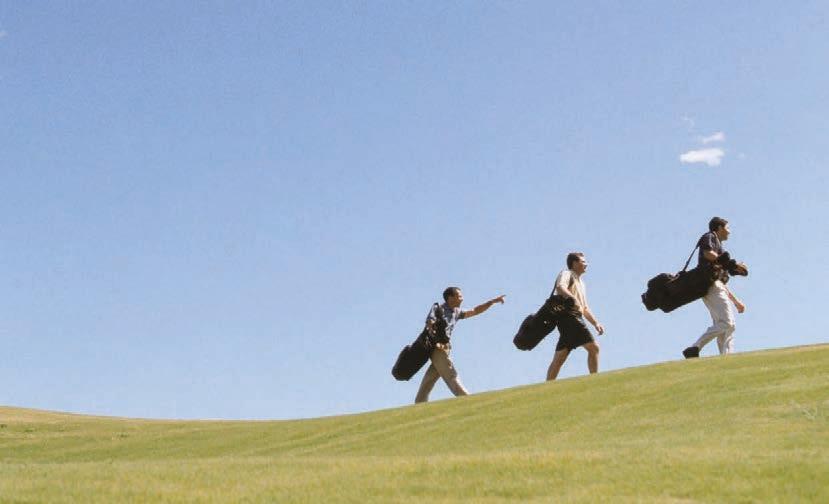
Cañizares then chipped past the hole to the back fringe, putted from there and missed. He then walked to Wadkins to concede the birdie to halve the match. Almost simultaneously, Watson closed out Gallacher with a bogey putt on 17. The U.S. clawed its way to a 14½ to 13½ victory, narrowly avoiding its first Ryder Cup defeat on U.S. soil.
Nicklaus told reporters afterward, “Walking down the fairway with my players, tears were running down my face. It’s an experience I’ll remember the rest of my life.”
Wadkins later told a relieved Golden Bear, “It was only
the most important shot of my life, Jack. There’s nobody I’d rather have hit it for.”
Champagne flowed in Room 306 for the Americans at the hotel, with Zoeller beginning the spraying. Nicklaus had a cork in the corner of his mouth, filled the Ryder Cup for all to have a sip and asked his wife to partake. Jack tipped the cup and Barbara did her best to survive the bubbly flow.
“It was an enormous disappointment to not get it done,” said Jacklin, who went on to serve as captain for two consecutive wins in 1985 (at The Belfry in Sutton Coldfield, England), and in 1987—again facing Captain Nicklaus, this time at the Golden Bear’s home course, Muirfield Village Golf Club. “The year 1983 was the turning point, however. People who looked upon it closely, recognized it was the change.” MT
Bob Denney is the PGA of America historian emeritus.
“It was only the most important shot of my life, Jack. There’s nobody I’d rather have hit it for.”
—LANNY WADKINS TO JACK NICKLAUS
They remember the shot. The very best one. They remember the flight, the feel of it, the satisfaction of the execution. There was no mistaking it. They relive it. Because it was flawless, a work of art, even. Among the many thousands of golf shots a player hits in his career, he can pull out just one and say, “Yes, that was it. That was the best I ever had.” But ask any great player, one who would have executed any number of great shots, and it’s amazing how his mind can go immediately to that single stroke, one so magical and magnificent he can recall it at a moment’s notice.
There isn’t a golfer alive who hasn’t had a shot at an important time he wouldn’t like to have back as a do-over. He remembers those, too. But emblazoned in his mind’s eye, locked in his memory, is that one shot that he would love to hit over and over and over again, forever savoring its purity.
Jack Nicklaus, Founder and Host of the Memorial Tournament presented by Workday, is an exception, but only because he can count three outstanding shots in his magnificent career. Those came at the 1967 U.S. Open, the 1972 U.S. Open and the 1975 Masters. All were executed with a 1-iron, and as he once described them, “The way it comes off the golf club, and you watch the flight, you say, ‘Ooh, is that fun!’ ”
Golf is such a difficult game. It can’t ever be conquered or perfected, except in those rare, isolated moments when all of the elements that make up a flash of perfection assemble. Those moments are simply transcendent. They deserve to be savored.
The following are the descriptions of other wholly gratifying, fantastic, “fun” shots by the PGA TOUR players who executed them, relish them and replay them in their minds often.
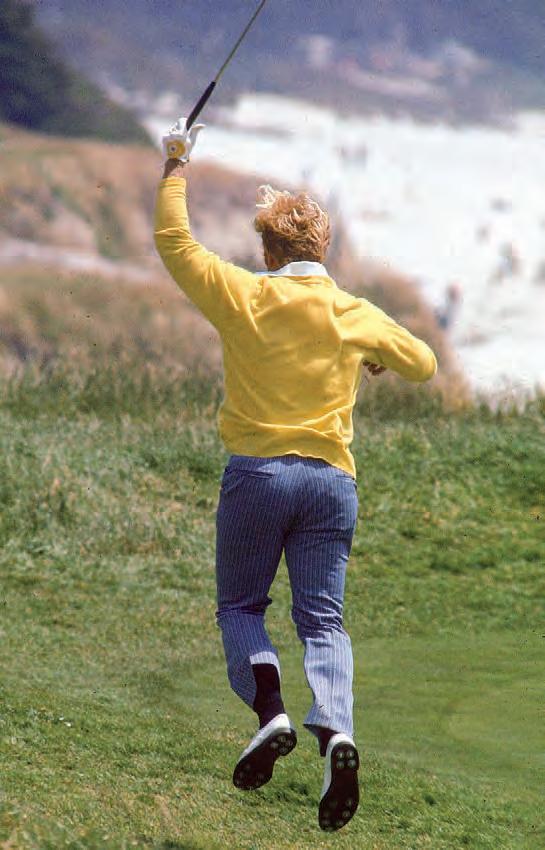
PGA TOUR players recall that one shot that was as close to perfect as they could get
ALEX MICELI
▲ SIR NICK FALDO The 3-iron I hit at the 18th hole at Muirfield in ’92 might be about the best I could ever do. I was huffing and puffing coming up the last, and I needed a four [par] to win The Open. On the first tee I’m four ahead, and on the 15th tee I’m two back [of John Cook], and I’m just fidgety all the way around. Then I hit one of the best 5-irons of my life on 15, the ‘chicken wing shot,’ one of the best 4-irons on 17, and that 4-iron was pretty good, too, a really well-controlled iron shot. That pin was front-right behind the mound. The only place you can hit it is 20 feet left, and I hit it 20 feet left. Now I’ve got 197 into the green at 18, but it was into a right-to-left wind, and as good as the other shots I mentioned—I mean, those were two quality shots—the one at the last was special. It was right at it and went 20 feet beyond, two putts and there’s The Open. I was so nervous, and all I thought was ‘get it moving.’ I wanted the first two feet going back to be smooth, and I knew after that it would be all right, and it was the sweetest swing. In the day of blades and a balata ball, I can just about still feel it.
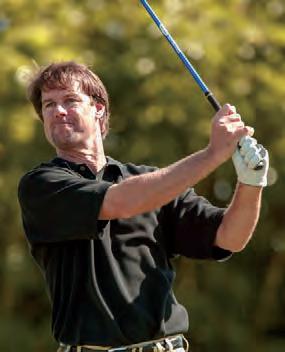
▲ PAUL AZINGER With zero hesitation, I can go right to the 4-iron I hit on the sixth hole at the Sony Open in Hawaii a year or two before I won it in 2000. It was dead into the wind, 198 yards, and it left the club at a flush trajectory and never left the flag, and I did the club twirl because it was so pure. And I remember it felt even better because I did it in front of Hal Sutton, who I revered as a ball striker. I’ve hit a lot of fun shots in my career—and if you think about the perfect shot at the perfect time, there’s obviously the bunker shot I hit on 18 to win the [1993] Memorial—but if the question is the one shot would I like to hit over and over again, that’s the one swing I’d love to repeat. When you hit a shot from 4-iron distance and you know it’s going to be a kick-in, that’s really something.
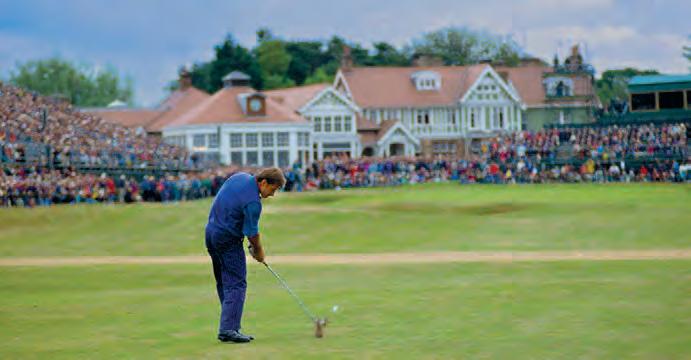

▲ HALE IRWIN I go back to the 4-iron I hit into 18 at Winged Foot [in the 1974 U.S. Open]. I had just made a 12-footer to save par on 17, and then I hit a very nice drive into the fairway, which was really good, too, but I still had about 200 yards into that green. The pressure I felt standing over the ball, I was incredibly nervous. I didn’t actually know if I had the lead at the time; there weren’t leaderboards on the course like they have now. [He led Forrest Fezler by two.] When I hit the shot, it was almost like I didn’t hit it at all. It was so pure I barely felt it coming off the club, and it ended up about 20 feet from the hole. I have never forgotten how good that one felt and what it meant.
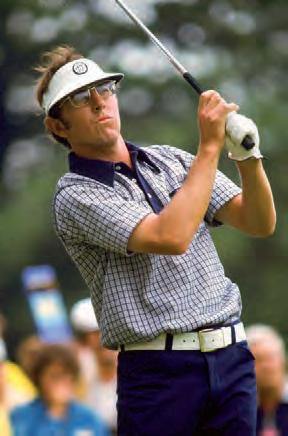
▼ RORY McILROY Honestly, the 6-iron I hit into the 10th green at Congressional in 2011 [at the U.S. Open] was pretty special. I was six shots ahead, and, yeah, I had a big lead, but there were a lot of holes left to play, and you know that things can still unravel. We know what happened to me at Augusta. And especially after Y.E. Yang hit it in there very close, I wanted to just put a good swing on it and get it on the green because a poor swing, you could hit it in the water and make 5 in a heartbeat. It was right on line to the flag, and I knew it was just what I wanted to do. It landed behind the hole, took the slope and worked its way back to where it was basically a tap-in birdie. That really set me up to finish the way I did.


▲ GEOFF OGILVY The pitch from the front of the 18th green at Winged Foot in the 2006 U.S. Open is a shot I remember being about the best I can do. It was a pitch that I had practiced for a few years. To try to spin it on a very short shot, it doesn’t always come off right, even for us, but when you get that one that feels like it sits on the face a bit longer, you know that it’s going to be pretty good. That one just came out so dreamy, and as soon as I hit it, I knew it was good [to within 5 feet]. I knew I’d hit it the best that I could. For it to come out the way it did, that was a pretty fun shot.
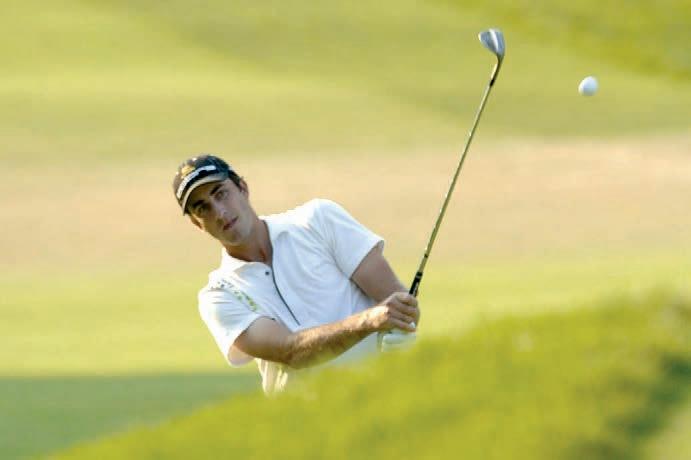
▲ JUSTIN ROSE One of my best qualities is the fact I forget. You know, that’s just kept me out here for 25 years, that I tend to have that ability to shut things out. So I wish I could be a little bit more on board with the good stuff. But I’d say what comes to mind is the pitch shot into the 18th green to 3 feet for birdie to win the gold medal in the [2016] Olympics. It was particularly good because it was quite a sandy, gnarly little area where things could have gone wrong quite easily. I had about 38 yards, and I knew my contact needed to be perfect. The strike was pure. I chose to trust that 100 percent I was playing the right shot, and the result was exactly as I intended.
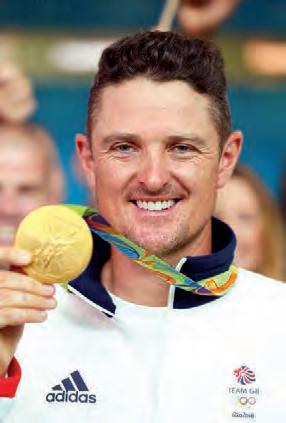








▲ ADAM SCOTT I think the best shot I’ve ever hit is the 6-iron into the 10th green in the playoff at the Masters [in 2013]. I had 191 yards with the ball above my feet, a hook lie, and I thought about slinging a 7-iron in there, but I decided to hold off a 6-iron [so it wouldn’t turn over right to left]. Given the circumstance, the quality of that shot, to look up after contact and see the ball doing everything you expect it to do and watch it finish where you are trying to have it finish is just about as good as it gets. When you hit shots purely, it’s like they melt onto the club face, and it feels like there’s nothing stopping it. It’s a complete freedom through the bottom of the arc. I think that’s the feeling of a shot that’s perfect.
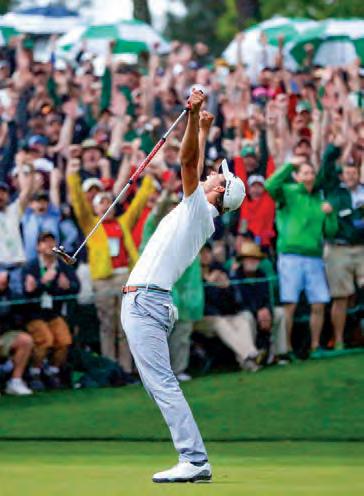
▼ JORDAN SPIETH The 6-iron I hit at the Open Championship on No. 14 at [Royal] Birkdale after I spent the 13th hole hanging out on the driving range was about the best I’ve ever had. It went right by the lip and about 3-4 feet past the hole. It was 200 yards, wind a little off the right, just a striped fade, and it was just the absolute perfect shot that held the wind, and it was a huge boost for me, too. The feel of it … it felt so good that I carried that feeling of it with me for the rest of the round. That I could produce such a terrific shot after a horrid drive on the previous hole, I knew that I was back to me and that I was going to be OK.
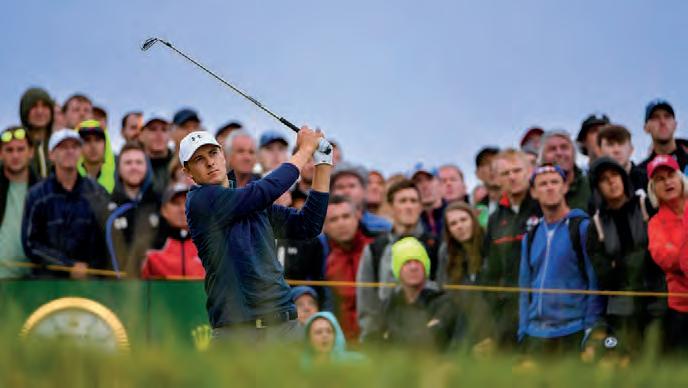

The 4-iron I hit to 3 feet on the 72nd hole at The Woodlands in Houston to get into a playoff with Greg Norman [on the way to winning the 1988 Independent Insurance Agent Open] is one of those shots you don’t forget. But when you combine the situation, the importance of the event, I think the shot that still resonates with me all these years later is the 1-iron I hit on the last hole in the NCAA Championships my freshman year [at Carlton Oaks Country Club, near San Diego]. Wake Forest had never won it. I’m 19 years old and playing with Gary Koch in the last group, and we were tied at the last hole, a par 5, while Jay Hancock [Koch’s Florida teammate] was one stroke ahead. Gary hit his 3-wood on the back part of the green. I had about 240 to the hole and put my 1-iron shot about 7 feet left of it. Gary chipped up and made birdie, and then I managed to make mine to win the individual title by one shot. Wake Forest won by two, and we finally gave Coach [Jesse] Haddock an NCAA title. I’ve hit good shots, but I doubt I ever hit a better one under that kind of pressure.
▲ CURTIS STRANGE
▲ GARY WOODLAND The 3-wood I hit at the 2019 U.S. Open at Pebble Beach on the par-5 14th hole in the final round was by far one of the best 3-wood swings I’ve ever made in my life and probably one of the best swings I have ever made—especially being under the gun. I was looking at 255 yards to cover the front bunker and 265 to the hole. I hammered it, and it just came off perfectly. MT
Alex Miceli is president of the Golf Press Association and a contributor to SI.com. Editorial director David Shedloski contributed to this article.
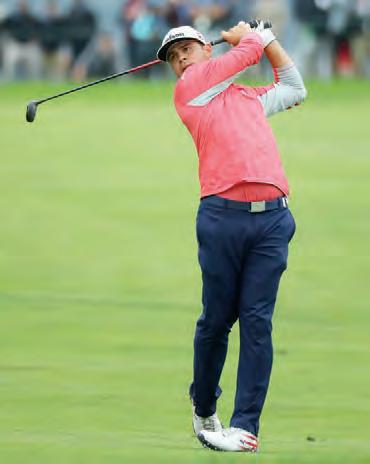
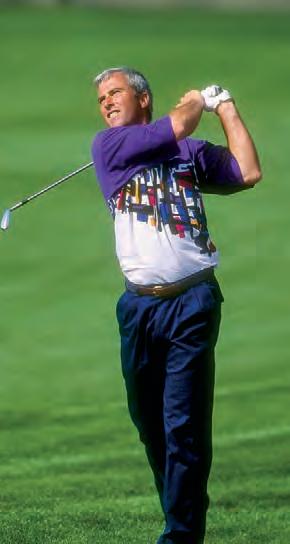
Where your neighborhood eats, drinks and laughs!
Call ahead seating available. Great kid’s menu! Gluten-free Friendly Menu Available.
RUSTY BUCKET RESTAURANT AND TAVERN
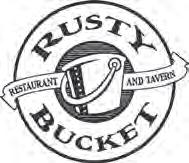
10 Columbus Locations
DUBLIN
Two miles south of Muirfield at Avery Road & Route 33/161
Turn east into the Giant Eagle Center (614) 889-2594
BEXLEY CLINTONVILLE
EASTON TOWN CENTER
GAHANNA
HILLIARD
NEW ALBANY
UPPER ARLINGTON
WESTERVILLE
WORTHINGTON
HAPPY HOUR
Monday–Friday 3–6 p.m.
$1 Off Beer, Wine & Cocktails
½ Off Apps, $12 Pizzas
$7 Juicy Lucy Burger
PRIVATE DINING
Private dining rooms available at select locations. Visit myrustybucket.com for hours, menus & directions!
For authentic Mexican Cuisine & the Best margaritas in town, try “El Vaquero.”
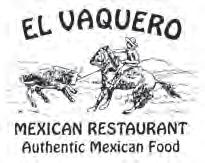
Rated #1 Consumers’ Choice Award 1999–2021 and voted as Best Mexican in Columbus.
Enjoy inside dining or relax on our patio. Open daily for lunch and late night dining. Join us for Happy Hour from 4–8 p.m.
Monday–Thursday 11 a.m.–10 p.m.
Friday & Saturday 11 a.m.–10:30 p.m. Sunday 11 a.m.–9 p.m.
EL VAQUERO
9130 Dublin Road (614) 336-1128 vaquerorestaurant.com
A Modern European Eatery in the Heart of Bridge Park. Delicious European inspired dishes served to you in a beautiful environment.
Happy Hour
Monday–Friday | 2–6 p.m.
Brunch
Saturday–Sunday: Until 3 p.m. View Specials and Reserve at our website
FADÓ PUB & KITCHEN
Opened in Bridge Park this past December, The Roosevelt Room is a modern bar serving inspiring cocktails with a nod to 26th president of the United States Theodore Roosevelt.
Happy Hour:
Monday–Friday 3–6 p.m. Half price drinks
ROOSEVELT ROOM
6544 Longshore Street Dublin, OH 43017
therooseveltroombp.com
Welcome to Grandad’s Pizza and Pub. Our family, proudly serving yours since 1997!

We’re family owned and operated, sharing our quality brand with your neighborhood.
Hours:
Sunday–Thursday | 11 a.m.–9 p.m.
Friday–Saturday | 11 a.m.–10 p.m.
GRANDAD’S PIZZA & PUB
HILLIARD
4093 Trueman Blvd. Hilliard, Ohio 43026 (614) 767-3020
MORSE ROAD
1418 Morse Road
Columbus, Ohio 43229 (614) 433-9700
GRANDVIEW
1254 West 3rd Avenue
Columbus, Ohio 43212 (614) 488-9700
KILWINS DUBLIN

4549 Bridge Park Ave Dublin, OH 43017 (614) 389-0575
6652 Riverside Drive (614) 408-1500 fadopubandkitchen.com
BETHEL
1490 Bethel Road
Columbus, Ohio 43220 (614) 459-9700
grandadspizza.com
THE SCORES at the first official team competition were not just good; they were eye popping. Coach Marvin Lawrence Moore—Lar to his friends, L-Moore (as in, “lose more”) in the college golf coaching fraternity—was confident that he had assembled a terrific team in his final year at Georgia Gray University in the small town of Troy. No one had to know exactly how the 67-year-old skipper had lured some of his players there. Frankly, he didn’t quite know himself. He left that to his assistants, who were very … well, resourceful.
Sherman Falls Golf Club wasn’t your run-of-the-mill college course. It was 7,505 yards, extremely long for a par-72 course built in the 1960s. It featured 94 bunkers and water hazards on half its holes. It wasn’t really designed for golf. It was designed for torture. The unofficial course record was 64, shot by a talented but very flaky junior golfer named Guy Webb the week after it opened.
Moore looked at the scoreboard near the clubhouse and blinked repeatedly in disbelief. Then he grinned while scratching his chin. While he believed that he had himself a good team, he just couldn’t believe it was really this good.
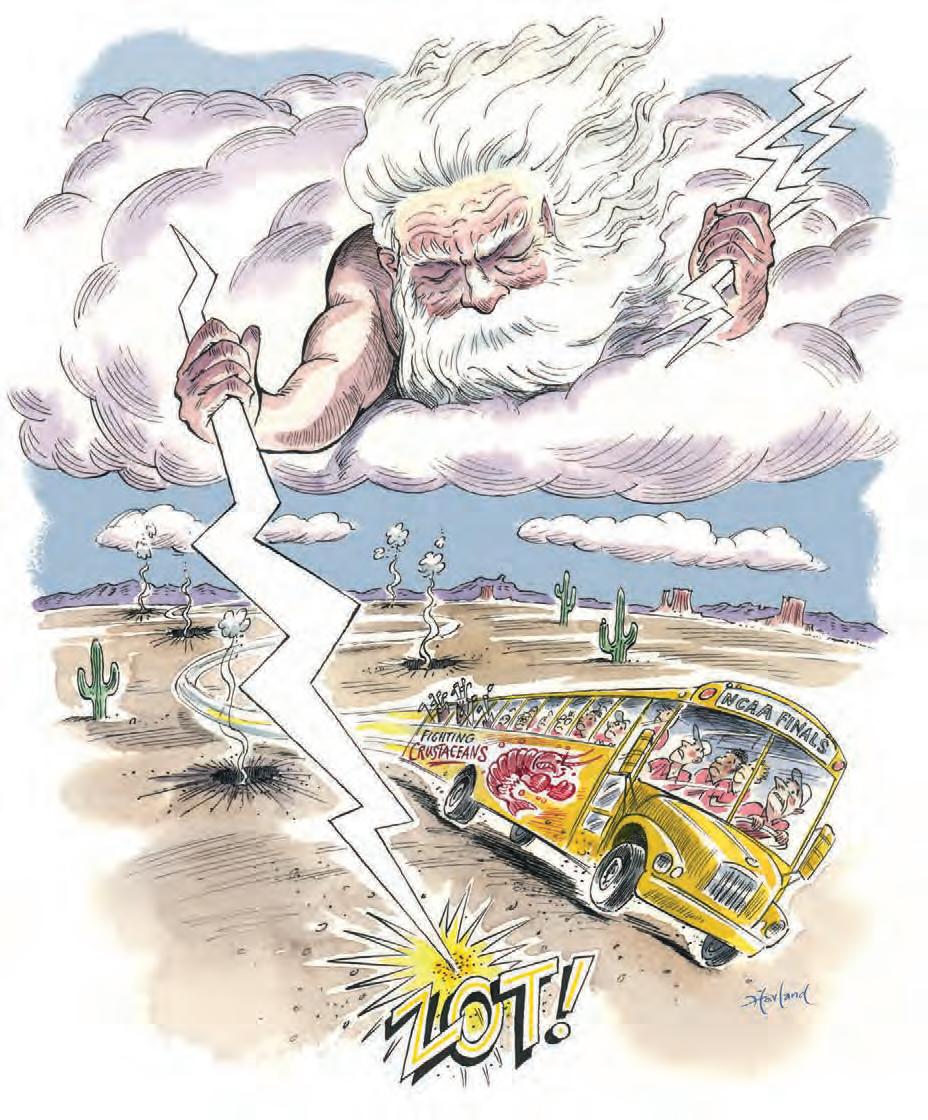
“Hey, Henry,” Moore shouted to Henry Jones, a former junior state champion who came to Troy from Atlanta. “Did you guys putt out on every hole?”

“If someone cheated, Coach, we would have thrown him in the next water hazard,” Jones yelled back with a huge smile that suggested that, yes, that would have happened.
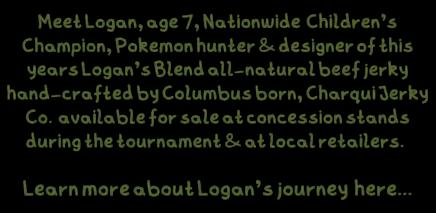
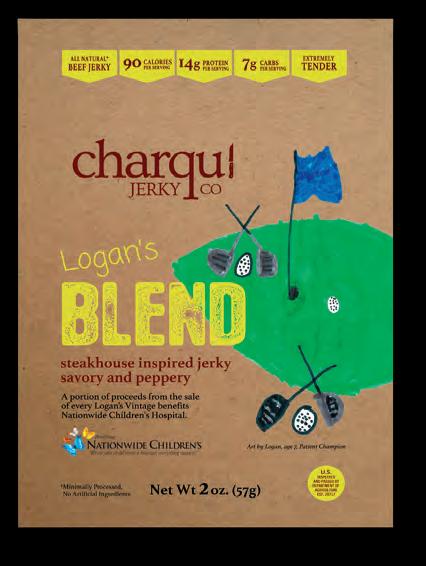
scoreboard read:

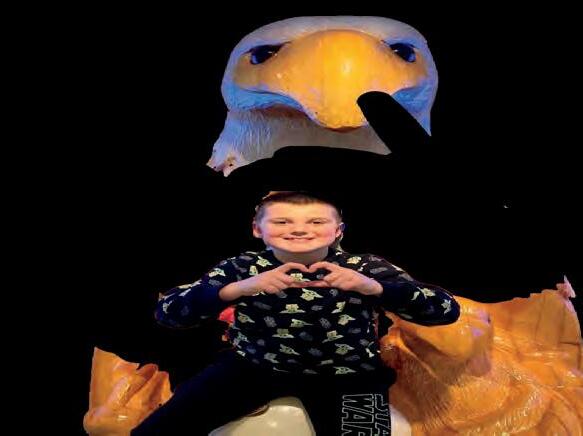

Jones and Ray Dye, an Ohio native, were just freshman. Mitch Compstein, a golf nut from Arizona who was known to practice at all hours, was a senior. Williams, Pearce and Evans all were sophomores. Dave Dombrowski already had earned national honors the previous season, when, as a freshman, he finished third in voting for the Haskins Award. Now it looked like the Pennsylvania product and first-team All-American might be only the third best player on the team. Could this be the group to finally deliver L-Moore his national title? He didn’t want to think about it too much or peer too far into the future. After all, he’d had other great teams, but he
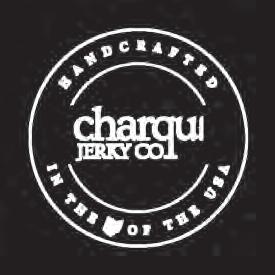

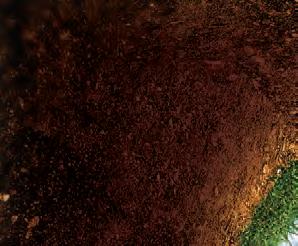




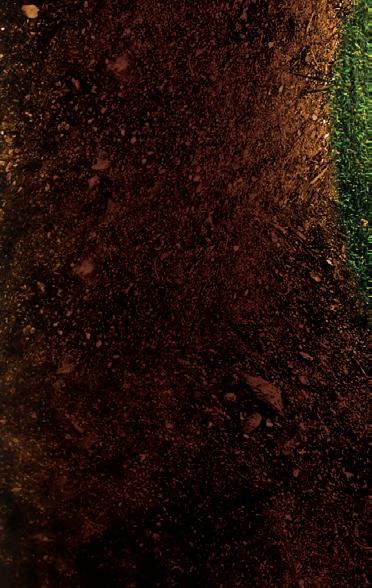







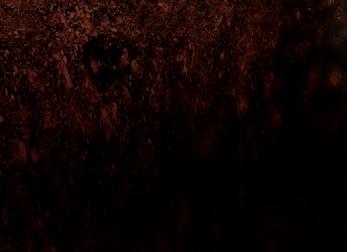
players who was in control of the program, being his first year and all, so he cut him. It did not go over well with the rest of the squad, who looked up to and revered their captain. Peterson handled it with total grace, but before he cleared out, he vowed to win a national title before Moore and mumbled some mysterious words as he passed Moore’s office. He soon left school altogether and became a tour caddie. The Fighting Crustaceans missed the NCAA finals that year by one stroke.
The following year the Crustaceans saw everyone return, and they won three spring events. They looked on their way to a finals appearance, but all of their equipment was stolen on the eve of the regionals. Playing with replacement sets, the Crustaceans missed out on advancing by two strokes. A few days later the clubs were found in a pawn shop. And just a few years after that, the team missed its tee times because of a mistake the coach never has lived down. Moore drove his team to the regional at Oak Hill Golf Club in Rochester, New York, where he had competed in a few tournaments during a brief and undistinguished pro career. They had a ton of talent, and Moore couldn’t wait to get to the course. When they arrived, there were no other buses or vans in the parking lot. And it stayed that way; the sectional tournament was at Oak Hills Golf Club in Columbia, South Carolina.
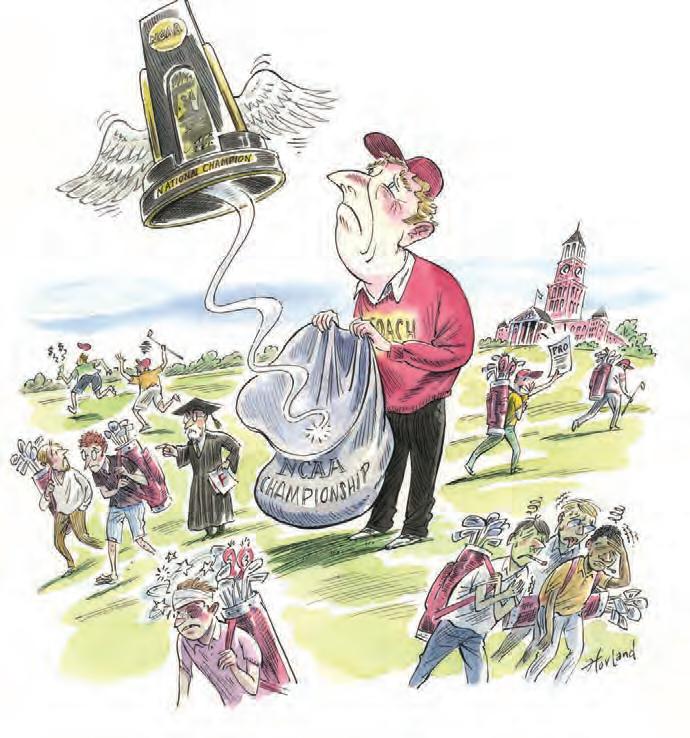







The Community Cup is one-day athletic challenge for Columbus companies. It’s a team-building activity your team will actually enjoy. It’s a chance to play like a kid. Call it whatever you want, we call it FUN.
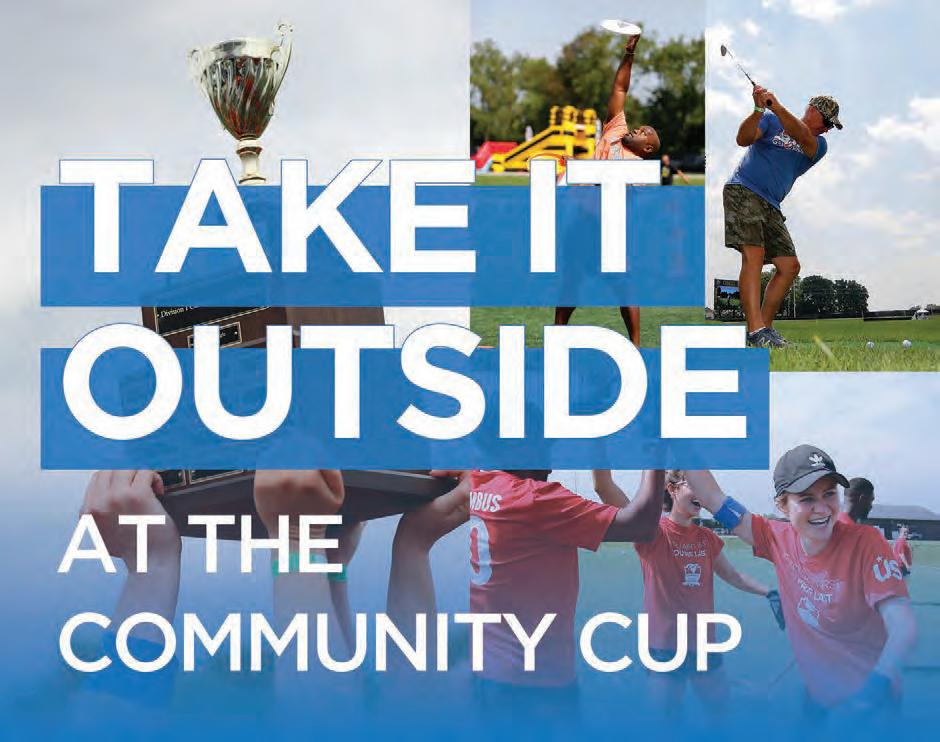
Dodge work and have a field day with your colleagues this summer! Join leading local companies and register a team by June 30.
columbussports.org/cup


Yes, L-Moore couldn’t seem to get a break. And he couldn’t shake the thought that he deserved it, that he had, indeed, angered the golf gods. But how?
It was early March, and the team’s season opener, the Zing Invitational, in Naples, Florida, was just weeks away. The Fighting Crustaceans were to be one of 12 teams at the tournament. They were heavily favored to win it. Heck, they soon became the favorite to win anything they entered. Word had gotten out quickly about the team’s intramural performance. Their odds to win the NCAA Championship in May were +220. Mighty Houston was next at +850. Then came Wake Forest at +950. The defending champion Florida Gators joined Ohio State at +1225.
Three months later, North Texas State, led by some kid who went by the nickname “Tin Cup,” hoisted the trophy in
a massive upset at the Broadmoor Resort in Colorado Springs, Colorado. The Gators were second, while Wake Forest was third and Houston fourth. Surprising Miami of Ohio, on a heater of a run, ended up fifth, a remarkable effort from the lightly regarded Mid-American Conference school. Rounding out the top-10 finishers were, in order, Georgia, Arizona State, Pepperdine, Oklahoma State and BYU.
Where was Georgia Gray? Well, the Fighting Crustaceans never got to the big dance. They actually never got very far after the Zing Invitational, which they won by 33 shots with a lineup of Dombrowski, Compstein, Dye, Jones and Pearce.
“Hey, Marvin, you ain’t fighting fair this year,” said Charlie Norris, the Florida Northern golf coach, who always wanted to be called Chuck because, well, it sounded tough, but he never could get it to catch on. “That might be one of
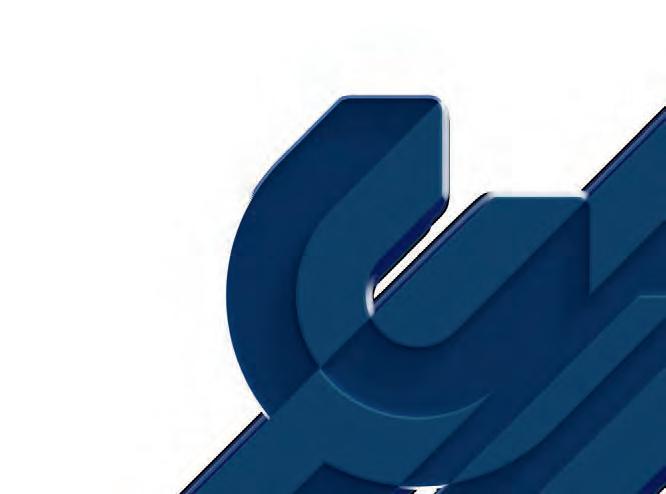
Where was Georgia Gray? Well, the Fighting Crustaceans never got to the big dance. They actually never got very far after the Zing Invitational, which they won by 33 shots …
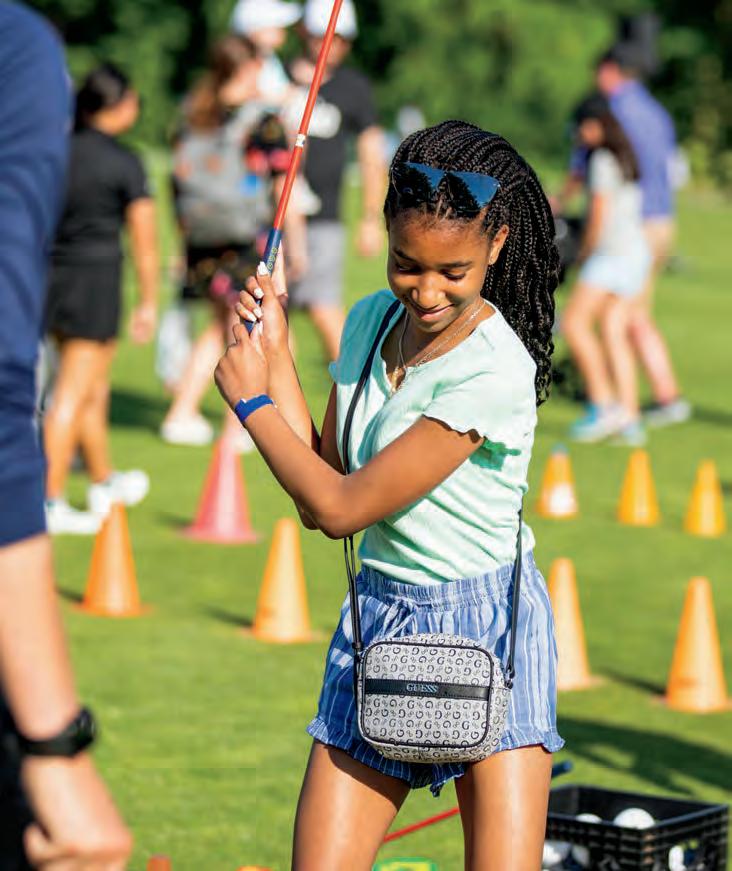
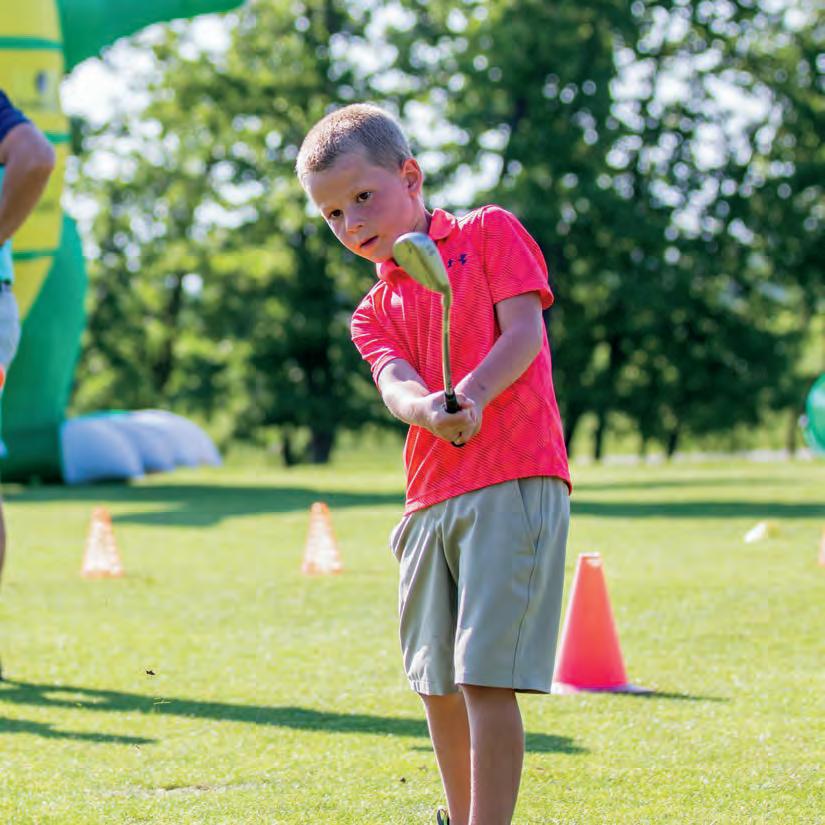
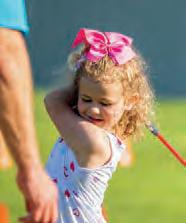
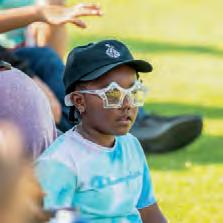
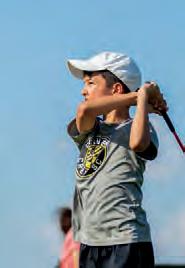
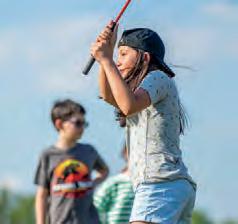
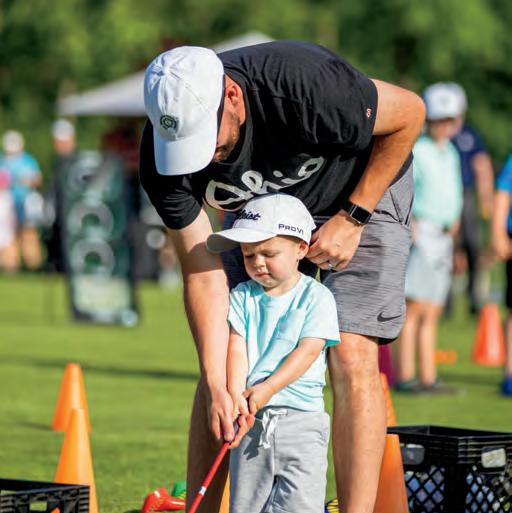
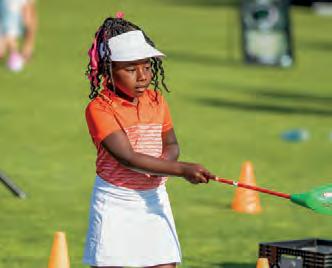
the greatest golf teams ever assembled. How’d you get so dang lucky this time around?”
“Don’t go messing with me, Charlie,” Moore said a bit chippy. “No such thing as a sure thing in golf. That’s the kiss of death if ever there was one.”
The following week, a crack formed in the foundation. Dombrowski was gone. Poof. Just like that. He decided to use his Spring Break to enter the Monday qualifier for the Florida Citrus Open Invitational in Orlando, Florida, and he earned the last spot in the PGA TOUR event with a 67 at Rio Pinar Golf & Country Club. When he shot that same score in Sunday’s final round, he was a winner by one stroke over Ken Stiller and decided to turn professional on the spot, what with status on the TOUR secure.
Though stung by the development, Moore couldn’t have been happier for his player. “Dom, beating all those pros,

dang, that was impressive. I figured you had it in you; I just wish that what I knew you had in you hadn’t come out of you for a while yet,” the coach said when he saw his star golfer. “Don’t suppose I could talk you into delaying your decision a few weeks, could I?”
“I’m sorry coach. Already got a club deal in the works with Spalding, and Lucky Strike called with a pretty sweet offer,” Dombrowski chirped.
“You don’t smoke, Dom,” Moore said.
“Do now. Hasn’t hurt Arnie or Hogan.”
“Yeah, well Nicklaus used to smoke, too, and decided that wasn’t a good look,” Moore countered.

Dombrowski just stared blankly.
That was on a Tuesday. On Wednesday, Chris Karsten was lost for the season. He and Jimmy Harris were locked in a money game—even though gambling was forbidden on
Though stung by the development, Moore couldn’t have been happier for his player.

We believe all kids deserve to feel excited to grow, safe to fail and better equipped for whatever comes at them next. At First Tee – Central Ohio, we do this by helping them develop their swing, but more importantly, their inner strength; with coaches who help them navigate the course as well as guide them through new challenges.
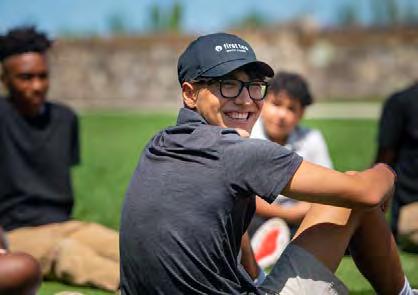

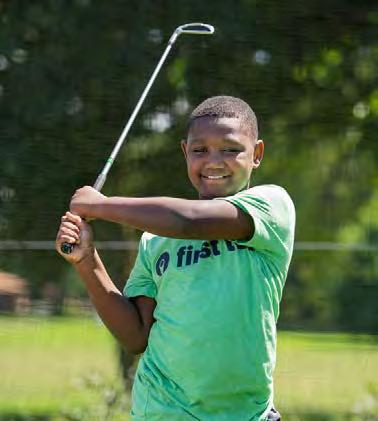
Because we know what’s inside doesn’t just count; it changes the game. Get involved at tftco.org or scan the QR code.
Special thanks to our friends at the Memorial Tournament presented by Workday and
the men’s and women’s golf teams as well as, generally, at Sherman Falls. They had tied after 18 holes with matching 68s and then they set off on a series of call-your-shot tiebreakers for what was to them an all-important $20 prize. They bounced chip shots off the caddie hut onto the practice putting green. They played the par-4 first hole with a putter, which they halved in 11 shots after they bumped their balls around the pond fronting the green. Harris then got the bright idea of playing the 10th hole while starting with tee shots from the clubhouse balcony. Unfortunately, Karsten thinned his off the wood planks, and the ball caromed off the metal balcony railing and hit him square between the eyes. It took a year for his double vision to clear up.
“Odd Double Sidelines Karsten,” was the headline in the local paper as Moore came under heavy criticism for failing to monitor his players more closely.
Moore wasn’t too concerned. Karsten was a fine player, but he was going to struggle to get into events with the talent populating the Crustaceans’ roster. “Here’s an idea,” he told one of his assistant coaches, quoting a TV character. “What if we don’t worry about whatever comes next?”
What came next was that Compstein was expelled from school, and Moore started to feel that pang of worry.
One semester shy of graduating with a bachelor’s degree in philosophy, Compstein had but one goal, and that was to reach the NCAAs. His focus had become ever sharper after
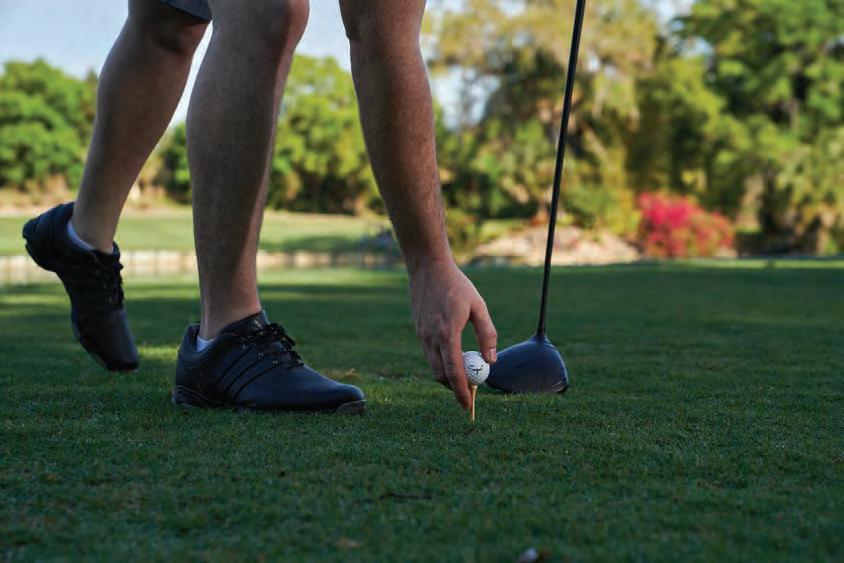
“Here’s an idea,”
he told one of his assistant coaches, quoting a TV character.
“What if we don’t worry about whatever comes next?”
THE MEMORIAL TOURNAMENT PRESENTED BY WORKDAY
supports
his roommate, the aforementioned Webb, dropped out to help run his father’s lumber business. It was never established why Webb wasn’t on the golf team. Moore begged the kid to join the Crustaceans. Webb repeatedly replied that he didn’t like playing golf against other people.

With no distractions whatsoever, Compstein worked even harder on his game throughout the winter. Which is what got him in trouble. He was hitting balls all day, hitting the books lightly in the evening, and then usually putting at night. A friend and member of the Lady Crustaceans golf team, Abby Jenkins, asked to join him one Friday night. They putted for a few hours, hugged after they finished up, and said their “good-nights.” Next thing he knew, Compstein was kicked out of Georgia Gray. Turns out, Jenkins was the Dean’s daughter.
L-Moore still had his two big freshman guns, plus Charles Evans—yep, named after the famed amateur golfer—and how can you ever go wrong with a guy on your golf team named Charles Evans? Jack Williams, Glenn Pearce and Stuart Price all were capable of shooting 65 on any given day. Harris was suspended after the balcony incident, not for the idea, mind you, but because he made a scene at the hospital by demanding his $20 from Karsten, who, Harris reasoned, obviously lost their bet because he was unable to finish the hole. Karsten’s semi-conscious condition was no excuse to not pay up. Hearing about this the next day, Moore had no choice but to suspend Harris for three weeks. Conduct unbecoming, he said. But if he needed another body, he could simply lift the penalty.
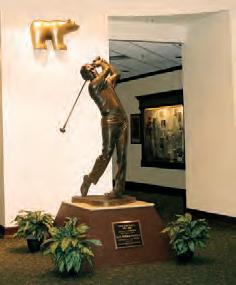
That plan imploded when Karsten, once he came to and recovered his wits, noticed his wallet was light $20 and surmised that Harris had simply helped himself. Then he found out about Harris’ uncaring rant as he lay on an emergency room gurney. So, he took a 9-iron out of his bag in the athletes’ dorm and introduced it to Harris’ right shin. It wasn’t a full swing, but witnesses said he held the finish nicely and left a healthy divot. And bone fragments.
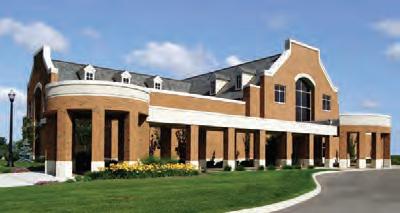
Moore took a lineup of Dye, Jones, Williams, Pearce and Price to the next tournament, the Las Vegas Intercollegiate. The Crustaceans won by 12. Jones shot 60 in the second round, missing putts inside 10 feet on each of the last two holes which could have given him 59. Or 58.
The coach just shrugged when he was asked about the losses his team sustained and how he and his players were keeping it together.
“Low scores are pretty good glue,” he responded.

Low grade point averages were not, however. After returning from Vegas, Moore found out that Jones and Dye were ineligible. Their manic practice regimens obviously paid off on the golf course but didn’t jibe with attending any classes. Moore was apoplectic. Also furious. The university had hired a compliance officer, and he had brought on an extra assistant to look after the younger players to make sure they were keeping up with their grades. The smooth-talking Dirk Stratton, a former law and med school student with a sweet golf swing—he once won a bet by hitting a horse’s hind end with a drive from 250 yards out—got the job after going out and shooting 67 at Sherman Falls and telling Moore he never thought of golf as work. It was too late when Moore discovered that Stratton never thought of work at all.
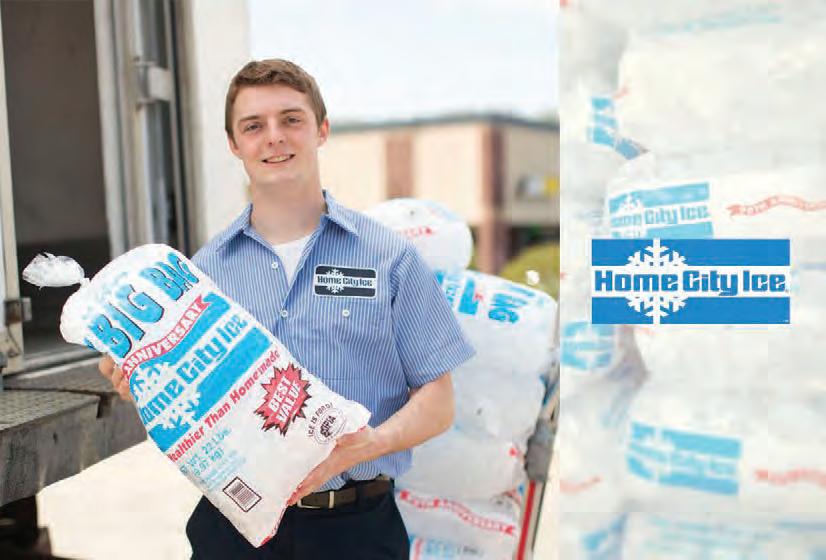
That left Evans, Williams, Price and Pearce. The Crustaceans needed a fifth man. Moore held a tryout, hoping to find a student at Georgia Gray who could at least shoot something below 80. Twelve players showed up for the one-day meet, and Moore got pretty much what he expected. Some guys were just there for a free round of golf. They rolled in with
Moore was crestfallen. Then Joe Anthony, Jr., the son of a former professional, stepped forward and said that his score had been recorded incorrectly on the big board. He had actually shot 70 with four birdies and two bogeys. Where had he been? Moore asked why he wasn’t playing collegiate golf. The kid said he was studying pre-med. No time for four or five
hours on the golf course. But he figured he’d see what kind of game he still had, even though he hadn’t played very much since school started in the fall.
“Talented and smart,” Moore mused. “That’s a combination I’ll take every time.”
The Crustaceans were back in business. Moore could only think that maybe he’d seen every bad break possible and survived them, that maybe there was still a chance. In the following days, Moore’s spirits were buoyed further. The remaining guys looked good in practice. After a few days of work on the range, Anthony shot 68 at Sherman Falls, his game rounding into form. Things were finally looking up for the hard-luck coach. Granted, he didn’t have the firepower of a few weeks before,
but finding Anthony made him think the curse had been lifted. He knew how funny golf could be. Maybe this remaining group could catch lightning in a bottle.
Instead, they caught the chicken pox. All of them. The Crustaceans withdrew from the first round of the NCAAs the next day. And the day after that, Moore announced his retirement. “I loved every minute of it,” he told reporters. “Except for the part of all that losing.”
The next year, Georgia Gray won the national title. The Crustaceans put it all together, spurred on by their new coach, Chunk Peterson. MT
David Shedloski is editorial director of The Memorial.Rumpke is bringing a state-of-the-art recycling facility to Columbus that will be unlike any other. The $90 Million private investment will feature a 223,000 square-foot resource center, green, sustainable design elements such as solar panels and a living green roof, and will be complete in 2024. The facility will advance recycling capabilities in the region, while enhancing education endeavors and neighborhood relations.

Instead, they caught the chicken pox. All of them.
The Crustaceans withdrew from the first round of the NCAAs the next day.


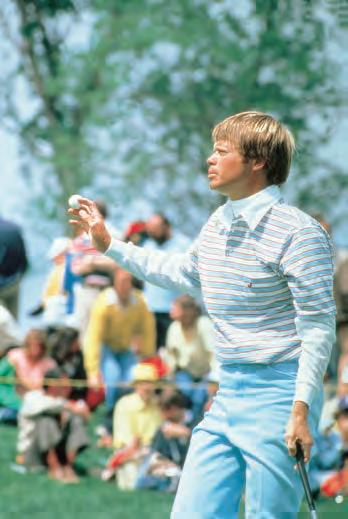
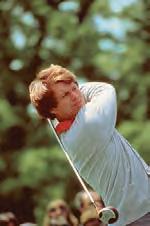
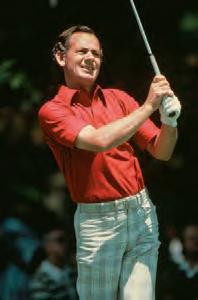
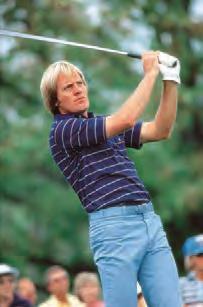
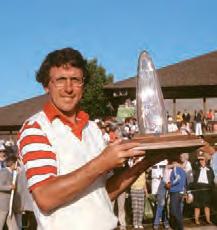
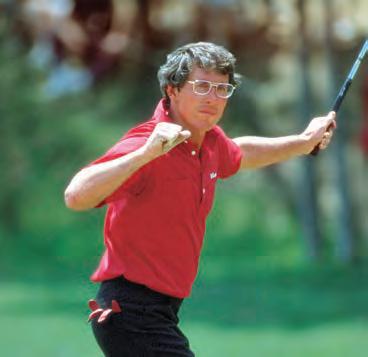
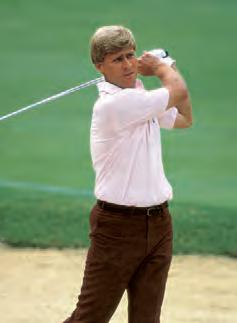
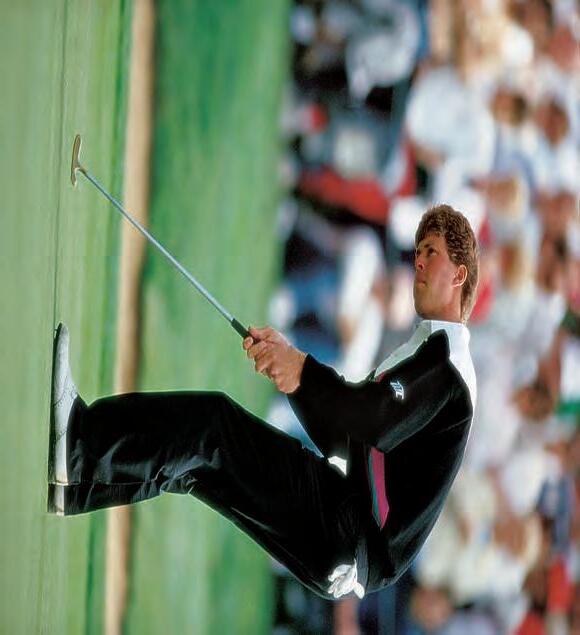
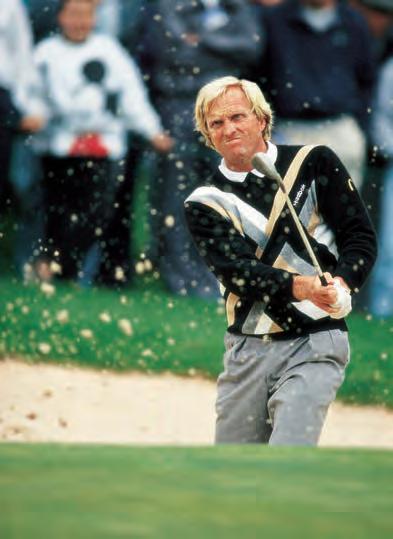
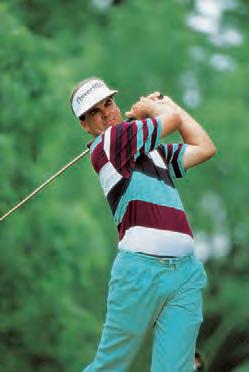

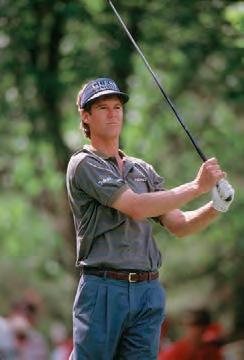
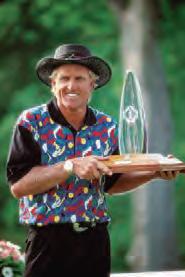
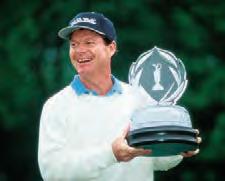
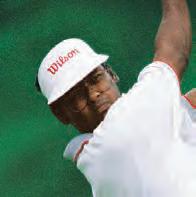
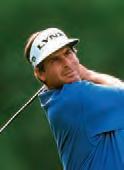

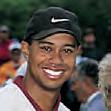
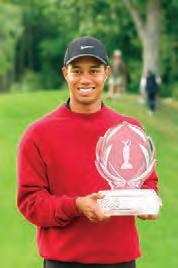


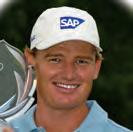














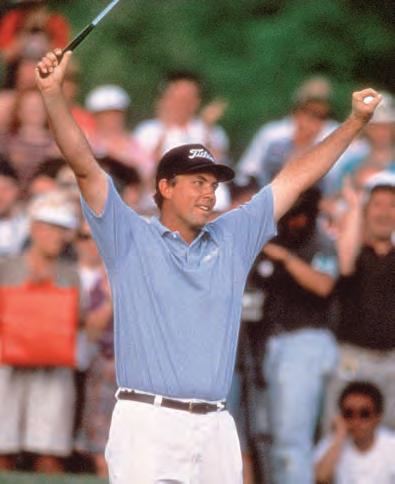






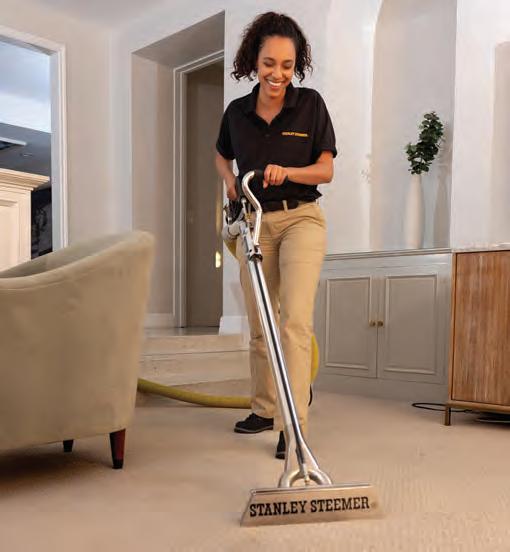
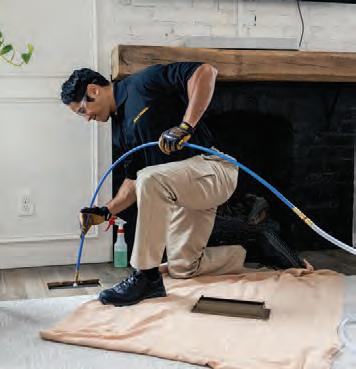
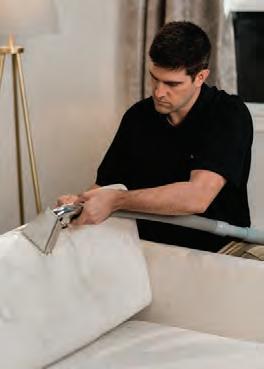

Please don’t leave me, not this time, We haven’t even finished nine, Every swing has been in sync, Not one duff, not one dink.

Just this once, I’m in command, As if this day might be so grand. So please don’t leave, not this time, Not when life is so sublime.
Yes, I know, it’s in your nature, To up and leave me for greener pastures, To make me swear and search and fret, To make me feel we never met.
Thus, you keep us all engaged, Filled with joy, flush with rage, Never quite what we expect, Here one moment, not the next.
And just like that, when you have gone, The grip, the stance … it all seems wrong. We’re left to go it on our own, Cards in tatters, seeds unsown.
Of course, there comes a future date, A dollar short, a day too late, When once again, it all makes sense, When thoughts of grandeur recommence.
But now I’ve almost finished nine, And hoping you could be so kind. To let me keep this lovely swing, Until I get through all eighteen.
— Dan O’NeillPurchase or Donate “Eliza” to a Child at Nationwide Children’s Hospital
$15

Each bear sold supports the Memorial Tournament Neonatal Intensive Care Unit and local programs that align with the missions of Nationwide Children’s and the Eat. Learn. Play. Foundation through an alliance with the Nicklaus Children’s Health Care Foundation.


How do you keep up when the world of business is changing faster than ever? Workday’s flexible architecture, with AI and ML at the core, gives you the ability to make better decisions and shift your business on the fly.
Businesses that adapt fast will lead the future of work, while the others fall behind. Workday. The finance and HR system for a changing world.
